Heads Up!
Workbook
Maggie Ben Zion
Eric Cohen Books Ltd.
2016
עמודי דפוס 4-187
העתיקה: טרי מראלי
הספריה המרכזית לעיוורים
נתניה ישראל 2016
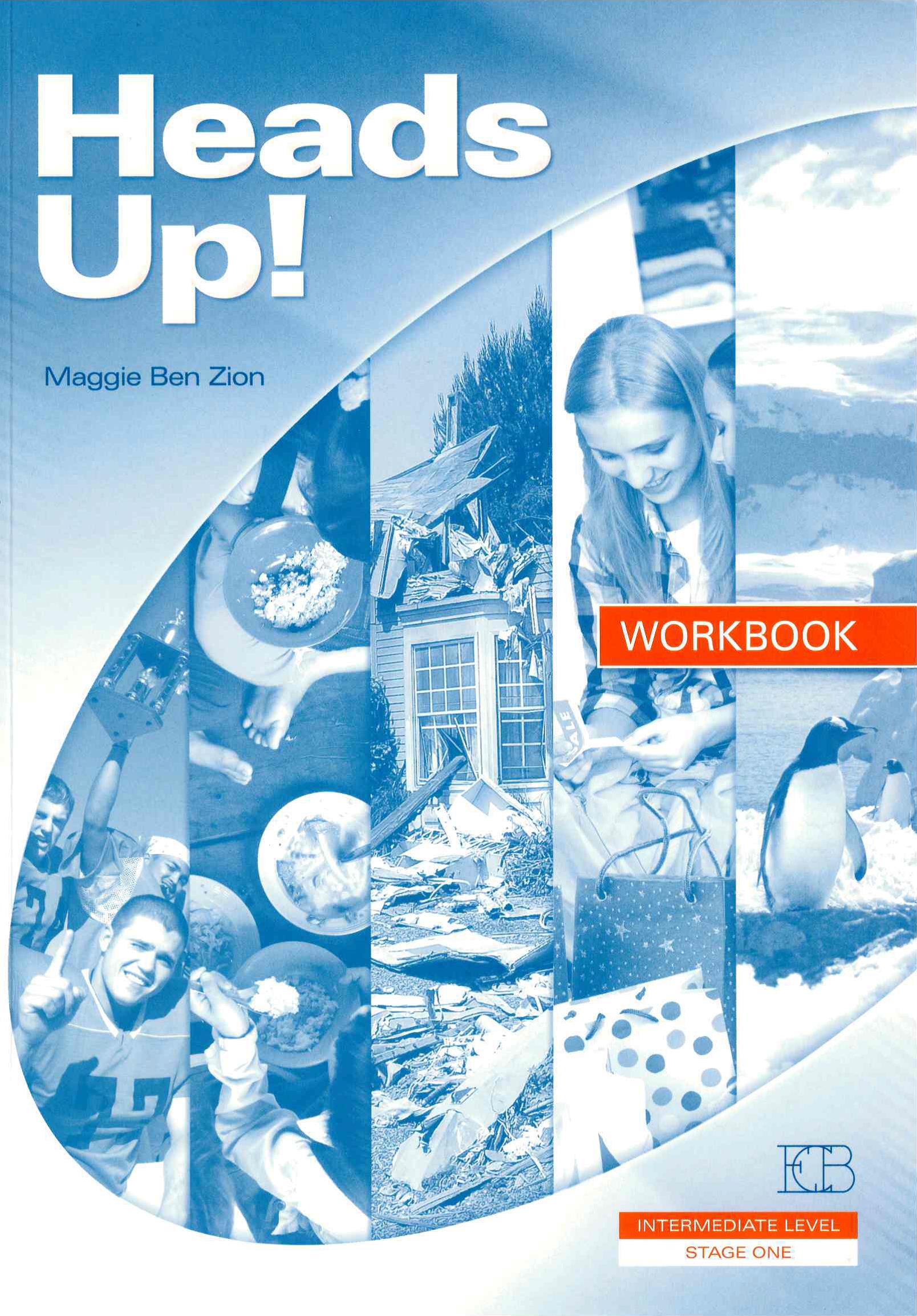
(תמונות, בכל אחת מהן מישהו חושב על משהו על פי המצב בתמונה)
העתקה או העברה של העותק המותאם בניגוד להוראות חוק התאמת יצירות, ביצועים ושידורים לאנשים עם מוגבלות התשע"ד - 2014, מהווה הפרה של זכות יוצרים.
(על גב הספר כתוב):
Heads Up! is an engaging coursebook for ninth grade bet level classes.
Heads Up! contains all the requirements for the revised curriculum.
Table of contents
*4*
*4*
Part 1 - Go Team, Go!
Reading - Student’s book page 8, exercise a.
New words
a. Write the words in English next to their meanings. If you do this correctly, the words will be in alphabetical order.
כיתבו את המילים שלמטה ליד הפירוש שלהן. אם תעשו זאת נכון, המילים יופיעו לפי סדר האלפבית.
1. לקבל - accept
2. בסופו של דבר --
3. מדהים --
4. לנצח, לגבור על --
5. אלוף --
6. הזדמנות --
7. מאמן --
8. להתחרות --
9. תחרות --
10. תחרות --
11. אפילו אם --
12. להיכנע --
13. אדם שמפסיד בכבוד --
14. לא אכפת לי --
15. לשפר --
16. בכושר טוב --
17. לתת ל-, לאפשר ל- --
*5*
stick to (the rules) / take it badly / set a record / mean a lot to me / lose (a game) / practice (v) / score (n) / proud of / rule (n) / whole / object / together / realize / promise (v) / win (v)
18. להפסיד (משחק) - lose a game
19. חשוב לי --
20. דבר, חפץ --
21. לתרגל, להתאמן --
22. להבטיח --
23. גאה (ב-) --
24. להבין --
25. חוק, כלל --
26. תוצאה, ניקוד --
27. לקבוע שיא --
28. להיצמד ל(כללים), לשמור על (החוק) --
29. לקחת את זה קשה --
30. יחד --
31. כל --
32. לנצח --
b. Find at least two words in exercise a. that are connected to competing, working together or both, and complete the lists.
מיצאו לפחות שתי מילים בתרגיל a שקשורות לתחרות, עבודה ביחד או לשתיהן והשלימו את הרשימות להלן.
Competing: competitive, --
Working together: --
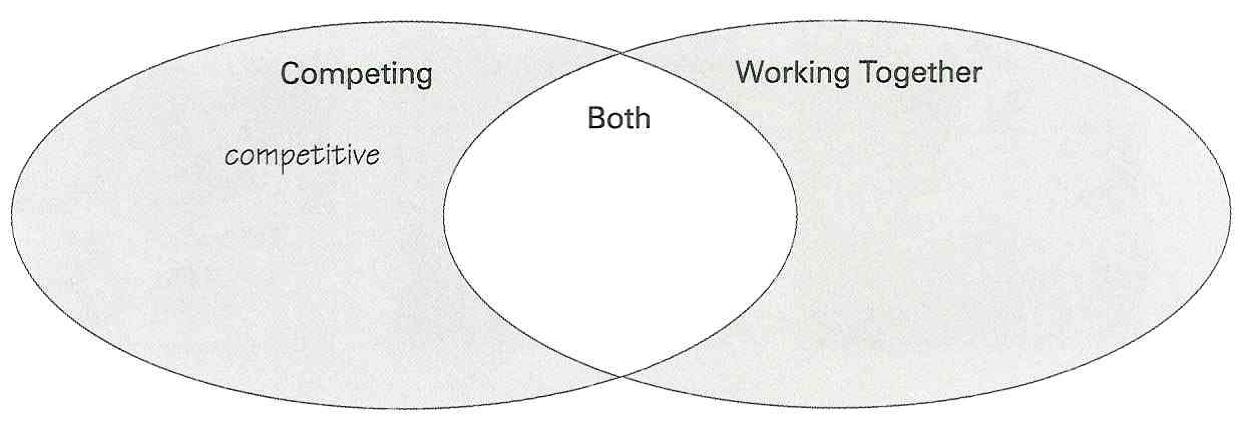
(תמונות, בכל אחת מהן מישהו חושב על משהו על פי המצב בתמונה)
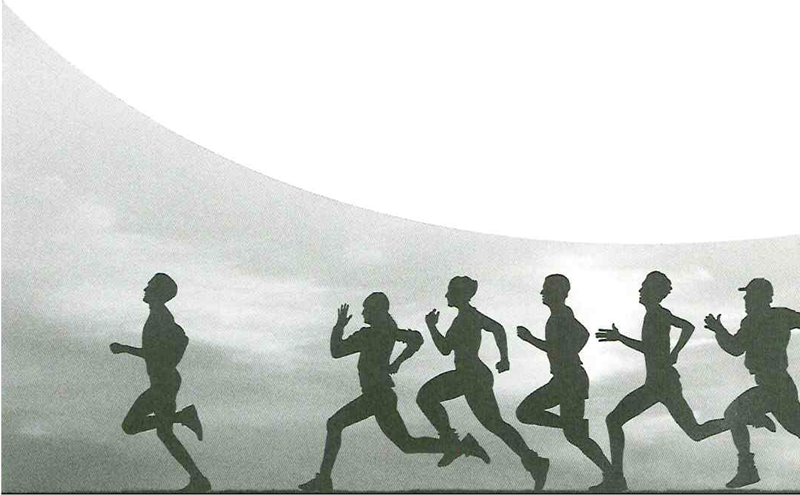
(תמונות, בכל אחת מהן מישהו חושב על משהו על פי המצב בתמונה)
*6*
Words, words, words
התאימו כל משפט לתמונה. שימו לב למילים שבסוגריים.
א. ילד נכנס לכיתה כשהתלמידים כבר יושבים והמורה מסביר משהו על הלוח, ושעון הקיר מראה שעה 9:00.
ב. גבר מדבר עם אישה כששני אנשים משחקים פינג פונג.
ג. תוצאות 72 למארחים ו-64 לאורחים, בקהל אחד מצלצל וכולם צועקים.
ד. בחורה במיטה ועל השידה שעון המראה על שבת שעה 14:00.
ה. בחור צעיר מציע מקום לגברת מבוגרת באוטובוס.
ו. אישה אוספת כלים מעל השולחן ומחייכת.
-- 1. “Table tennis is a very (competitive) sport."
-- 2. “I'll be late for class, (even if) I hurry."
-- 3. “Please sit down! I'm happy to (give up) my seat."
-- 4. “I (don't mind) helping out at home."
-- 5. “The (score) is 72 to 64!"
-- 6. “ I can sleep as long as I want. (After all), it's the weekend!"
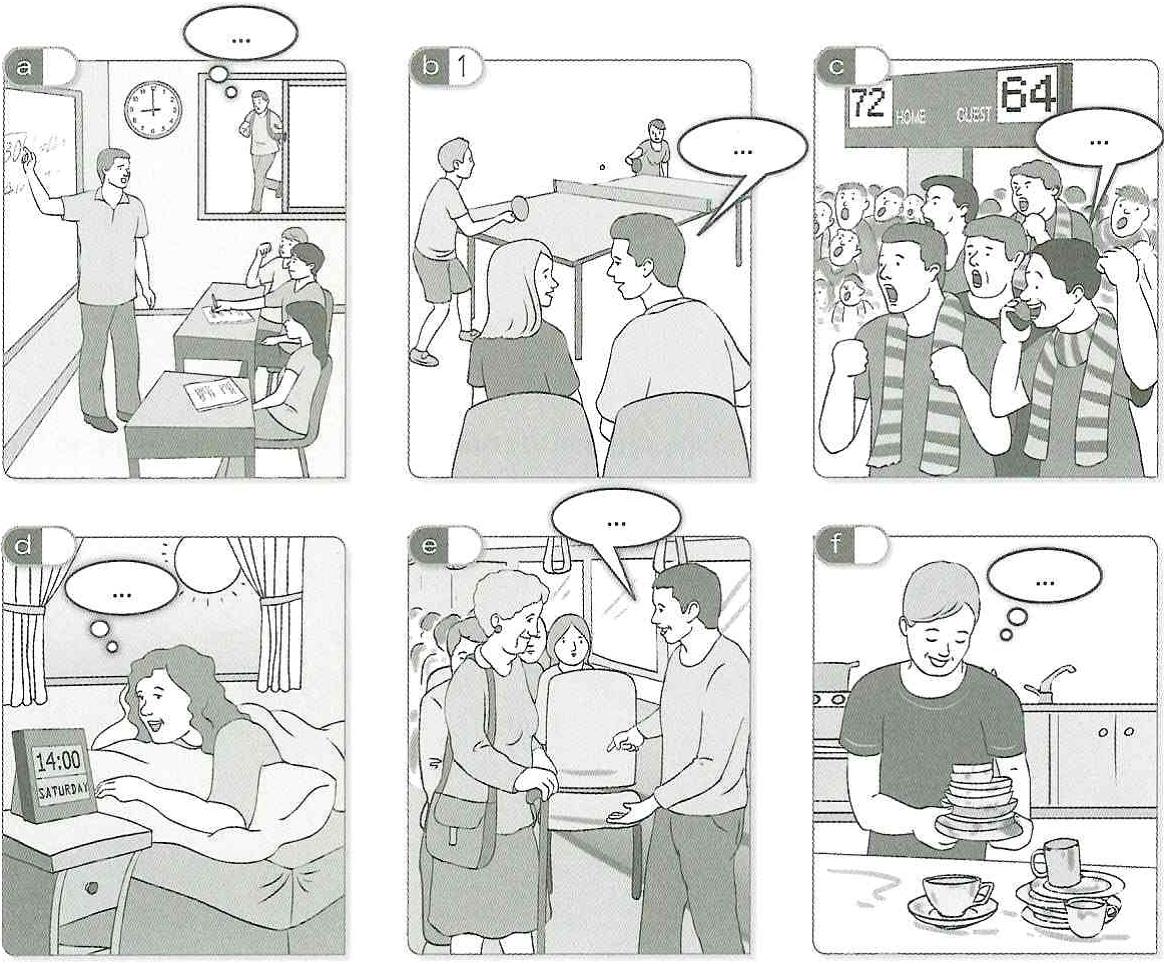
b. Circle the correct answer.
הקיפו את התשובה הנכונה.
ex. 1. My brother (promised) / improved to get us tickets to a rock concert for my birthday.
2. We didn't lose / win the game, but we tried hard.
3. They're going to compete / practice in the 100-meter race.
4. My mom and dad let / beat me go to the football camp.
5. Practice harder and you will have a better rule / chance of winning.
6. I must go home. Do you accept / realize how late it is?
*7*
c. Circle the answer with the same meaning as the word in brackets.
הקיפו את התשובה שיש לה אותו פירוש כמו למילה שבסוגריים.
ex. 1. Shira (accepted) the present with a big smile.
a. gave, (b) took, c. wanted
2. Look - there is a strange (object) in the sky!
a. rule, b. reason, c. thing
3. The World Cup is a world football sports (competition.(
a. festival, b. contest, c. show
4. I (realized) someone was home because the lights were on.
a. heard, b. asked, c. understood
5. The movie about the Olympics was (amazing).
а. wonderful, b. terrible, c. boring
d. 1. Complete the sentences with the words below. There are two words you don't need.
השלימו את המשפטים עם המילים שלמטה. ישנן שתי מילים מיותרות.
let / competitive / champion / score / accept / mean a lot to me / won / whole / I don't mind / coach / improve
ex. 1. My team (won) the game by two points. The -- was 62:60.
2. Sally is very --. She always wants to win.
3. The -- class came to my surprise party. Everyone was there!
4. Marc Hinawi is a --. He has won many competitions.
5. Avram Grant is a famous football --.
6. Thank you for the invitation. I --.
7. Your French will -- if you practice speaking.
8. We can go to the beach or the park. --. I like both places.
d. 2. Complete the sentences with the words below.
השלימו את המשפטים עם המילים שלמטה.
ex. 1. Garbine Muguruza was the youngest tennis player to compete in the finals at Wimbledon. She (set a record).
2. The team -- when they lost the game.
3. My brother runs every day. He is --.
4. When you play a game, it's always important to --.
*8*
e. 1. Complete the blog entry with the words below. There are two words you don’t need.
השלימו את הפוסט בבלוג עם המילים שלמטה. ישנן שתי מילים מיותרות.
promise / chance / together / amazing / competitions / practiced / mean a lot to me / object
Ronny’s Blog
Hey Guys!
I just saw an (amazing) video with Chloe Bruce. Chloe is a martial artist. (אמנית לחימה)
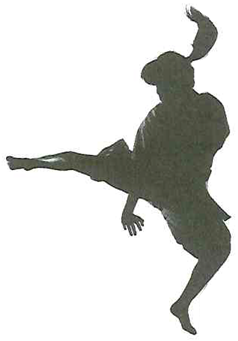
Chloe is even in the Guinness Book of Records. In 2010, she set a record for the most kicks in one minute - 212!
Chloe uses her skills as a martial artist. Today, she works in movies as a stunt artist (אומנית פעלולים).
She gets the -- to work with famous actors like Brad Pitt and Zoe Saldana. And ... that's not all! Chloe has a martial arts school. She teaches there -- with her sister Grace. Have a look at her stunts on YouTube.
I -- you, you won't be bored!
e. 2. Write two questions you would like to ask Chloe Bruce.
כיתבו שתי שאלות שהייתם רוצים לשאול את קלואי ברוס.
ex. 1. When did you start taking lessons?
2. --?
3. --?
f. Answer the questions about yourself. Pay attention to the words in brackets. Write complete sentences.
ענו על השאלות על עצמכם. שימו לב למילים שבסוגריים. כיתבו משפטים שלמים.
ex. 1. What did you (give up) when school started in September? --.
I gave up sleeping till 11 o'clock in the morning.
2. What things are you (proud of?( --.
3. What do you and your friends usually do when you are (together)? --.
4. Which sport would you like to have the (chance) to play? --.
5. Do you usually (let) your brothers or sisters use your things? Explain why or why not. --.
6. Are you a (good sport)? Explain why or why not. --.
*9*
Part 2 - What do you think?

New words
Write the words below next to their meaning. If you do this correctly, the words will be in alphabetical order.
כיתבו את המילים שלמטה ליד הפירוש שלהן. אם תעשו זאת נכון, המילים יופיעו לפי סדר האלפבית.
especially / all the time / do my best / city / make a team / interested / hate (v) / get angry / develop
1. כל הזמן - all the time
2. עיר --
3. להתפתח --
4. אעשה את המקסימום, אעשה את מירב המאמצים --
5. במיוחד --
6. להתרגז --
7. לשנוא --
8. מתעניין, מעוניין --
9. להתקבל לקבוצה --
what's worse / train (v) / prefer / the rest / team / reason / sound (v) / relax (v) / no problem
10. אין בעיה, בשמחה - no problem
11. להעדיף --
12. סיבה --
13. להירגע --
14. להישמע --
15. קבוצה, צוות --
16. השאר --
17. להתאמן --
18. מה שיותר גרוע, גרוע מכך --
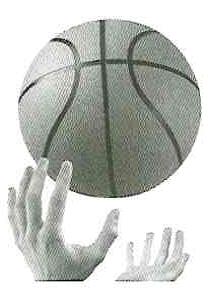
תארו לעצמכם שאתם מספרים להורים שלכם מדוע אתם רוצים להיות בקבוצת כדורסל. בחרו לפחות שלוש מילים או ביטויים מתרגיל a בהם אתם יכולים להשתמש.
1. --
2. --
3. --
4. --
5. --
*10*
Student’s book, page 15, exercise c.
Read the questions below. Then listen to the radio program and answer the questions.
1. What does Tom Winters talk about on the program? --
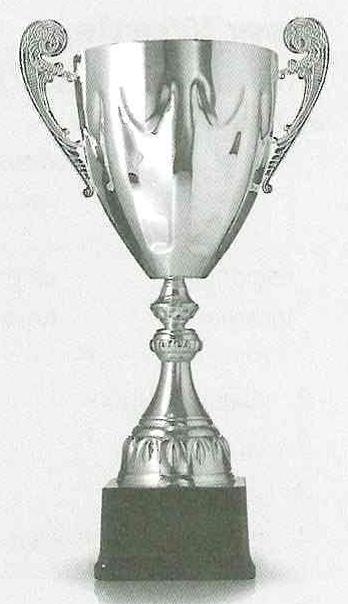
b. when people compete.
c. why people should call the program.
2. How does Amy feel when she loses a competition? --.
a. She gets upset with her team.
b. She gets angry and trains even more.
c. She is upset and stops playing.
3. Alex -- in all the basketball games.
a. plays
b. doesn't want to play
c. doesn't play
4. Alex -- his coach.
a. agrees with
b. doesn't agree with
c. respects
5. Complete the sentence.
Alex thinks -- should play at a basketball game.
6. How did Dave feel after the City School Competition? --
a. proud
b. excited
c. sad
7. What reason does Dave give for playing sports? --
a. He is very competitive.
b. He relaxes and has fun with his friends.
c. It is good for his health.
Student’s book, page 15, exercise d.1.
Listen to the radio program and write the names of the teens who called in and the sport that each one plays. Complete the chart.
ex. Teen / Sport
Amy / swimming
-- / --

*11*
Words, words, words
After student’s book, page 16
a. 1. Circle the word that does NOT belong in each group.
הקיפו את המילה יוצאת הדופן בכל קבוצה.
ex. 1. (reason) / champion / good sport
2. coach / team / city
3. sound / get upset / get angry
4. train / prefer / practice
5. develop / relax / make
a. 2. Write sentences with the words you circled in exercise a. 1.
כיתבו משפטים עם המילים שהקפתם בתרגיל a.1. למעלה.
ex. 1. I can't think of a good reason why I am late.
2. --.
3. --.
4. --.
5. --.
b. Circle the correct answer.
הקיפו את התשובה הנכונה.
ex. 1. The football players -- every day.
a. accept, (b) train
2. I just spoke to Sara. It -- like she's enjoying her vacation.
a. prefers, b. sounds
3. My mom and I went to the beach. -- of the family stayed home.
a. All, b. The rest
4. I don't know the -- why they are late.
a. reason, b. rule
5. Michael Phelps is the greatest Olympic swimming --.
a. score, b. champion
6. A good way to -- is to go to the beach.
a. relax, b. hate
7. Do you like living in a big -- like London?
a. city, b. team
8. Amir is -- in science. He wants to study biology.
a. competitive, b. interested
*12*
c. Complete the sentences with the words below.
השלימו את המשפטים עם המילים שלמטה.
angry / interested / sounds / cities / relax / reason / what's worse / hate
ex. 1. Do you know the (reason) why Tali didn't come to school today?
2. I -- rats. I'm scared of them.
3. My brother gets -- with me every time I take his cellphone. I don't understand why it is a problem.
4. Yoav is -- in astrology. He likes to study the stars.
5. I can listen to Rihanna's album again and again. It -- great!
6. Beijing is one of the biggest -- in the world.
7. When I want to --, I lie on my bed and listen to music.
8. I have a test today. --, I study till 4 p.m.
d. 1. Complete Shira's email to Maya with the words below. There are three words you don't need.
השלימו את האימייל של שירה למאיה עם המילים שלמטה. ישנן שלוש מילים מיותרות.
do my best / what's worse / relax / win / all the time / proud of / angry / whole / coach / interested / especially
Hi Maya,
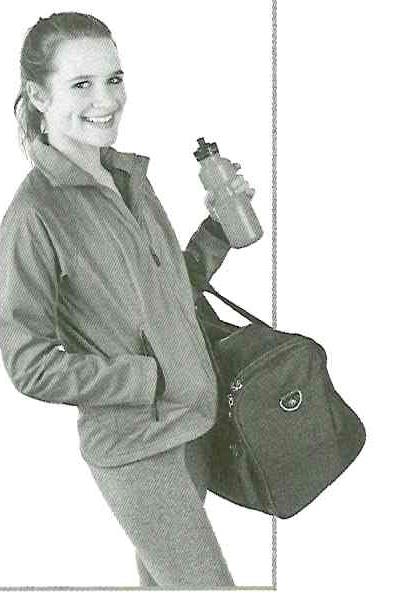
I always try to --. It's important for me, -- because I want to become
f a top gymnast.
What's happening with you? How was your volleyball game?
Did your team --?
How are the kids on your team? Do you have time to -- between games?
I must go, because I have to finish my homework and, --, have to study for a science quiz tomorrow!
Hope to hear from you soon,
Shira
*13*
2. Maya sent Shira an email about what she is doing and about her volleyball team. Write Maya's email, using at least four of the words below.
מאיה שלחה אימייל לשירה על מה שהיא עושה ועל קבוצת הכדורעף שלה. כיתבו את האימייל של מאיה. השתמשו לפחות בארבע מהמילים שלמטה.
interested / all the time / relax / train / make the team / no problem / do my best / reason / prefer
From: Maya
To: Shira
I'm really busy. I train every day. --.
See you,
Maya
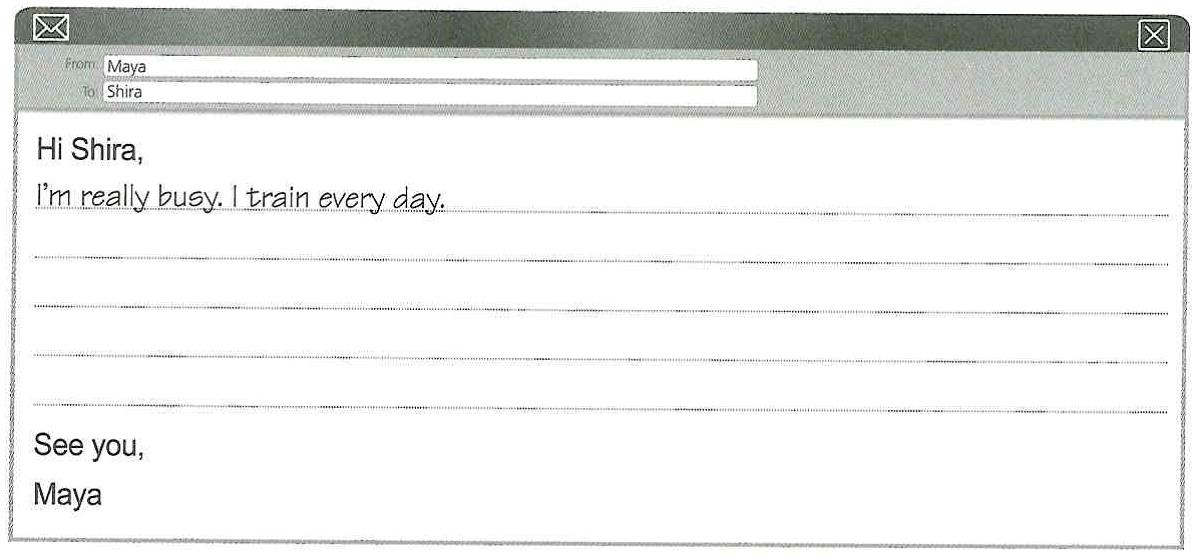
e. Expressions with time
e. 1. Complete each sentence with a suitable expression below.
השלימו כל משפט עם ביטוי מתאים מלמטה.
on time / have a great time / spend... time / at the same time / all the time
ex. 1. Lots of kids (spend too much time) online.
2. We see movies at the mall --.
3. The train leaves at 6 o'clock. Please be --.
4. “ -- at the festival." "Thanks!"
5. It's hard to do too many things --.
e. 2. Answer the questions. Pay attention to the words in brackets. Write complete sentences.
ענו על השאלות. שימו לב למילים שבסוגריים. כיתבו משפטים שלמים.
ex. 1. When do you try to be (on time)? I try to be on time when I have a test.
2. Where do you (have a great time)? --.
3. Do the students at your school finish (at the same time) every day? --.
4. How do you (spend your time) in the evenings? --.
5. What clothes do you like to wear (all the time)? --.
*14*
Part 3 - For the Good of All
Reading
New words
a. Write the words below next to their meaning. If you do this correctly, the words will be in alphabetical order.
כיתבו את המילים שלמטה ליד הפירוש שלהן. אם תעשו זאת נכון, המילים יופיעו לפי סדר האלפבית.
cooperation / community / fortunately / appear / goal / in fact / belong to / independent / not only / combine / join (v) / culture / boarding school / individual (n)
1. להופיע - appear
2. להות שייך ל- --
2. פנימייה --
4. לצרף, לשלב --
5. קהילה --
6. שיתוף פעולה --
7. תרבות --
8. למרבה המזל --
9. מטרה --
10. למעשה, בעצם --
11. עצמאי --
12. פרט, יחיד --
13. להצטרף --
14. לא רק --
worth it / share (v) / tradition / success / race (n) / volunteer (v) / succeed / reach / set your mind (to) / rather than / tribe
15. מירוץ - race
16. יותר מאשר, במקום --
17. להגיע ל- --
18. תחליט ש- --
19. לשתף, לחלוק --
20. להצליח --
21. הצלחה --
22. מסורת, מנהג --
23. שבט --
24. להתנדב --
25. שווה --
*15*
b. Find at least 2 words in exercise a. that are connected to:
מיצאו לפחות שתי מילים או שני ביטויים מתרגיל a שיש להם קשר ל:
1. helping people: cooperation, --
2. school: --.
Words, words, words - After student's book, page 20.
a. Complete the puzzle with the words below. Use the clues to help you.
השלימו את התשבץ עם המילים שלמטה. היעזרו ברמזים.
whole / combine / success / share / reach / fortunately / competition
Across
ex. 1. The champion was proud of his (success)
3. The baby couldn't -- the toy on the table. (5 letters)
4. He practiced the -- day. (5 letters)
5. --, it did not rain on Sports Day at school. (11 letters)
6. Nadine manages to -- working and studying. (7 letters)
Down
1. I sometimes -- my sandwiches with my friend, at school. (5 letters, 1st - s)
2. She played really well and won the chess --. (11 letters, 1st - c)
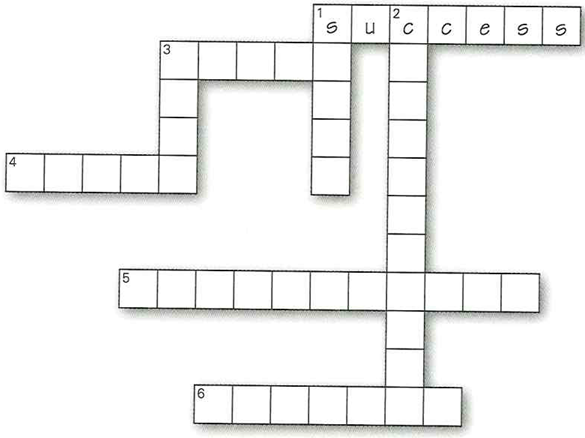
b. Circle the correct answer. Pay attention to the words in brackets.
הקיפו את התשובה הנכונה. שימו לב למילים שבסוגריים.
ex. 1. My brother (combines) a job and college. He works (hard) / little / new.
2. In the Jewish (tradition), people eat apples and salt / rice / honey for a sweet New Year.
3. An athlete's (goal) is to win / lose / join competitions.
4. My brother and I (share) a room. We sleep in a different / the same / another room.
5. When Abdul (sets his mind on something) he always / never / often does it.
6. The kids spent the whole of their summer vacation in Eilat. (In fact), they were there for two months / two years / two days.
7. There is a lot of (cooperation) between the partners. They sometimes / never I always work well together.
*16*
c. Complete the sentences with the words below. There are two words you don't need.
השלימו את המשפטים עם המילים שלמטה. ישנן שתי מילים מיותרות.
appear / rather than / worth it / not only / volunteer / succeeded / community / independent / join
ex. 1. Dana does things in her own way. She is a very (independent) person.
2. Joe and I -- at the zoo every week. We help feed the animals.
3. Kadir -- in winning the swimming competition.
4. I think I'd like to stay at home this evening -- go out.
5. People who live on a kibbutz know most people in their --.
6. Mom says she doesn't exercise enough. She is going to -- a gym.
7. The tickets to the concert in the park cost a lot. They are -- because the concert is wonderful!
d. Complete the sentences about yourself. Pay attention to the words in brackets.
השלימו את המשפyים על עצמכם. שימו לב למילים שבסוגריים.
ex. 1. I always (share) my books with my friends.
2. My (goal) is --.
3. It would be fun to (belong to) --.
4. I would like to (volunteer) --.
5. When I (reach) the age of eighteen, --.
6. In my (culture), the most important holiday is --.
7. There are many (tribes) --.
8. I wouldn't like to go to a (boarding school) because --.
תארו כל תמונה. השתמשו לפחות בשלוש מהמילים שלמטה. (היעזר במנחה)

volunteer / spend time / train / goal / join / champion / prefer / reach / share / whole / belong to / worth it / coach / city / make a team
תמונה 1: מאמן מסתכל על ילדים משחקים כדורגל.
ex. I belong to a football team. --.
תמונה 2: בחורה מחזיקה חתול, ובכלוב חתולים נוספים. --.
*17*
Language - Present simple - after student’s book, page 23
a. Circle the correct form of the verb.
הקיפו את הצורה הנכונה של הפועל.
ex. 1. Soccer are / (is) the most popular sport in Israel.
2. Tal and Simon both swim / swims for a team at Wingate.
3. She wants to play in the concert so she practice / practices every day.
4. Joe can't see the whiteboard. He need / needs glasses.
5. Bob don't ride / doesn't ride a bike. He walks to school.
6. The opera singer have / has a beautiful voice.
7. They want / wants to compete in the marathon.
8. We study / studies French and Arabic at school.
b. Complete the sentences with the positive or negative form of the verbs. Use the present simple.
השלימו את המשפטים עם צורת החיוב או השלילה של הפעלים. השתמשו ב- present simple.
ex. 1. I'm sorry, but I don't remember (not remember) your name.
2. Their favorite channel is Sports 5. They always -- (watch) it.
3. Gal -- (get up) at 6:30 a.m. every day.
4. Betsy is so busy, she -- (not have) time to go to the gym.
5. I -- (like) to play basketball, but I -- (not like) to watch it.
6. He -- (not train) on Saturdays. He -- (train) on Mondays and Thursdays.
c. 1. Complete the questions with the present simple form of the verbs.
השלימו את השאלות עם הצורה הנכונה של הפעלים ב- present simple.
ex. 1. Do you need (need) to fix your computer?
2. -- you -- (want) to eat lunch now?
3. What -- you -- (like) to do after school?
4. -- you (understand) this exercise?
5. When -- your mom -- (go) to work in the morning?
6. How much -- the tickets --. (cost)?
c. 2. Answer at least 3 of the questions in exercise c.1. Write complete sentences. --.
ענו על שלוש שאלות לפחות מתרגיל c.1.. כיתבו משפטים שלמים.
*18*
d. 1. Complete Amir's email to a friend about his school's sports day with the correct form of the verbs. Use the present simple.
השלימו את האימייל של אמיר לחבר על יום הספורט של בית הספר שלו עם הצורה הנכונה של הפעלים. השתמשו ב- present simple.
Subject: My school sports day
Dear Yigal,
Every year my school has (have) a sports day. On sports day, students -- (play) any sport they like. Then, they -- (compete) in sport competitions and -- (do) different types of sports activities.
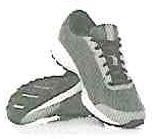
At the end of the day, teachers and students -- (run) a race together through the town. It's a great day and we have fun.
-- you -- (want) to come?
Amir
2. Does your school have a sports day or another special day when students do different activities? Write at least three sentences about it. Use the present simple. --.
האם מתקיים בבית הספר שלכם יום ספורט או יום מיוחד אחר שבו התלמידים משתתפים בפעילויות שונות? כיתבו לפחות שלושה משפטים על כך. השתמשו ב- present simple.
e. Answer the questions about yourself. Write complete sentences. Use the positive or negative form of the present simple.
ענו על השאלות על עצמכם. כיתבו משפטים שלמים. השתמשו בחיוב או השלילה של present simple.
ex. 1. Do you have a hobby? Yes, I do. I like dancing.
2. What kind of music do you listen to? --.
3. Do you spend a lot of time on the computer? --.
4. Do you belong to a sports team? --.
5. What do you like doing most in your free time? --.
*19*
f. Imagine you are meeting a cousin from Australia for the first time. Write three questions you would ask him or her. --.
תארו לעצמכם שאתם פוגשים בן דוד / בת דוד מאוסטרליה בפעם הראשונה כיתבו שלוש שאלות שהייתם שואלים אותו או אותה.
ex. 1. Where do you live in Australia?
2. --?
3. --?
4. --?
Writing - Express an opinion - after student's book, page 25, exercise c.
a. 1. Write the sentences below correctly. Use capital letters and punctuation.
כיתבו את המשפטים שלמטה בצורה נכונה. השתמשו באותיות גדולות ובסימני פיסוק.
ex. 1. many (israeli athletes - underlined) (compete) in countries around the world.
Many Israeli athletes compete in countries around the world.
2. gal fridman won a gold medal for windsurfing: --
3. i don't believe it: --
4. they love watching dancing competitions: --
a. 2. Underline the subject and circle the verb in each sentence above.
מיתחו קו מתחת לנושא והקיפו את הפועל בכל אחד מהמשפטים שלמעלה.
b. 1. Write the words in the correct order to make sentences.
Hint: The subject has a capital letter.
כיתבו את המילים בסדר הנכון כדי לחבר משפטים. רמז: בנושא יש אות גדולה.
ex. 1. the / Olympics / I /watching / love
I love watching the Olympics.
2. sports / Teens / like / to play: --.
3. fun / Competitions / are / for everyone: --.
4. the competition / team / My / won: --.
*20*
2. Match the expressions in A to their meanings in B.
התאימו את הביטויים ב-A לפירושים שלהם ב-B.
A
1. I believe
2. The way I see it
3. I think
4. In my opinion
5. I don’t believe
6. I don’t think
B
-- א. אני לא מאמין
-- ב. אני לא חושב, אינני סבור
-- ג. לדעתי
-- ד. כפי שאני רואה את זה
-- ה. אני חושב, אני סבור
1. ו. אני מאמין
3. Choose three of the sentences you wrote in exercise b.1. and give your opinion about each one. Complete the sentences below.
בחרו שלושה מהמשפטים שכתבתם בתרגיל b.1. והביעו את דעתכם על כל אחד מהם. השלימו את המשפטים שלמטה.
ex. 1. In my opinion, most people enjoy watching the Olympics.
2. The way I see it, --.
3. I think --.
4. I believe --.
5. I don't think --.
6. I don't believe --.
c. Write two sentences to support each of the opinions below.
כיתבו שני משפטים כדי לתמוך בכל אחת מהדעות שלמטה.
ex. 1. In my opinion, people do sports to keep fit.
a. It is good exercise.
b. It’s good for your health.
2. I think competition makes children feel bad.
a. --.
b. --.
3. The way I see it, swimming is the best sport of all.
a. --.
b. --.
4. I don't believe that students should get homework.
a. --.
b. --.
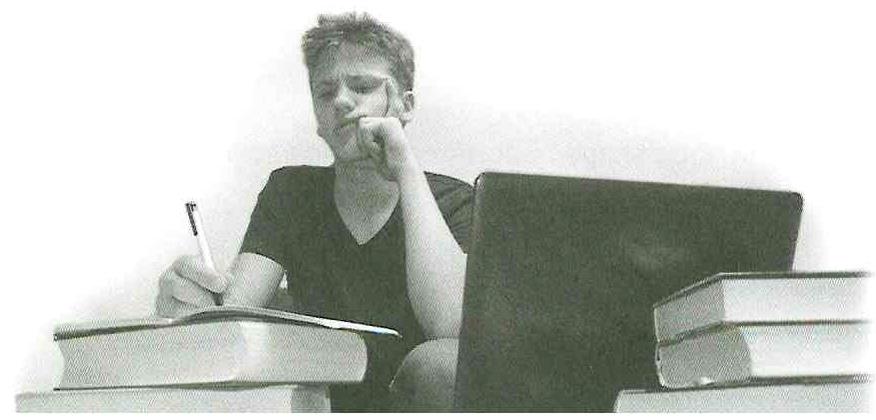
*21*
Part 4 - Story: Substitute Hero
New words (1) - Student’s book, page 26, exercise a.
a. Write the words below next to their meaning. If you do this correctly, the words will be in alphabetical order.
כיתבו את המילים שלמטה ליד הפירוש שלהן. אם תעשו זאת נכון, המילים יופיעו לפי סדר האלפבית.
alive / coach (v) / fill / feeling / accident / crash (v) / in front of / change your mind / get along (with) / (playing) field (n) / angrily /
hero
1. תאונה - accident
2. חי --
3. בכעס --
4. לשנות את דעתך --
5. לאמן --
6. להתנגש, להתרסק --
7. תחושה, רגש --
8. מגרש משחקים --
9. למלא, להתמלא --
10. להסתדר עם --
11. גיבור --
12. לפני --
season / park (v) / terrible / take off / star player / take someone's place / towards / too good / silent / notice (v) / shake (v)
13. להבחין, לשים לב - notice
14. לחנות --
15. עונה --
16. לרעוד --
17. שקט --
18. שחקן מצטיין --
19. להוציא (מהנבחרת) --
20. לתפוס את מקומו של מישהו --
21. נורא --
22. יותר מדי טוב --
23. לקראת, לעבר --
b. Find at least two words in exercise a. that are connected to:
מיצאו לפחות שתי מילים או שני ביטויים מתרגיל a שיש להם קשר ל:
1. people: alive, --
2. things people do: --
*22*
New words (2)
a. Write the words below next to their meaning. If you do this correctly, the words will be in alphabetical order.
כיתבו את המילים שלמטה ליד הפירוש שלהן. אם תעשו זאת נכון, המילים יופיעו לפי סדר האלפבית.
embarrassed / angry / guess (v) / get hurt / even / feel sorry for / hold (v) / breathe (v) / bench
1. כועס - angry
2. ספסל --
3. לנשום --
4. נבוך --
5. אפילו --
6. לרחם על --
7. להיפצע --
8. לנחש, לשער, להניח --
9. להחזיק --
mean (v) / pick (v) / trust (v) / style / thought (n) / spoil / wipe (v) / mess up / pull yourself together
10. להתכוון - mean
11. "לפשל" --
12. לבחור --
13. קח את עצמך בידיים --
14. לקלקל --
15. סגנון --
16. מחשבה --
17. לסמוך על, לתת אמון ב- --
18. לנגב --
Find three words or expressions in exercise a. that are connected to making mistakes.
מיצאו שלוש מילים או שלושה ביטויים מתרגיל a שיש להם קשר לעשיית טעויות.
1. embarrassed
2. --
3. --
4. --
*23*
Vocabulary practice - After student’s book, page 31, basic understanding
a. Complete the sentences about the story. Pay attention to the words in brackets. Look at Part 1 of the story "Substitute Hero" on pages 27-28 of the student's book to help you.
השלימו את המשפטים על הסיפור. שימו לב למילים שבסוגריים. היעזרו בחלק הראשון של הסיפור Substitute Hero שבעמודים 28-27 בספר הלימוד.
ex. 1. Nat wanted Rex to (coach). He thought he would be a good --.
(a). teacher, b. player
2. Rex was in a car (crash). It was so bad, he was lucky --.
a. he could drive, b. to be alive
3. After the accident, Rex (felt sorry for) himself because he couldn't --.
a. play football anymore, b. be a football coach
4. When the coach (noticed) Rex, he began walking --.
a. away from him, b. towards him
5. The coach said that Bobby didn't know how to (get along with) --.
a. the other players, b. the fans
6. Bobby Frale (took) Rex's (place) on the team --.
a. and became a great player, b. but the coach wasn't happy with him
7. Rex began to (shake) when he saw --.
a. the players on the field, b. Bobby practicing with the team
8. Before the car accident, Rex was a (star player) and an important --.
a. member of the team, b. American football coach
b. Complete the sentences according to part 2 of the story "Substitute Hero" on pages 29-30 of the student's book. Use the words below. There are two words you don't need.
השלימו את המשפטים לפי החלק השני של הסיפור Substitute Hero. שבעמודים 29-30 בספר הלימוד. השתמשו במילים שלמטה. ישנן שתי מילים מיותרות.
embarrassed / got hurt / trust / angry / meant / changes his mind / developed / beat
ex. 1. When Bobby messed up, the coach was (angry) with him.
2. In the locker room, Bobby was --. He wiped away his tears and walked over to Rex with a smile.
3. When you --", Bobby told Rex, "it felt like it was happening to me."
4. Rex did not understand what Bobby --.
5. At first Rex does not want to coach Bobby. Then he --. He tells Bobby he will coach him if he can pull himself together.
6. Rex believes that when Bobby begins -- to himself, he will be a great football player.
*24*
c. Circle the correct answer.
הקיפו את התשובה הנכונה.
ex. 1. No one was home. The empty house was (silent) / whole / alive.
2. Don't go to see that movie. It's competitive / terrible / amazing!
3. Your news is wonderful! It sounds too interested / too good / too boring to believe.
4. Sara has many exciting styles / thoughts / reasons about her next summer vacation.
5. When we saw Rami, we smiled and walked against / towards / together him.
6. “Don't do that!" Tom shouted even / especially / angrily.
7. My sister's company develops / guesses / wins apps for iPhones.
8. He fell off his bike after he messed up / took off / crashed into a tree.
d. Complete the dialogues with the words below.
השלימו את השיחות עם המילים שלמטה.
angry / breathe / guess / got hurt / (playing) field
Fan 1: Did you hear what happened to Rick, the star player of our favorite football team?
Fan 2: No. What happened?
ex. Fan 1: He(got hurt) at today's game.
Fan 2: How?
Fan 1: When Rick caught the ball, the other team tackled (הפילו, התקילו) him from all sides. His fans were so --!
Fan 2: How is Rick doing now?
Fan 1: I heard that at first he couldn't --. But I -- he'll be OK, because he walked off the -- without any help.
Fan 2: Rick's a real hero!
styles / in front of / coaching / embarrassed / feeling / pick
Ann: My older sister is -- the school swimming team this season.
Sue: Really?
Ann: Yes. She's taking the place of the regular coach.
Sue: How did you feel when your sister stood -- you and the other swimmers for the first time?
Ann: At first, I had a strange --. I was even a little --, but then she spoke to the team.
Sue: What did she say?
Ann: She said that there would be no favorites, and that we all need to work hard.
We all need to learn different swimming --. Then she'll -- the best swimmer to compete in this year's swimming championship.
Sue: It sounds like your sister is a great coach.
Ann: Yes, I think you're right!
*25*
e. Complete the sentences. Make them true for you. Pay attention to the words in brackets.
השלימו את המשפטים כך שיהיו נכונים ביחס אליכם. שימו לב למילים שבסוגריים.
ex. 1. My father (parked) the car (near the shopping mall).
2. Please (fill) my bottle --.
3. My favorite (season) is --.
4. The person I (trust) the most is --.
5. When I'm (angry), --.
6. My (favorite) TV hero is --.
7. My friend took my (place) when --.
כיתבו לפחות ארבעה משפטים על התמונה. השתמשו במילים שלמטה.
embarrassed / in front of / angry / fill / angrily / pull yourself together / feeling sorry for / succeed / practice / spoil / mess up / playing field / do their best / coach / worth it / wipe / star player / bench
שתי קבוצות אחת ניצחה 32 והשניה הפסידה עם 22 נקודות. אחד המאמנים שמח והשני כועס. חלק מהקהל שמח וחלקו עצוב. (היעזר במנחה)
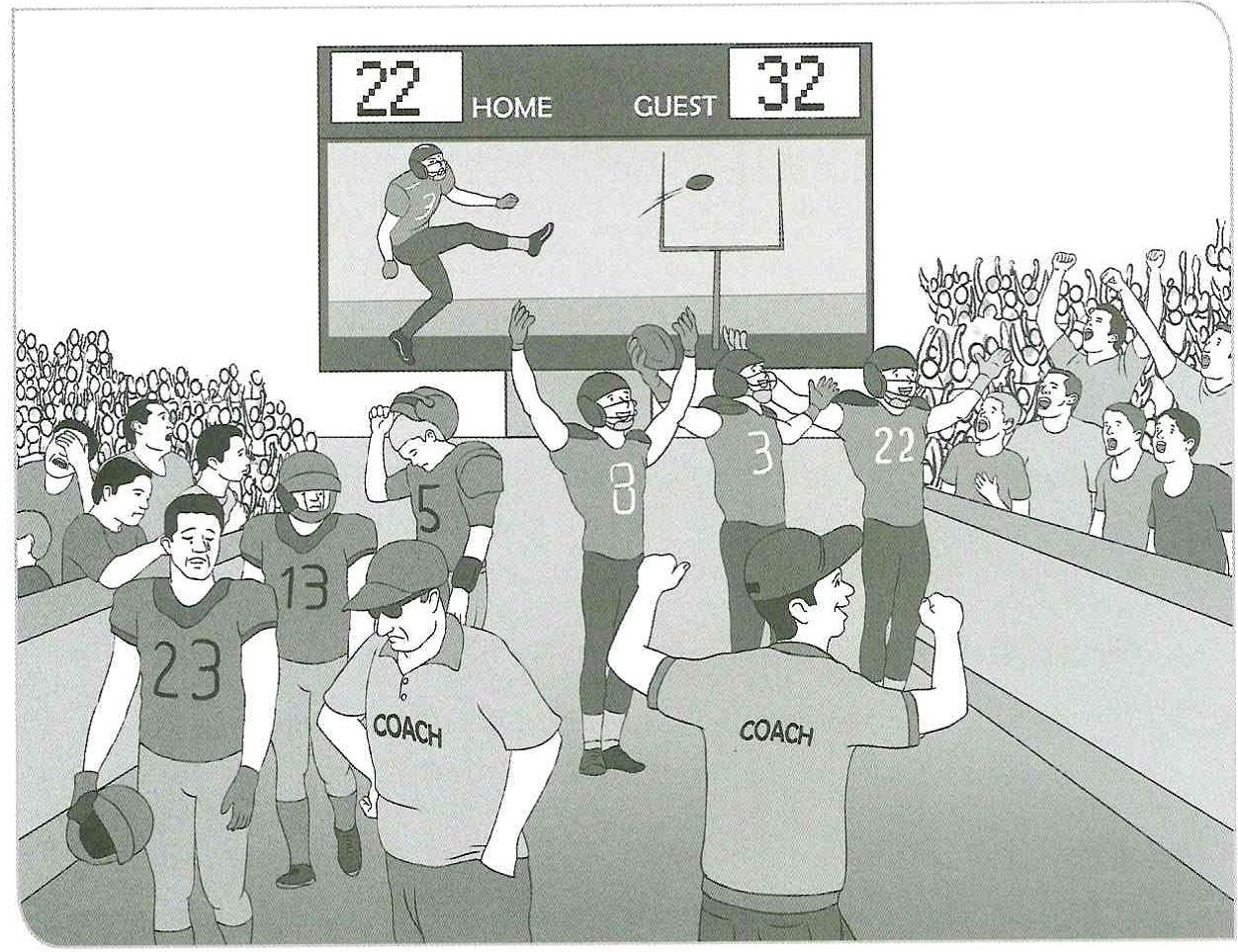
ex. 1. The coach was angry that his team lost.
2. --.
3. --.
4. --.
5. --.
*26*
Unit 1 - Review - after student’s book, page 35
Vocabulary
a. Complete the sentences with the words below.
השלימו את המשפטים עם המילים שלמטה.
changed her mind / get along with / trust / train / rather than
ex. 1. Sam is very friendly. He's easy to (get along with).
2. They -- every day. They want to win the competition.
3. How about staying home tonight -- going out?
4. A good friend is someone you can always --.
5. She wanted to go jogging but she -- when it started to rain.
b. Circle the word or phrase that does NOT follow the first word on the line.
הקיפו את המילה או את הביטוי שלא יכול לבוא אחרי המילה הראשונה בשורה.
ex. 1. have: a great time / (relax) / a meal
2. park: a car / in the street / a feeling
3. share: an accident / a secret / a room
4. improve: your grades / your chances / rule
5. shake: with cold / with laughter / with success
c. Circle the correct answer.
הקיפו את התשובה הנכונה.
ex. 1. I like to win. I (don't give up) / practice easily.
2. Tal enjoys playing handball, especially / even if his team loses.
3. The team lost the game. What's worse / Set your mind, they lost the competition.
4. A person who thinks for him or herself is interested / independent.
5. The tickets to the concert cost a lot of money but they were too good / worth it.
Grammar
d. Complete the sentences with the words below. Use the present simple.
השלימו את המשפטים עם המילים שלמטה. השתמשו ב-present simple.
share / volunteer / go / make / sound / be / lose
ex. 1. He goes to the gym three times a week.
2. Competing always -- me try harder.
3. Your project -- really interesting.
4. We -- at the animal shelter twice a week.
5. My sister and I -- our clothes all the time.
6. John -- a good sport. He doesn't take it badly when he --.
*27*
e. 1. Complete the sentences with the present simple form of the verbs in brackets.
השלימו את המשפטים עם צורת ה- present simple של הפעלים שבסוגריים.
ex. 1. What time do you leave (leave) for school every day?
2. She -- (not have) a cat. She -- (prefer) dogs.
3. “-- you -- (study) French in school?"
4. That garage -- (not fix) cars. It -- (fix) motorcycles.
5. I -- (not help) my sister with her math homework. My brother usually -- (help) her because he's better at math than I -- (be).
e. 2. Translate questions 1 and 3 above into your language. Do you form questions in the present tense in your language in the same way as in English? --.
תרגמו לעברית את שאלות 1 ו-3 שלמעלה. האם אתם מנסחים שאלות בהווה בשפתכם באותו אופן כמו באנגלית?
Writing
f. Circle the subject and underline the verb(s) in each sentence.
הקיפו את הנושא ומיתחו קו תחת הפועל או הפעלים בכל משפט.
ex. 1. (She) (coaches - underlined) the swimming team.
2. The race starts in ten minutes.
3. They are excellent athletes.
5. The team practices after school twice a week.
g. Read Leslie's opinion about Taekwondo, a martial art. Then answer the questions below.
קיראו את דעתה של לסלי על טאקוונדו, אמנות לחימה. לאחר מכן, ענו על השאלות שלמטה.
I think that Taekwondo is a great sport. Some people think that Taekwondo is all about fighting but I don't think it is. The way I see it, Taekwondo teaches a person more than how to fight. It's a way to train your body and your mind. In my opinion, Taekwondo teaches you to have self-control.
1. What is Leslie's opinion of Taekwondo? --.
2. Find at least 2 expressions that Leslie uses to express her opinion. --.
h. Write three sentences expressing your opinion about an activity you like to do.
כיתבו שלושה משפטים המביעים את דעתכם על פעילות שאתם אוהבים לעשות.
ex. 1. I think it is important to do sports.
2. --.
3. --.
4. --.
*28*
Independent reading 1 - after student’s book, page 35
a. Read the article.
How to be a good sport
Do you want to be a good sport?
Learning to be a good sport is a skill, like learning to ride a bike. You might not be able to do it at first, but with time it will get easier. Here are some tips to help you.

2. Give your very best always. Don't let your team down.
3. Play by the rules of the game. Don't try to win points by cheating. Sport is not about winning or losing - it's about how you play the game.
4. Accept the decisions that the referee (שופט) makes. Don't shout or argue with the referee, even if you disagree with the decision.
5. Be a good sportsman. Wish the other players or team good luck before a competition. When the other players do well, tell them. It's all part of the game!
6. When you lose a game - and it happens - tell the winning players that they played well. There's always the next game or competition.
Finally, a good sport is someone who is fun to have on any team.
b. Answer the questions below and on page 29 about the article.
1. Complete the sentence.
The writer compares learning to be a good sport to --.
2. Complete the sentences.
a. If you have the ball, you should --.
b. When you play by the rules, you do NOT --.
*29*
3. Write 2 things a player should do when angry with the referee's decision. --.
4. Give 2 examples of how to be a good sportsman. --.
5. Complete the sentence.
People like good sports because --.
c. Match each poster to a tip in the article. Write the number.
Pictures:
-- a. Don't argue with the referee!
-- c. Respect all players!
-- d. Be a good sport
-- e. Don't cheat. Play fair!
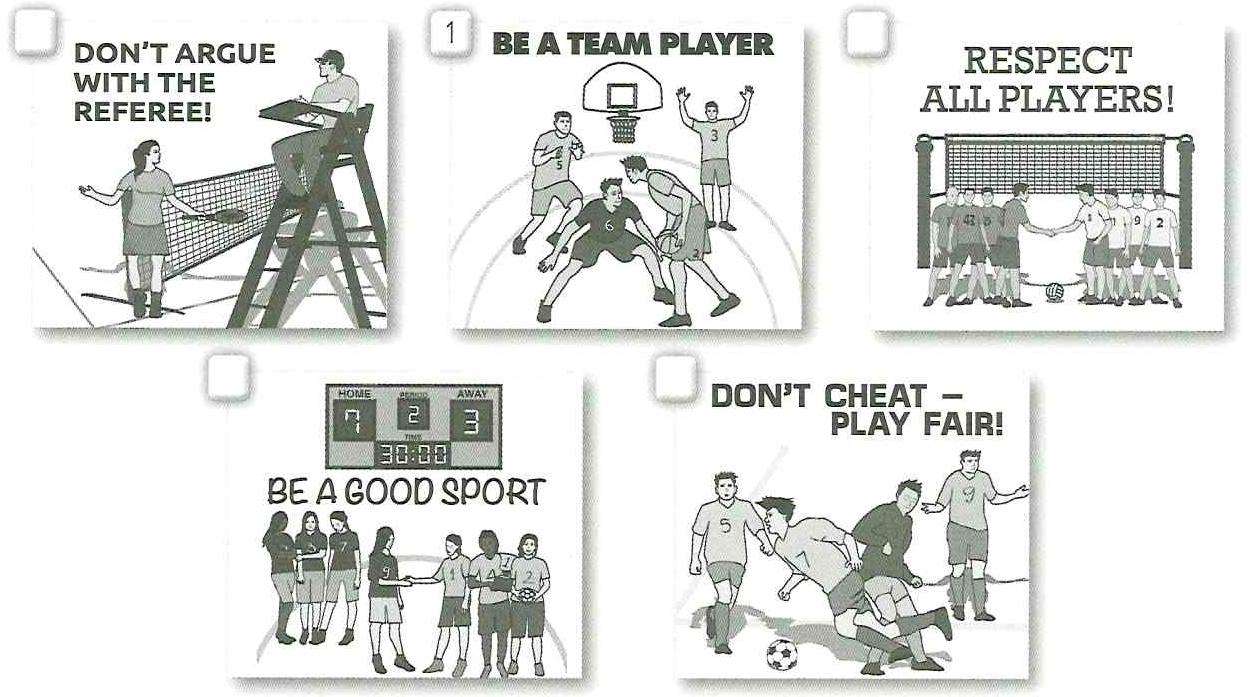
d. Write the number of the tip which describes each of the following:
-- a. What to do when you don't win.
-- b. How to act towards a referee.
-- c. How to be a team player.
-- d. How to act towards the other team.
-- e. How to play a game.
What about you?
Which tip do you think is the most useful? Explain why. --.
*30*
Read the article
(השורות מחולקות וממוספרות לפי ספר הדפוס, מספר השורה יבוא בסוגריים בתחילת השורה)
A different kind of school
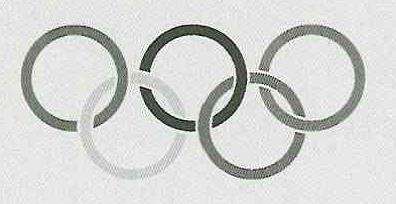
(1) China wants to be the world's number 1 country at international sports
(2) competitions such as the Olympic Games, and it has a plan to make this happen.
(3) It's training thousands of young people to "bring home the gold". In fact, China
(4) has 3,000 special schools to train young athletes.
(5) The children often start their training at the age of nine. They come from all over
(6) the country so they live, study and train at the sports schools. They spend many
(7) hours of the day training, so they don't have much time for ordinary school
(8) subjects or hobbies. Because the schools are often hundreds of kilometers away
(9) from the children's homes, they only see their families once or twice a year. Life
(10) isn't easy for the young athletes, but they feel proud because they are doing
(11) something important for their country.
(12) Today, about 400,000 young Chinese are training and studying at sports schools,
(13) and every year new children join them. All of them hope to become champions,
(14) but only about one in 2,000 succeeds.
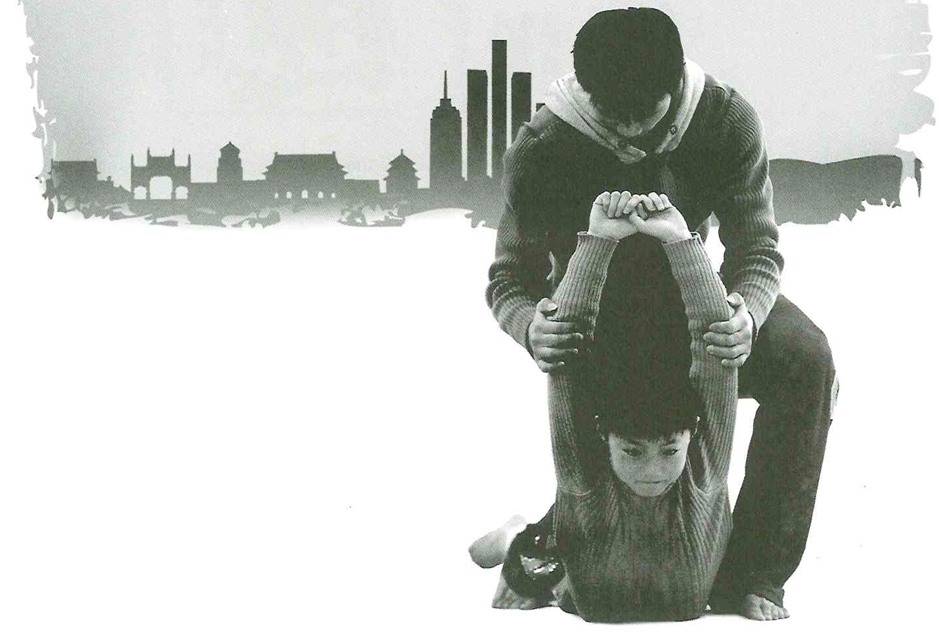
*31*
Complete the interview with Chang, a coach at a Chinese sports school. Use the information in the article to help you.
Interviewer: How many special schools are there?
Chang: --.
Interviewer: When do the children begin their training?
Chang: --.
Interviewer: Where do the children come from?
Chang: --.
Interviewer: How often do the children see their families?
Chang: --.
Interviewer: How do the children feel about studying at the school?
Chang: --.
Interviewer: How many children succeed?
Chang: --.
c. Answer the questions.
1. Do you think the country should decide who becomes an athlete? --.
2. Write T (true) or F (false).
-- a. China wants to win many gold medals.
-- b. The children spend the same amount of time studying as doing sports.
-- c. The children live at home.
-- d. Life is difficult for the young athletes.
-- e. Nearly half a million children are studying at sports schools.
What about you?
Would you like to go to a Chinese sports school? Explain why or why not. --.
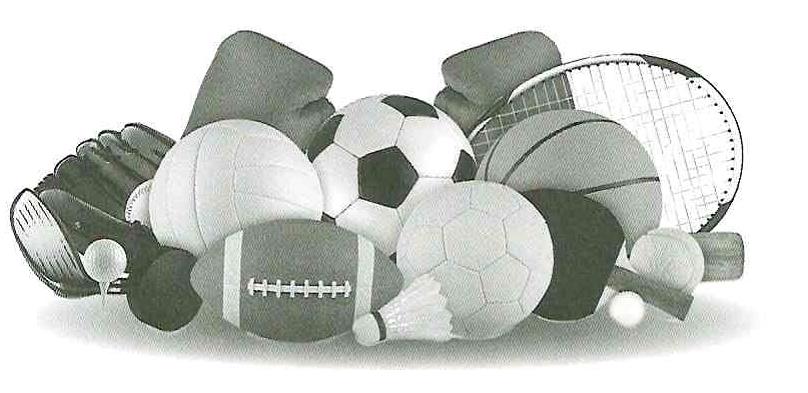
*32*
*32*
Part 1 - What people eat - student's book, page 38, exercise a.

New words
Write the words below next to their meaning. If you do this correctly, the words will be in alphabetical order.
כיתבו את המילים שלמטה ליד הפירוש שלהן. אם תעשו זאת נכון, המילים יופיעו לפי סדר האלפבית.
Middle East / definitely / healthy / foods / prepare / eating habits / fast food / kinds (n) / fruit / beans / popular / frozen / meat / fresh / expert
1. שעועית - beans
2. באופן ברור, בוודאות --
3. הרגלי אכילה --
4. מומחה --
5. מזון מהיר --
6. מאכלים --
7. טרי --
8. קפוא --
9. פרי, פירות --
10. בריא, מזין --
11. סוגים --
12. בשר --
13. המזרח התיכון --
14. פופולרי --
15. להכין –

*33*
vegetable / traditional / rice / product / taste (v) / rich / salt / soft drinks / West / true
16. מוצר - product
17. אורז --
18. עשיר --
19. מלח --
20. משקאות קלים --
21. לטעום --
22. מסורתי --
23. נכון, אמת --
24. ירק --
25. המערב --
b. Find at least 2 words in exercise a. that are connected to:
מיצאו לפחות שתי מילים או שני ביטויים מתרגיל a שיש להם קשר ל:
1. foods we eat: fast food, --
2. places: --
3. adjectives: --
Student's book, page 38, exercise b.1.
b. 1. Where do you think the foods below are the most popular - in the United States, the Middle East or Japan? Complete the lists.
בספר תמונות של מאכלים שונים.
frozen food / tofu / yogurt / white cheese / hummus / vegetables / beans / fried chicken / fresh meat / lentils / burger / French fries / fish / rice / kebab / soft drinks / falafel / fruit / pizza
United States: --
Middle East: --
Japan: --
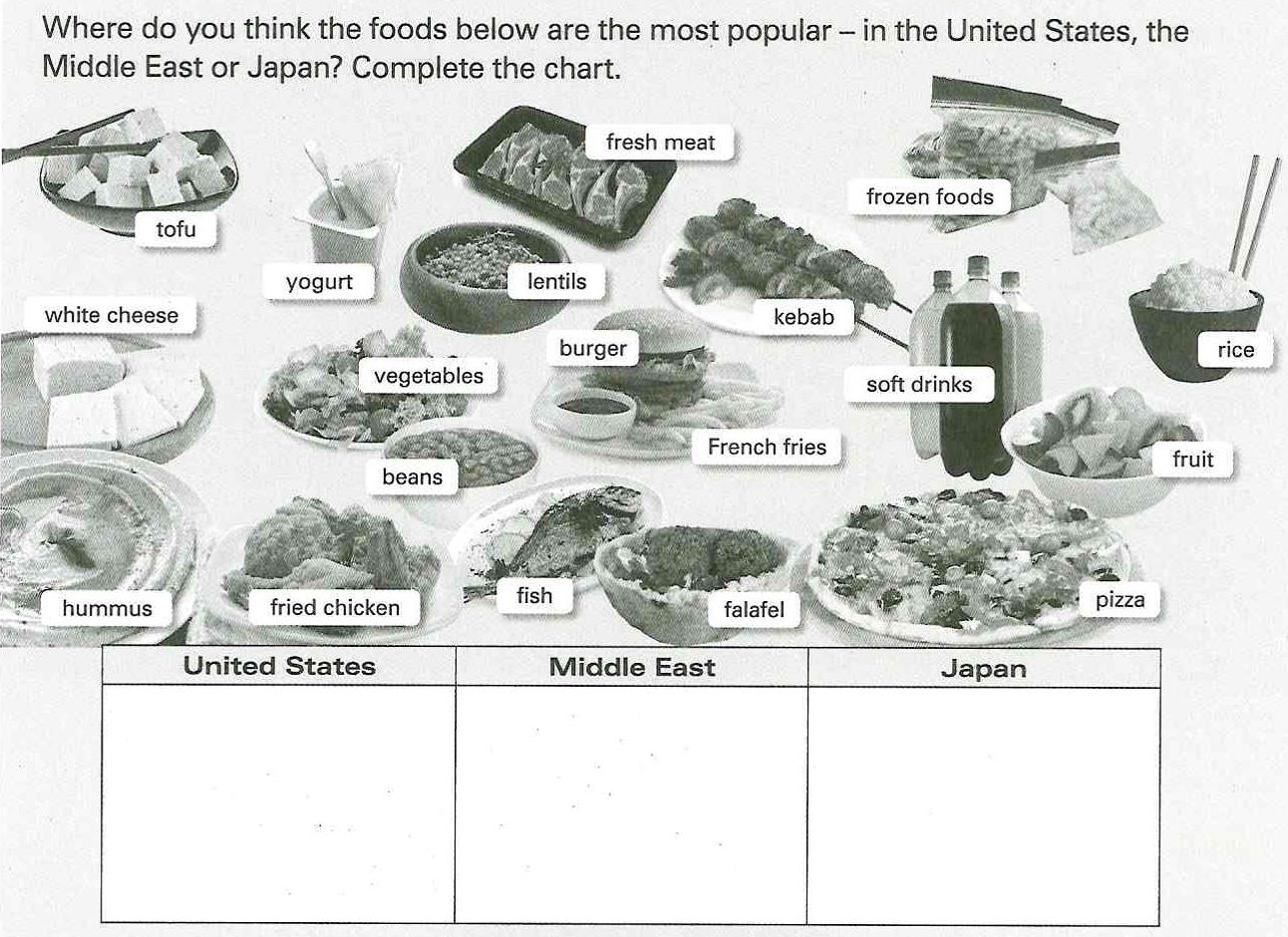
*34*
Student’s book, page 39, exercise c.
c. Read the questions below. Then listen to the interview again and answer the questions.
1. What is the interview about? --
a. How bad junk food is for you.
b. What people in different countries eat.
c. How to prepare different kinds of food.
2. Complete the sentence.
Prepared food is not healthy because it often has a lot of --.
3. According to Samantha, Americans eat less -- than other people.
a. meat, b. frozen food, c. fruit and vegetables
4. What does Samantha say about the food that people eat in the Middle East? --
a. It is very tasty, b. It is very healthy, c. They eat a lot of fast food.
5. Complete the sentence.
The Japanese live -- than other people.
6. Choose the 2 correct answers.
Traditional Japanese food includes --.
a. fruit, b. fish, c. chicken, d. soy products, e. lentils
7. Today, people eat --.
a. only food that is popular in their country.
b. food that is popular all over the world.
c. only food that is made quickly.
8. In next week's program, Samantha is going to recommend foods to American teenagers. Which foods do you think Samantha will recommend? Why? --.
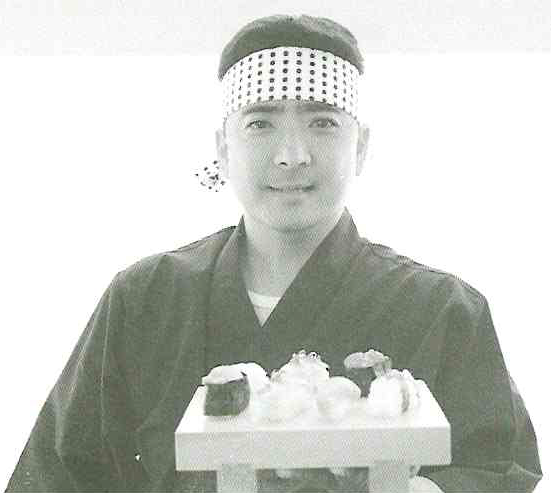
*35*
Words, words, words - after student’s book, page 40
a. Circle the correct answer to show you understand the meaning of the words in brackets.
.הקיפו את התשובה הנכונה כדי להראות שאתם מבינים את פירוש המילה שבסוגריים.
ex. 1. They are (definitely) coming to the party.
(a) certainly, b. perhaps, c. not
2. Let's get some (soft drinks) for the party.
a. cola and lemonade, b. milk and water, c. coffee and tea
3. The meal took two hours to (prepare).
a. eat, b. use, c. make
4. The movie is based on a (true) story.
a. sad, b. false, c. real
5. The actress is very (popular).
a. proud, b. well known, c. interesting
6. Ask Jameel about your computer. He is the (expert). He --.
a. has a computer, b. knows about computers, c. doesn't know anything
7. Tanya has good (eating habits). She eats --.
a. healthy foods, b. junk food, c. soft drinks
8. Nadine doesn't like eating anything which is (frozen). She doesn't even like --.
a. ice cream, b. French fries, c. salads
b. 1. Match the words in A and B to make phrases. Use the clues to help you.
התאימו A ו-B כדי ליצור ביטויים. היעזרו ברמזים.
A. Middle / traditional / (fast) / prepared / soft
B. (food) / meat / meal / drinks / East
ex. 1. You eat this with your friends at the mall: fast food
2. You may have this when you are thirsty: --.
3. You can buy this for a picnic: --.
4. We live in this area of the world: --.
5. We eat this on special festivals: --.
2. Write sentences with 3 of the phrases you made in exercise b.1.
כיתבו משפטים עם שלושה צירופי מילים שיצרתם בתרגיל b.1..
ex. 1. I think fast food isn't healthy.
2. --.
3. --.
4. --.
*36*
c. Circle the correct word to complete each question. Then answer the questions in complete sentences.
הקיפו את המילה הנכונה כדי להשלים כל שאלה. לאחר מכן, ענו על השאלות במשפטים שלמים.
ex. 1. Do you like (vegetables) / rules / experts with your steak?
Yes. I like vegetables with my steak.
2. Are you allergic to certain foods / kinds / scores? --.
3. Do you love the smell of rich / fresh / popular bread? --.
4. How many pieces of beans / fruit / salt do you eat every day? --.
5. Do you think nuts are a smelly / healthy / traditional snack food? --.
6. How long does it take you to prepare / spoil / taste a salad for lunch? --.
7. What kinds of west / rice / tradition do you like to eat? --.
8. What score / tribes / products can you buy at a supermarket? --.
d. Some teens are talking about the food for a class party. Complete their sentences. Pay attention to the words in brackets.
מספר בני נוער מדברים על האוכל למסיבת כיתה. השלימו את המשפטים. שימו לב למילים שבסוגריים.
ex.
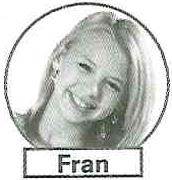
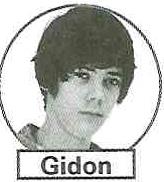
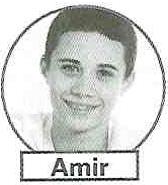
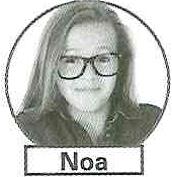
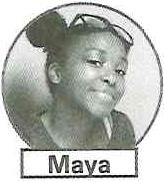
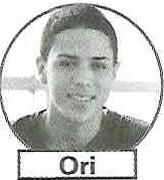
*37*
e. Idioms
1. Replace the words in brackets with the correct idiom below.
החליפו את המילים שבסוגריים עם מטבע הלשון המתאים שלמטה.
has a sweet tooth / apple of our eye / am nuts about / go bananas / a piece of cake
ex. 1. I (love) dogs so I volunteer at an animal shelter: am nuts about
2. Our baby is the (best person in our lives): --.
3. He (loves eating foods made with sugar): --.
4. I (go crazy) when I can't find my glasses: --.
5. It was (very easy) to get here. The directions were clear: --.
2. Complete each sentence to show you understand the meaning of the idiom in brackets.
השלימו כל משפט כדי להראות שאתם מבינים את פירוש מטבע הלשון שבסוגריים.
ex. 1. The team (went bananas) when he scored the winning goal.
2. (The apple of my parents' eyes) --.
3. It was (a piece of cake) for me to --.
4. When I was younger, I (was nuts about) --.
5. People who (have a sweet tooth) --.
Language - Comparative and Superlative adjectives.
as ... as / not as ... as
Adjectives - student's book, page 42, exercise c.1.
a. Write the words below next to their meaning. If you do this correctly, the words will be in alphabetical order.
כיתבו את המילים שלמטה ליד הפירוש שלהן. אם תעשו זאת נכון, המילים יופיעו בסדר האלפבית.
fresh / salty / cold / fattening / sweet / smelly / healthy / tasty / delicious / hot / spicy / frozen
1. קר - cold
2. טעים מאוד --
3. משמין --
4. טרי --
5. קפוא --
6. בריא --
7. חם --
8. מלוח --
9. מסריח --
10. חריף, מתובל --
11. מתוק --
12. טעים --
*38*
b. 1. Write the adjectives that can describe each item below. You can use an adjective more than once.
כיתבו את שמות התואר (adjectives) שיכולים לתאר כל אחד מהדברים שלמטה. אתם יכולים להשתמש בשם תואר יותר מפעם אחת.
spicy / salty / fattening / smelly / tasty / hot / fresh / cold / sweet / healthy / delicious / frozen
a. fish: tasty, --,
b. potato chips: --,
c. schwarma: --,
d. watermelon: --,
e. chili peppers: --,
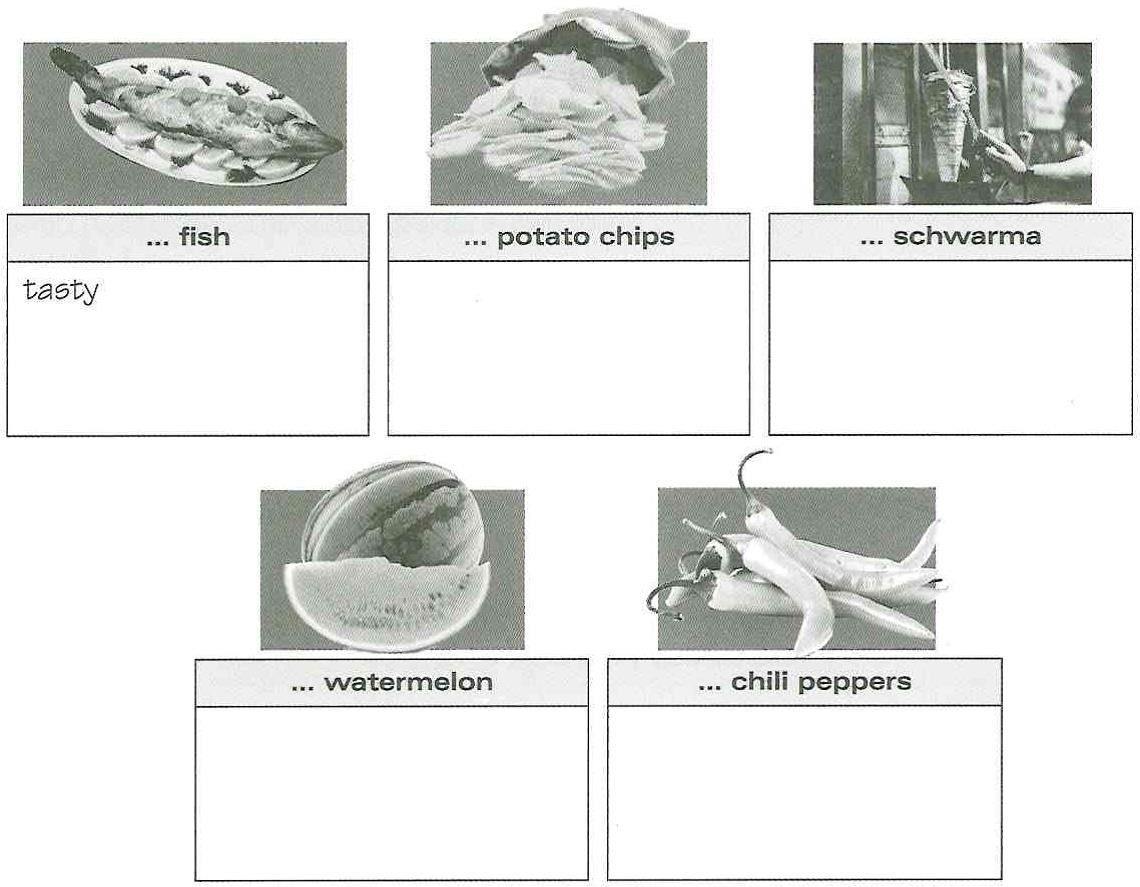
2. Complete the sentences with adjectives and nouns from exercise b. 1.
השלימו את המשפטים עם שמות תואר ושמות עצם מתרגיל b.1..
ex. 1. (Spicy chili peppers) are very popular in Mexican cooking.
2. People that live near the sea usually eat a lot of --.
3. Most people enjoy a snack of --.
4. When I'm hot and thirsty, I always like to eat --.
5. When I go to the market, I love to eat --.
3. Write sentences with at least 3 of the adjectives and nouns from exercise b.1. which you did NOT use in the exercise above.
כיתבו משפטים עם לפחות שלושה שמות תואר ושמות עצם מתרגיל b.1. בהם לא השתמשתם בתרגיל שלמעלה.
ex. 1. I think junk food is very fattening.
2. --.
3. --.
4. --.
*39*
Comparative adjectives
a. Do sentences a and b have the same meaning or a different meaning? Write S (Same) or D (Different). Pay attention to the words in brackets.
האם למשפטים a ו- b יש משמעות זהה או שונה. כיתבו S לזהה ו-D לשונה. שימו לב למילים שבסוגריים
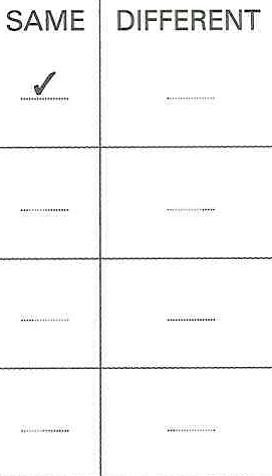
a. The game was (longer than) we expected.
b. We thought it would end at 2 p.m. but it ended at 4 p.m.
2. --
a. Omar is (as old as) his cousin.
b. Omar is 15 and his cousin is 15.
3. --
a. We traveled by bus and not by train because it was (cheaper).
b. It cost more money to travel by train.
4. --
a. Sue is a (better) tennis player than I am.
b. Sue plays tennis as well as I do.
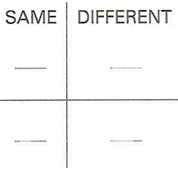
a. They think Italian food is (tastier than) Mexican food.
b. They prefer Italian food to Mexican food.
6. --
a. Reading books is (more interesting than) seeing movies.
b. I'd rather see a movie than read a book.
b. 1. Read the ad and circle the adjectives.
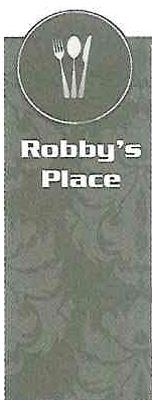
Robby’s Place
Are You Looking for the (BEST) Restaurant?
Come to Beer Sheva and check out Robby's Place.
We're a bit more expensive but...
- our food is much better
- our service is faster
- the atmosphere is friendlier
- the entertainment is exciting!

Robby's Place, 42 Hayarkon Street, Beer Sheva
b. 2. Answer the questions about the ad.
ענו על השאלות על המודעה.
ex. 1. Give one reason why Robby's Place has higher prices.
The food is better.
2. How does the entertainment at Robby's Place compare with other restaurants? --.
3. What is the service like? --.
4. Why is it more pleasant to go to Robby's Place than to other restaurants? --.
*40*
c. Complete the sentences to make them true for you.
השלימו את המשפטים כן שיהיו נכונים לגביכם.
ex. 1. In my school, it's harder to be on the basketball team than in the band.
2. I am happier when -- than when --.
3. It's more exciting for me to -- than to --.
4. It takes me longer to -- than to --.
5. I am less tired when -- than when --.
6. I am sleepier when -- than when --.
d. Complete the questions with the comparative form of the adjectives. Then answer the ,questions with your opinion.
השלימו את השאלות עם צורת ה- comparative של שמות התואר. לאחר מכן, ענו על השאלות לפי דעתכם.
ex. 1. healthy: Which is a healthier eating habit - eating a little food or a lot of food before you exercise?
Eating a little food before you exercise is healthier eating habit.
2. salty: Which has -- water, the Kinneret or the Dead Sea? --.
3. good: Which is --, baked chicken or fried chicken? --.
4. tasty: Which is --, potato chips or French fries? --.
5. dangerous: Which is --, a mountain bike or an electric bike?
6. spicy: Which is --, chili or cinnamon? --.
*41*
Superlative adjectives
a. Answer the questions so they are true for you.
ענו על השאלות כך שיהיו נכונות לגביכם.
Who is …?
1. the oldest child in your family: --
2. the funniest person in your class: --
3. the most helpful person at home: --
4. the most hard-working person in your family: --
5. the friendliest person in your class: --
b. Complete the questions with the superlative form of the adjectives in brackets. Then take the quiz. The answers are at the bottom of the page.
השלימו את השאלות עם צורת ה-superlative של שמות התואר שבסוגריים. לאחר מכן, ענו על השאלון. התשובות נמצאות בתחתית העמוד.
Fun quiz!
ex. 1. Which country has (the largest) population in the world? (large)
a. Russia
b. the U.S.A.
(c.) China
2. Which is -- desert in the world? (hot)
a. Sahara
b. Lut
c. Sinai
3. Which is -- city in the world to live in? (expensive)
a. Tel Aviv
b. New York
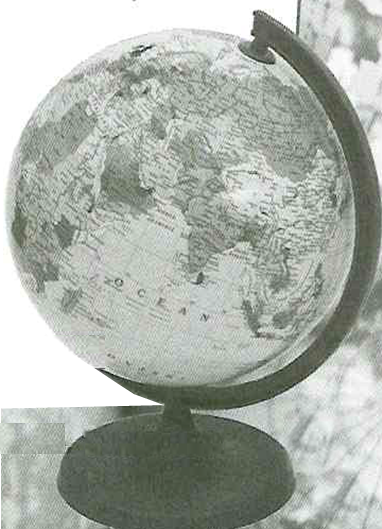
4. Which is -- animal for people in Africa? (dangerous)
a. a crocodile
b. a mosquito
c. a lion
5. Which country has -- visitors every year? (many)
a. Italy
b. France
c. China
6. Which animal is -- on Earth? (heavy)
a. a blue whale
b. a rhinoceros
c. an elephant
Answers:
1.c. / 2.b. / 3.c. / 4.b. / 5.b. / 6.a.
*42*
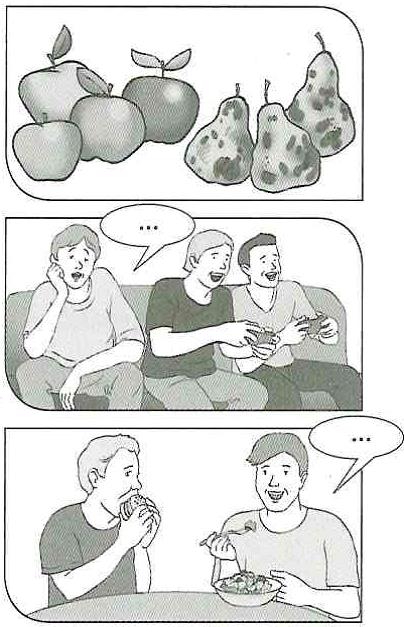
expensive / healthy / fresh / interesting / fast
א. אגסים רקובים. תפוחים טריים.
ex. 1. The pears are not as fresh as the apples.
ב. אחד חושב ושניים משחקים במחשב.
2. “This game is -- my computer game."
ג. אחד אוכל המבורגר, השני סלט.
3. “Your burger is -- my salad.
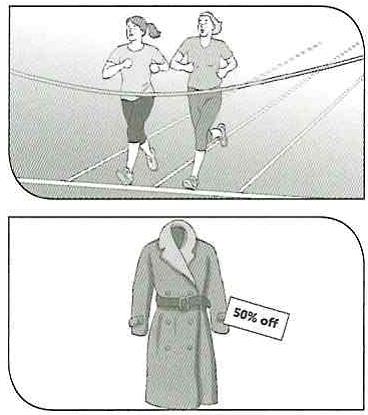
4. Gali runs -- Lia. They came first together in the race!
ה. מעיל ב-50 אחוז הנחה.
5. This coat -- I thought.
d. Write at least two sentences comparing the school lunches from three different countries. Use the comparative, superlative, as... as and not as ...as form of the adjectives below.
כיתבו לפחות שני משפטים שמשווים בין ארוחות הצהריים בבתי ספר בשלוש מדינות שונות. השתמשו בצורות ה- ,comparative as ... as ,superlative ו- not as ... as של שמות התואר שלמטה.
cold / salty / sweet / fresh / spicy / Italy / packaged / delicious / much / bad / fattening / healthy / tasty / boring

א. ארה"ב: צלחת כריך, אפונה? ומיץ.
ex. USA: 1. The lunch in the U.S.A. is not as healthy as the lunch in Finland.
2. --
ב. פינלנד: 2 פרוסות לחם, מרק, סלט ותפוח
Finland: 1. --.
2. --.
ג. איטליה: פסטה, 2 פרוסות לחם, ענבים, עוגיות וירק
Italy: 1. --.
2. --.
*43*
Part 2 - Fighting hunger
Reading - Student’s book, page 44, exercise a.
New words
Write the words below next to their meaning. If you do this correctly, the words will be in alphabetical order.
כיתבו את המילים שלמטה ליד הפירוש שלהן. אם תעשו זאת נכון, המילים יופיעו לפי סדר האלפבית.
company / among / catch (an illness) / escape (v) / in danger / clothes / future / empty / government / hungry / floor / basic / afford to / energy / hunger / bill (n) / cause (n, v) / electricity
1. להרשות לעצמו - afford to
2. מתוך, בין --
3. בסיסי --
4. חשבון (לתשלום) --
5. "לחטוף", לקבל (מחלה) --
6. גורם, לגרום --
7. הלבשה, בגדים --
8. חברה --
9. חשמל --
10. ריק --
11. אנרגיה, כוח --
12. לברוח --
13. רצפה --
14. עתיד --
15. ממשלה --
16. רעב (עם קמץ מתחת ל'ע') --
17. רעב (עם צירה מתחת ל'ע') --
18. סכנה --
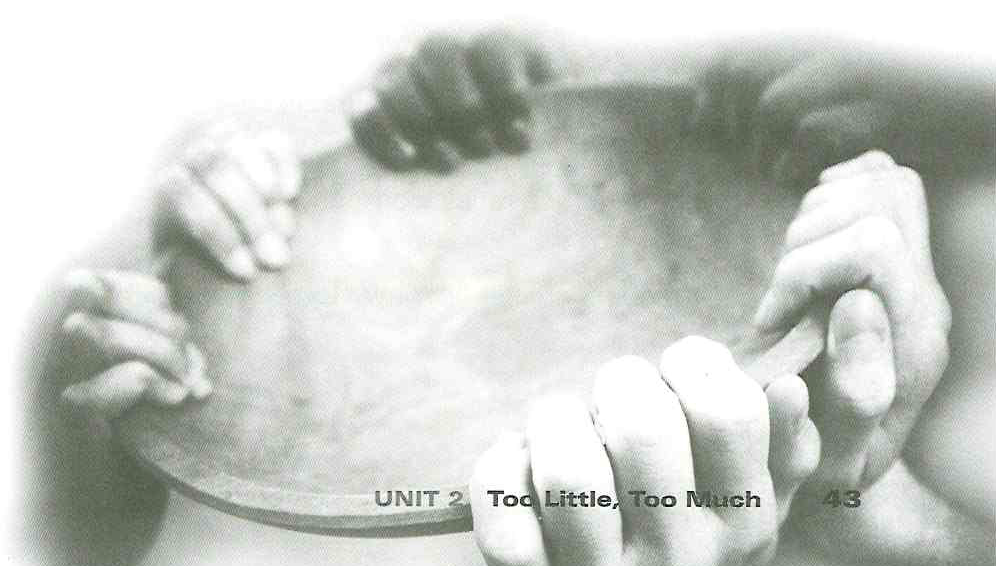
*44*
roof / programme (n) / organization / poor / subject / thin / poverty / number of / nearby / stomach / suffer / population
19. קרוב (לכאן) - nearby
20. כמה, מספר (של) --
21. ארגון --
22. עני --
23. אוכלוסיה --
24. עוני --
25. תוכנית --
26. גג --
27. קיבה, בטן --
28. נושא --
29. לסבול --
30. רזה --
b. Find at least two words in exercise a. that are connected to:
מיצאו לפחות שתי מילים או שני ביטויים מתרגיל a שיש להם קשר ל:
1. things we have at home: floor, --
2. poverty: --,
Words, words, words - after student's book. page 48
a. Circle the correct meaning of the words in brackets.
הקיפו את הפירוש הנכון של המילים שבסוגריים.
ex. 1. Who is the head of the (government)?
א. חברה / (ב.) ממשלה
2. In winter, some people (suffer) from the cold weather.
א. נהנים / ב. סובלים
3. I can't (afford) that smartphone.
א. להרשות לעצמו / ב. לספק
4. He shared the candies (among) his friends.
א. אחרי / ב. עם
5. During the war, millions of people died of (hunger).
א. צער / ב. רעב
6. She works for a music (company).
א. חברה / ב. ידידים
7. I ate too much and now my (stomach) hurts.
א. בטן / ב. שרירים
*45*
b. Circle the words below in the puzzle. Then complete the sentences with the words below.
הקיפו את המילים שלמטה בתפזורת. לאחר מכן, השלימו את המשפטים עם המילים.
catch / company / basic / poor / floor / caused / hungry / thin / future / subjects
בספר תפזורת
(c) s u b j e c t s f u t u r e
(a) f c o m p a n y m o j c o e
(u) l a s k m f p o o r s a a u
(s) o o p j l l b a s I c t r b
(e) o s u h u n g r y b y c s o
(d) r b o k t o v t h I n h b r
y n d r s v v h b d o I r e s
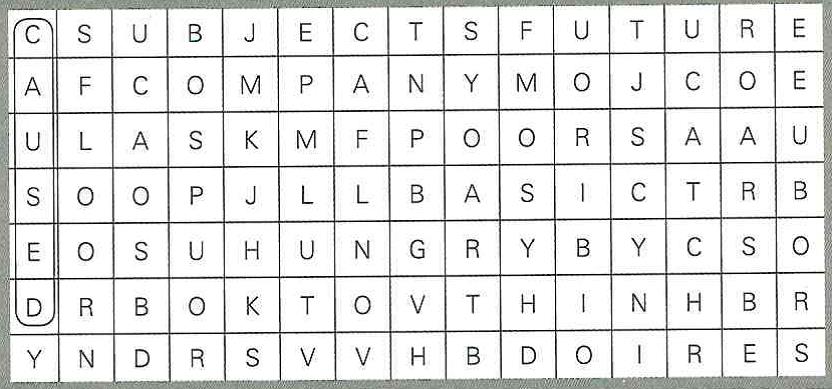
ex. 1. The rain (caused) many accidents.
2. Sue studies many -- at school.
3. Take off your wet clothes. You'll -- a cold.
4. I'd like something to eat. I'm --.
5. She fell on the -- and hurt her arm.
6. Many models today are too --.
7. Peter's family didn't have much money. They were --.
8. He just started learning English. He has a -- vocabulary.
9. My sister works for a computer in -- Beer Sheva.
10. In the -- I want to travel to New Zealand.
c. Circle the correct answer to show you understand the meaning of the words in brackets.
.הקיפו את התשובה הנכונה כדי להראות שאתם מבינים את פירוש המילים שבסוגריים.
ex. 1. Millions of people live in (poverty). Their lives are --.
(a) difficult, b. easy, c. simple
2. Small children have lots of (energy). They love to --.
a. run around, b. watch TV, c. draw
3. The fridge is almost (empty). We have -- food in the fridge.
a. a lot of, b. some, c. no
4. When you ride a bike without a helmet you are (in danger) of getting hurt. --.
a. Don't worry!, b. Think about it!, c. Don't do it!
5. We could see the -- from the (roof) of our house.
a. bright stars, b. living room, c. stairs
6. My school is (nearby). I -- see it from my house.
a. can't, b. never, c. can
7. A (number of) people came to the meeting. There --.
a. were three people, b. was one person, c. were a hundred people
8. They have no (electricity) so they don't have any --.
a. lights, b. food, c. water
*46*
d. Circle the correct words to complete the email.
הקיפו את המילים המתאימות כדי להשלים את האימייל.
Hi Adar,
Greetings from India! What's up?
I'm in Bihar, an area in the north of India. I am working with an (organization) / population that helps the local people. Many of them are escaping / suffering from hunger and poverty / clothing. Many children have to work because they are very poor / thin and their parents can't afford / appear to send them to school. The families also need the extra money the children earn to buy food.
We organized a future / programme so that children can go to school and also work among / nearby. At school, the children get a meal and some money to help their families. The programme is a great bill / success, and now the children go to school much more than they used to.
Please write soon!
Liat
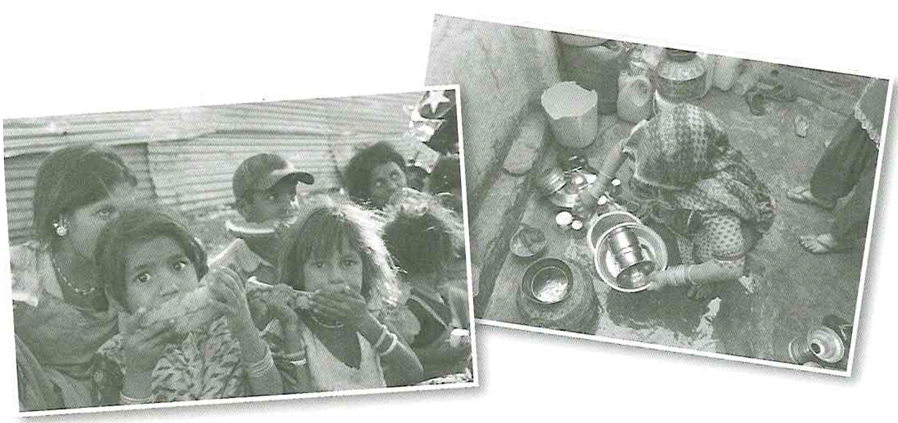
e. Answer the questions about yourself. Pay attention to the words in brackets. Write complete sentences.
ענו על השאלות על עצמכם. שימו לב למילים שבסוגריים. כיתבו משפטים שלמים.
ex. 1. What would you like to do in the (future)?
I would like to be a firefighter.
2. When do you have more (energy) - in the morning or in the evening? --.
3. Where do you buy most of your (clothing)? --.
4. What do you like to eat when you are (hungry)? --.
5. What do you do when you (catch a cold)? --.
6. What's the population of your town or city? --.
*47*
f. British English and American English
f. 1. Match the expressions with the same meaning in British English and American English. Use your Glossary to help you.
הקיפו את הביטויים שיש להם אותו פירוש באנגלית בריטית ובאנגלית
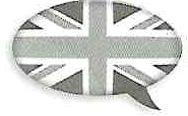
1. primary school
2. year one
3. break
4. secondary school
5. headmaster
American English
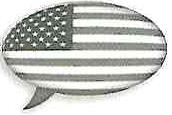
-- b. high school
-- c. first grade
-- d. principal
ex. 1. e. elementary school
f. 2. Are the words in brackets in British English or American English? Write B (British English) or A (American English. Then circle the correct answer in the second sentence.
האם המילים שבסוגריים הן באנגלית בריטית או אמריקאית? כיתבו B לאנגלית בריטית ו-A לאנגלית אמריקאית. לאחר מכן, הקיפו את התשובה הנכונה במשפט השני.
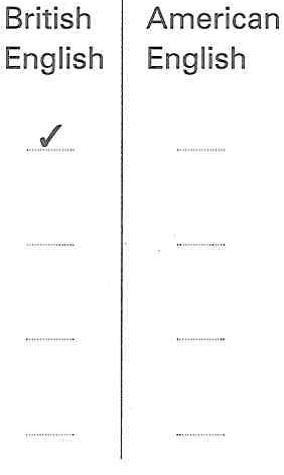
ex. 1. My brother is in primary school. B
He is in (year one) / first grade.
2. She is in the (12th grade). --
She'll graduate from high school / secondary school in June.
3. He teaches in the (secondary school) in the neighborhood. --
He's also the headmaster / principal.
4. This is my first year in high school. --.
I'm in the 10th grade / year ten.
כיתבו את המילים הנכונות באנגלית בריטית ואמריקאית מתחת לכל תמונה.
truck / biscuits / sweets / apartment / flat / lorry / cookie / candies
1. ממתקים
ex. British English: sweets
American English: --
2. דירה
British English: --
American English: --
3. עוגיות
British English: --
American English: --
4. משאית
British English: --
American English: --
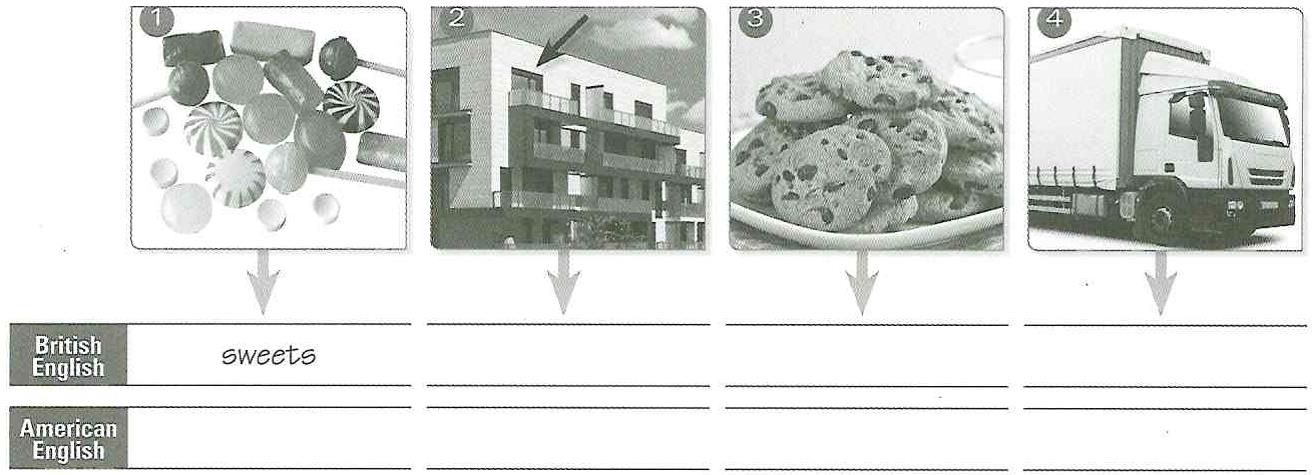
*48*
Part 3 - What a Waste! - student's book. page 49, exercise a.
Reading
New words
a. Write the words below next to their meaning. If you do this correctly, the words will be in alphabetical order.
כיתבו את המילים שלמטה ליד הפירוש שלהן. אם תעשו זאת נכון, המילים יופיעו לפי סדר האלפבית.
modern / encourage / market / explain / according to / ads / another / behavior / by the time / hotel / customer / Can you believe…?
1. לפי - according to
2. פרסומות --
3. נוסף, אחר --
4. התנהגות --
5. עד ש... --
6. אתה מאמין לזה? --
7. לקוח --
8. לעודד --
9. להסביר --
10. מלון --
11. שוק --
12. מודרני, חדיש --
13. אחוז - percent
14. צלחת --
15. מנה --
16. מחיר --
17. נכון --
18. צורה --
19. מידה, גודל --
20. לאחסן --
21. מתאים --
22. לזרוק לפח --
23. בזבוז, לבזבז --
*49*
b. Find at least two words in exercise a. that are connected to:
מיצאו לפחות שתי מילים או שני ביטויים מתרגיל a שיש להם קשר ל:
1. shopping: ads, --
2. eating: --
Words, words, words - after student's book, page 52
a. 1. Write T (true) or F (false) for each sentence.
כיתבו T (נכון - true) או F (לא נכון - false) ביחס לכל משפט.
ex. T 1. When something is modern, it is new.
-- 2. A customer is a person who sells something.
-- 3. A person's behavior is the way they act.
-- 4. A plate is something you use to drink from.
-- 5. When something is suitable, it is right for someone or something.
Correct the false sentences in exercise a.1.
תקנו את המשפטים הלא נכונים בתרגיל a.1..
התאימו כל משפט לתמונה. (היעזר במנחה)
א. אישה רואה בחלון רוואה
Big sale on all summer shoes!
50 percent off on second pair.
ב. אמא מביטה בבנה המצחצח שיניים עם ברז פתוח.
ג. מוכר מציע חולצות לנער
ד. מורה ותלמידה מול לוח עם נוסחאות מתמטיות.
ה. תמונה של לפני 100 שנה צלחת אחת, בהשוואה לתמונה עכשווית בה שולחן ערוך עם צלחות אוכל רבות.
ו. אדם מוכר בלונים, מולו אב ובן.
-- 1. Can you believe it? Today people eat much more than in the past.
-- 3. It's easier when you explain the problem to me.
-- 4. Read the ad carefully.
-- 5. We have different sizes.
-- 6. Don't waste water!
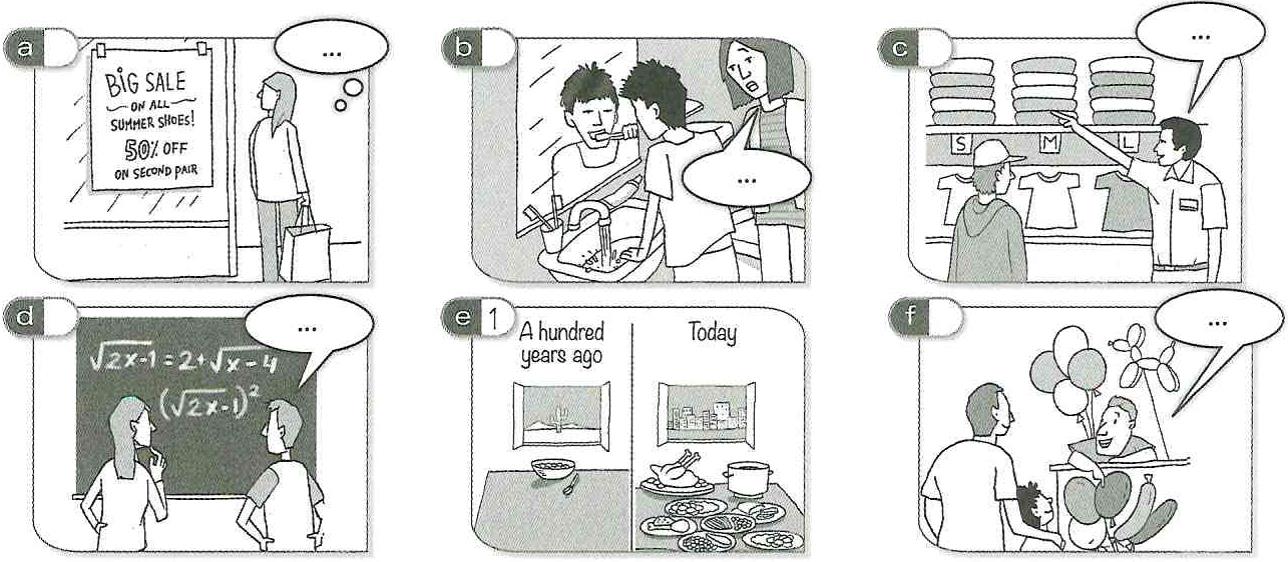
*50*
c. 1. Complete the sentences with the words below. There are two words you don't need.
השלימו את המשפטים עם המילים שלמטה. ישנן שתי מילים מיותרות
price / throwaway / encourages / market / Can you believe it?
right / store / hotel / customer / another
ex. 1. Can you believe it? My neighbor won a million shekels.
2. The store is giving a free gift to every --.
3. Where can I -- all the things I bought for the party?
4. People -- billions of plastic bags every year.
5. My family always -- me in everything I want to do.
6. An outdoor -- is often less expensive than a supermarket.
7. I'm still very thirsty. Please may I have -- glass of water?
8. Which -- did you stay at when you went to Haifa?
c. 2. Write a sentence with each of the 2 words you didn't use in exercise c.1. --
כיתבו משפט עם כל אחת משתי המילים בהן לא השתמשתם בתרגיל c.1..
תארו לעצמכם שאתם מלצרים במסעדה. כיתבו שלושה משפטים שמתארים את התמונה. השתמשו במילים שלמטה.
תמונה של שולחן עם שאריות אוכל ושתיה וצלחות ריקות וחצי מלאות.
waste / plate / hotel / Can you believe... ? / percent / throw away / customer / right / by the time / portion / according to / behavior / size / suitable
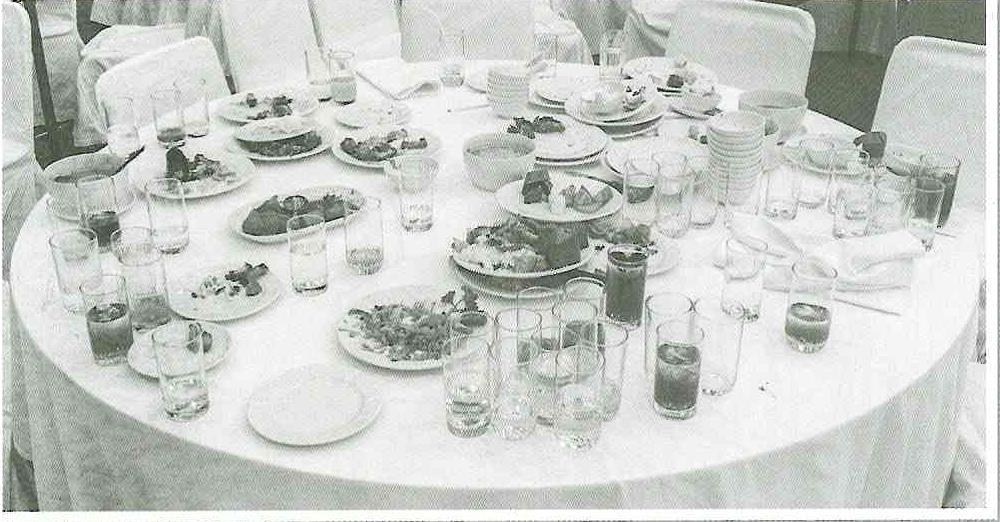
ex. 1. Can you believe it? The customers left so much food.
2. --.
3. --.
4. --.
*51*
Language - Modals and Semi-modals - after student’s book, page 54
a. Circle the correct answer.
הקיפו את התשובה הנכונה.
ex. 1. I think I (should) / aren't able to buy a new phone. It doesn't work well.
2. You mustn't / should shout at me. Talk softly if you want me to listen.
3. My friends and I must / might go to a movie tonight.
4. I have to / could be home in an hour. My parents are waiting for me.
5. Cyclists must / are able to wear helmets.
6. You could / shouldn't feel bad about what happened.
b. Complete the sentences with the words below. Use each word once.
השלימו את המשפטים עם המילים שלמטה. השתמשו בכל מילה פעם אחת.
can / could / must / have to / should / can't / couldn't / mustn't / don't / have to / shouldn't
ex. 1. I want to learn French. (Can) you teach me?
2. He -- cross the road at the traffic lights.
3. It's late. I -- go home.
4. People -- hear as well as dogs.
5. You -- stay out in the sun too long.
6. We have a big test tomorrow. -- we study together today?
7. You -- buy any snacks for the party. We have enough.
8. We -- sleep last night. Our neighbors were making too much noise.
9. You -- eat a lot of junk food.
10. There's a test tomorrow. I think I -- study now.
כיתבו משפט לכל תמונה. השתמשו ב-modal / semi modal המתאים ובמילים שלמטה.
waste good food / stay home and study / hear what her friend was saying / lend his friend some money / have fast food for lunch
תמונות
1. מרק חושב על מזון מהיר: should / shouldn’t
2. פרד מול קופת כרטיסים עם כיסים ריקים: can / can’t
3. עדן זורקת אוכל לפח אשפה: must / mustn’t
4. אלנה מדברת בטלפון עם חברה לגבי בחינה: has to / doesn’t have to
5. מסיבה, שתי חברות מנסות לשוחח: could / couldn’t

ex. 1. Mark shouldn't have fast food for lunch every day.
2. Fred --.
3. Eden --.
4. Alana --.
5. Sheli --.
*52*
d. Write at least three questions with the words in the lists below. Then answer the questions.
כיתבו לפחות שלוש שאלות עם המילים שבקבוצות למטה.. לאחר מכן, ענו על השאלות.
a. you / your sister or brother / your friend / your parents
b. can / should / must / able to / have to
c. wash the dishes / ride a bike / tidy the house / read more books / take out the garbage / prepare supper
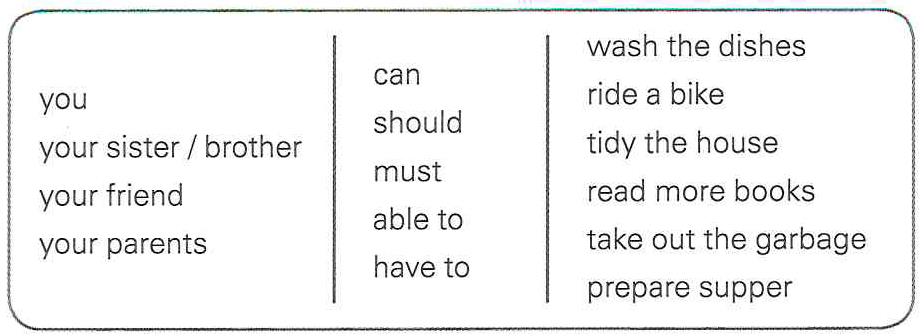
ex. 1. Does your brother have to wash the dishes? Yes, he has to wash the dishes.
2. --? --.
3. --? --.
4. --? --.
5. --? --.
e. Different teenagers posted their problems on an online site. Write a solution for each teenager's problem. Use the modals and semi-modals below.
בני נוער שונים כתבו פוסטים באתר אינטרנט על הבעיות שלהם. כיתבו פתרון לכל בעיה. השתמשו ב- modals וב- semi-modals שלמטה.
can - can't / should - shouldn't / have to - don't have to / may - may not / must - mustn't
Tom: I'd like to be able to play the guitar.
Carla: I'm always late for school.
Peter: Some kids in my school bully me.
Joe: I want to buy a surfboard. I need some extra money.
Anbar: I'm in a new school and it's hard for me to make friends.
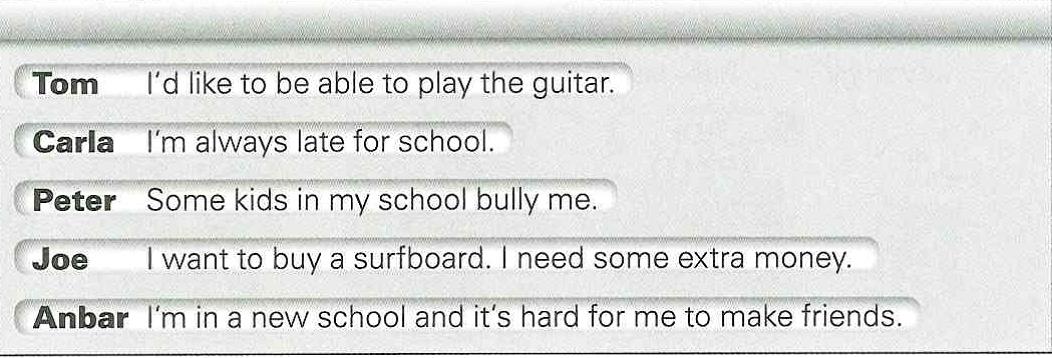
ex. Tom can take guitar lessons.
Carla --.
Peter --.
Joe --.
Anbar --.
*53*
Writing - Give advice - after student’s book, page 56, exercise d.
a. Circle the topic sentence for each topic below.
הקיפו את משפט הנושא לכל נושא שמצוין למטה.
ex. 1. Topic: Camping
a. The kids always bring their guitars.
(b.) Camping is a very popular outdoor activity.
c. It's fun to sit around a campfire.
2. Topic: Dancing
a. I love to dance.
b. Dancing is a popular hobby.
c. In the future, I'd like to dance in a dance company.
3. Topic: Wedding Anniversary
a. We are all preparing the foods our family loves to eat.
b. It's my grandparents' 50th wedding anniversary.
c. All of our aunts, uncles and cousins are coming.
b. Choose a topic sentence, a, b or c, for each short paragraph below.
בחרו משפט נושא a / b/ c לכל פסקה קצרה שלמטה.
ex. 1. Fast food isn't good for you. Healthy foods, like fruit and vegetables, make you feel good all day.
(a.) Everyone should eat healthy food.
b. People should not eat meat.
c. Students should buy lunch at school.
2. I love the summer vacation because I am free. I don't have to get up early. I can sleep as long as I like.
a. I never work in the summer.
b. The summer vacation is my favorite time of the year.
c. The summer vacation is boring.
3. It's important to drink at least 10 glasses of water a day. Water helps our body work properly.
a. People should not drink and eat at the same time.
b. Fresh water tastes good.
c. Drinking water is important for our health.
*54*
c. 1. Read what these teens say about what they need to buy for a campfire. Circle the modals or semi-modals or the expressions of advice.
קיראו מה בני נוער אלה אומרים על מה שהם צריכים לקנות בשביל מדורה. הקיפו את ה- modals או ה-semi-modals או הביטויים שנותנים עצה.
ex.
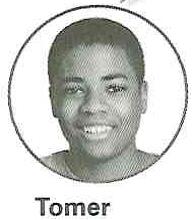
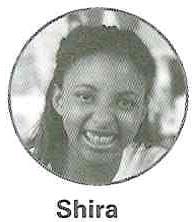
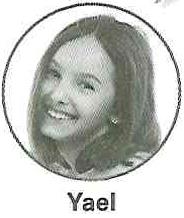
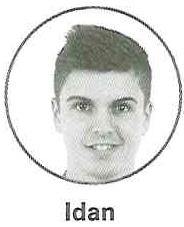
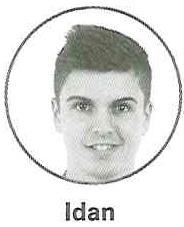
c. 2. Answer the questions about the teens' ideas in exercise c.1.
ex. 1. What does Tomer suggest they buy?
Tomer suggests they buy marshmallows.
2. What advice does Yael give? --.
3. What does Shira think they have to do? --.
4. What does Idan think they should buy? --.
3. Give advice to the teens in exercise c.1. about what else they need or what they should buy. Complete the sentences.
תנו עצה לבני הנוער שבתרגיל c.1. על מה שהם צריכים או מה שכדאי להם לקנות. השלימו את המשפטים.
ex. 1. It’s a good idea to buy some snacks.
2. What about --?
3. They have to --.
4. Why don't they --?
5. How about --?
*55*
Part 4 - Story: The Dinner Party - Student's book, page 57, exercise a.
New Words
Write the words below next to their meaning. If you do this correctly, the words will be in alphabetical order.
כיתבו את המילים שלמטה ליד הפירוש שלהן. אם תעשו זאת נכון, המילים יופיעו לפי סדר האלפבית.
a bit / lips / bowl / hardly / crawl / guest / fear (ח)/ character / expression / disagree / bored / have something on your mind / scare (v) / long gone / faint / daring / compliment / attacking (n) / instinct / hunting (n) / move a muscle / delicate
1. קצת - a bit
2. תקיפה --
3. משועמם --
4. קערה --
5. אישיות, דמות
6. מחמאה --
7. לזחול --
8. נועז --
9. עדין --
10. לחלוק על, לא להסכים --
11. הבעה --
12. להתעלף --
13. פחד --
14. אורח --
15. בקושי --
16. משהו מטריד אותך --
17. ציד --
18. אינסטינקט, חוש טבעי --
19. שפתיים --
20. הלך / חלף מזמן --
21. לזוז, להזיז שריר --
22. להפחיד --
*56*
sight / turn (v) / warn / wide / scream (v) / slam / slide (v) / staff
23. לצרוח, לצעוק - scream
24. מראה --
25. לטרוק --
26. להחליק, לגלוש --
27. צוות --
28. לפנות --
29. להזהיר --
30. רחב --
b. Imagine you saw a dangerous snake in your living room. What would you do? Find at least 2 words or expressions in exercise a.
תארו לעצמכם שראיתם נחש מסוכן בחדר שלכם. מה הייתם עושים? מיצאו לפחות שתי מילים או שני ביטויים בתרגיל a.
Vocabulary practice - after student's book, page 60, basic understanding
a. Circle the correct answer according to the story "The Dinner Party" on pages 58-59 of the student's book. Pay attention to the words in brackets.
הקיפו את התשובה הנכונה. אתם יכולים להיעזר ב- The Dinner Party בעמודים 58-59 בספר הלימוד. שימו לב למילים שבסוגריים.
ex. 1. The army officers (disagree) with Alison. They think that women are too delicate to --.
a. do household chores. (b.) deal with dangerous situations.
2. Alison (turned) to talk to the army officers because she --.
a. wanted to be polite., b. was bored listening to the adults.
3. Mrs. Wynnes' (lips) moved only a little so that the other people wouldn't --.
a. understand what she was saying., b. see her mouth full of food.
4. Mr. Stone told the (guests) not to move a muscle, because he --.
a. wanted to see if they could sit quietly., b. was afraid the cobra would bite them.
5. Mr. Stone (turned) and slammed the porch door shut when he realized --.
a. there was a snake in the room., b. the snake was outside.
6. When the snake (crawled) over Mrs. Wynnes' foot she was very --.
a. calm., b. scared.
7. In the end, the most daring (character) was --.
a. Mrs. Wynnes., b. Mr. Stone.
*57*
b. Match the sentences in A to the sentences in B. Pay attention to the words in brackets.
התאימו את המשפטים ב-A למשפטים ב-B. שימו לב למילים שבסוגריים.
A
1. Her eyes were (wide) open.
2. I can (hardly) swim.
3. I'll have (a bit) of that salad.
4. The (expression) on your face is strange.
5. Paul (has something on his mind).
6. His first (instinct) was to run for help.
7. This vase is very (delicate).
8. Ria received (compliments) on her book
B
-- a. I should take swimming lessons.
ex. 1. b. She looked very surprised.
-- c. I wonder what he is thinking.
-- d. I just want a small taste.
-- e. I don't know what you're feeling.
-- f. Hold it carefully.
-- g. People enjoyed reading it.
-- h. But he waited till the police arrived.
c. 1. Complete the sentences with the words below.
השלימו את המשפטים עם המילים שלמטה.
bowl / crawl / warning / guests / sight / disagreed
ex. 1. I always have a (bowl) of soup for supper.
2. We usually have -- for dinner on Friday night.
3. Most babies -- before they walk.
4. She has a problem with her -- so she wears glasses.
5. Susie didn't like my idea. She -- with me.
6. I'm -- you, the chili is very spicy!
c. 2. Complete the sentences with the words below.
השלימו את המשפטים עם המילים שלמטה
screamed / attacking / long gone / staff / slide / daring
ex. 1. The thief was (long gone) by the time the police arrived.
2. Unlock the door and it will -- open easily.
3. A large -- of nurses work in the hospital.
4. Don't frighten the snake into -- you.
5. Jodi -- when she saw the rat.
6. It was very -- of Liat to go bungee jumping.
d. Complete the sentences about yourself. Pay attention to the words in brackets.
השלימו את המשפטים על עצמכם. שימו לב למילים שבסוגריים.
ex. 1. When I'm hungry, I have a (bowl) of cornflakes with milk and banana.
2. When I'm bored, I usually --.
3. I have a (fear) of --.
4. My favorite movie (character) is -- because
5. I think that (hunting) animals is --.
6. Something (daring) I did was --.
*58*
Unit 2 - Review - after student’s book, page 61
Vocabulary
a. Circle the correct answer. Pay attention to the words in brackets. Then add another correct answer of your own.
הקיפו את התשובה הנכונה. שימו לב למילים שבסוגריים. לאחר מכן, הוסיפו תשובה נכונה נוספת משלכם.
ex. 1. You shouldn't waste this (food).
a. sight, (b.) bread, c. reasons, d. (fruit)
a. a plate, b. a bill, c. a roof, d. --
3. My mom (prepared) this.
a. soft drinks, b. lips, c. a traditional meal, d. --
4. This can be (spicy).
a. salt, b. fruit, c. beans, d. --
5. This is (frozen).
a. ice cream, b. a compass, c. clothing, d. --
b. Circle the correct answer.
הקיפו את התשובה הנכונה.
ex. 1. Israel, Jordan and Egypt are countries in the West / (Middle East).
2. This cake tastes delicious. It is so empty / fresh.
3. We caused / prepared a big family meal for the festival.
4. The bowl / plate is full of milk.
5. I didn't eat breakfast. I'm hungry/ thin.
6. We need to buy some food. The fridge is almost empty / cold.
7. I don't live far from my school. It is hardly / nearby my home.
8. There were no chairs in the room so we sat on the floor / guest.
9. The population / organization of Israel is over 7 million people.
10. Be careful with those plants. They are very delicate / daring.
*59*
c. Complete the sentences with the words below.
השלימו את המשפטים עם המילים שלמטה.
traditional / catch / energy / expert / caught / fresh
ex. 1. I don't feel well. I think I (caught) a cold.
2. These -- flowers smell like perfume.
3. I don't have the -- to go out. Let's stay home and watch TV.
4. The dancers wore -- dance costumes in the festival.
5. My brother is a great cook. He's an -- in the kitchen.
6. She should take off her wet clothes or she will -- a cold.
Grammar
d. Circle the correct answer.
הקיפו את התשובה הנכונה.
ex. 1. Olive oil is healthy /(healthier) / healthiest than butter.
2. The portions in many restaurants are too large / larger / largest.
3. I think mangoes are the sweet / sweeter / sweetest fruit in the world.
4. In your opinion, which is tasty / tastier / as tasty as - granola or cornflakes?
5. One of the common / more common / most common foods in the world is rice.
e. 1. Circle the correct modal or semi-modal to complete each sentence.
הקיפו את ה-modal או semi modal המתאים כדי להשלים כל משפט.
ex. 1. What do you think? May / (Should) l buy the smaller or the larger size sweater?
2. Can / Must I have Dan's cellphone number, please?
3. I'm too full. I may not / can't eat any more food.
4. Anna can / may meet us, but I'm not sure. She'll call to let me know.
5. You don't have to / mustn't forget to phone me tomorrow.
6. I can't stay out late. I am able to / have to be home by 10 o'clock.
7. You mustn't / don't have to call before you come to my house. I'm always happy to see you.
8. Yesterday my mom didn't have to / couldn't drive me to school. Our car was in the garage.
e. 2. Translate the first two sentences in exercise e.1. into your language. How are these sentences different from English? --.
תרגמו את שני המשפטים הראשונים מתרגיל e.1. לשפה שלכם. באיזה אופן המשפטים שכתבתים שונים מאנגלית?
*60*
Writing
f. Choose a topic sentence for each of the paragraphs below. There are two more topic sentences than you need.
בחרו משפט נושא לכל אחת מהפסקאות שלמטה. ישנם שני משפטי נושא מיותרים.
Topic sentences
1. Shopping with Dad is always fun.
2. The World Food Programme is really important.
3. Fruit and vegetables are fresher at the market than at the supermarket.
4. Many people all over the world die of hunger.
5. My friend decided to become a vegetarian.
Paragraphs
ex. 1. The World Food Programme is really important.
This programme fights hunger around the world. It feeds more than 80 million people in 75 different countries every year. Seventeen million children receive meals at school every day. The money for food comes from governments, organizations and people who want to fight hunger.
2. --.
She says that she doesn't like the taste of meat. She believes that eating meat isn't healthy. She is also against the killing of animals for food.
3. --
My dad and I go shopping for food at the market every week. Dad loves to buy all the fresh fruit and vegetables he can carry. I tell him it's a good idea to buy only what we need. In the end, we always buy too much food and I have to carry too!
g. Read the sentences. Then use the expressions below to give advice. Write complete sentences.
קיראו את המשפטים. לאחר מכן, השתמשו בביטויים שלמטה כדי לתת עצה. כיתבו משפטים שלמים.
Why don't you …? / It's a good idea ... / How about …? / What about …? / You should …
ex. 1. “I'm thinking of becoming a vegetarian.”
You should eat lots of beans and vegetables.
2. “My sister and I argue all the time.” --.
3. “It's hard for me to wake up in the morning.” --.
4. “I'd like to make some new friends.” --.
*61*
Review - Units 1-2, after student’s book, page 63
Circle the correct answer.
הקיפו את התשובה הנכונה.
Vocabulary
ex. 1. What are you thinking about? Do you --?
a. believe it, b. do your best, c. have something on your mind
2. I love ice cream, -- chocolate chip ice cream.
a. especially, b. nearby, c. fortunately
3. “I don't like to compete.” “--.”
a. Me, too., b. So do I., c. Me, neither.
4. When she got home, she -- that she didn't have her key.
a. realized, b. disagreed, c. combined
5. Don't -- the left-over food. We can finish it tomorrow.
a. throw away b. prepare, c. lose
6. We want to talk about the problem -- ourselves.
a. not only, b. among, c. rather than
7. You should -- this hummus. It's delicious.
a. taste, b. warn, c. guess
8. Millions of young children die of -- every year.
a. poor, b. energy, c. hunger
9. Let's have a meeting with all the --.
a. staff, b. subjects, c. portions
10. The food in the freezer is --.
a. empty, b. modern, c. frozen
Grammar
ex. 1. He -- games on the computer all the time.
a. playing, b. play, (c.) plays
2. Alex and Ruthie -- like trance music.
a. don't, b. doesn't, c. aren't
3. How many hours a day -- you watch TV?
a. does, b. do, c. are
4. The soup -- delicious. May I have some more, please?
a. is tasting, b. taste, c. tastes
5. Can he -- the drums?
a. plays, b. play, c. playing
6. This is the -- bread I've ever eaten!
a. delicious, b. more delicious, c. most delicious
7. During a sale, prices are -- than usual.
a. cheap, b. cheaper, c. cheapest
8. Those shoes are too small. You -- buy them.
a. shouldn't, b. aren't able, c. have to
9. We -- go to the movies last night.
a. must, b. couldn't, c. are able to
10. I'm not sure, but Daoud -- study with us today. He will let me know later.
a. may, b. is able to, c. mustn't
*62*
Independent reading 1 - after student’s book, page 63
a. Read the article.
(השורות מחולקות וממוספרות לפי ספר הדפוס, מספר השורה יבוא בסוגריים בתחילת השורה)
Tasty Treats
(1) Israeli food is a mixture of different food
(2) cultures from countries far and wide. This is
(3) because when people came to live in Israel, they
(4) brought with them their special dishes.
(5) In the late 1800s, when Jews began coming to Jerusalem
(6) from the Balkans and countries under Turkish control,
(7) they brought us their favorite foods like sambousak,
(8) bourekas and vegetables filled with rice and meat. At the
(9) same time, people learned to eat schnitzel brought from
(10) Germany, gefilte fish and kugels from Poland and borsht
(11) and herring from Russia.
(12) Iraqi, Yemenite and Kurdish Jews who came to the
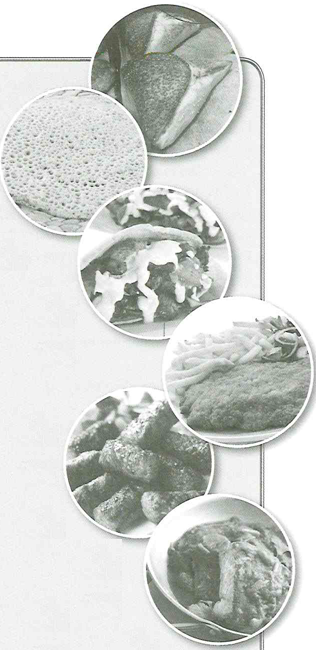
(14) Jewish dishes with them. Iraqi sabich and Yemenite
(15) jachnun served for breakfast on the Sabbath are good
(16) examples. Jews from Morocco taught us to love
(17) couscous, shakshouka, matbucha, and chraime - fish
(18) cooked in a spicy tomato sauce. In later years, Israelis learned
(19) to enjoy a kind of Ethiopian bread called injera and a vegetarian
(20) dish called tenat.
(21) The foods that people brought to Israel, together with the foods of the
(22) Arab communities living in Israel and the Middle East such as shwarma,
(23) kibbe, kebab, falafel, pita and hummus, have all mixed together to make
(24) Israel one of the best and most interesting places in the world to have a meal.
b. Answer the questions about the article.
1. Why is Israeli food a mixture of foods from different countries? (lines 1-4) --.
2. Who came to Israel in the 1800s? (lines 5-11) --.
3. Where do kugels come from? (lines 9-13) --.
4. Complete the sentence. (lines 18-20)
Injera is a kind of --.
5. Name two foods the Arab communities in Israel eat. (lines 21-24) --.
*63*
c. Circle the correct answer.
1. Where do bourekas come from?
a. France
b. Turkey
c. Austria
2. When do Iraqi Jews traditionally eat sabich?
a. on Friday night
b. on holidays
c. on Saturday morning
3. Which people brought injera to Israel?
a. Ethiopians
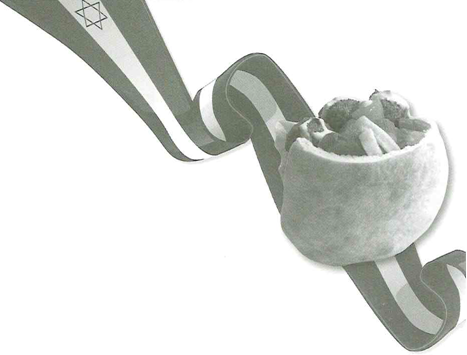
c. Russians
4. What is chraime?
a. a kind of fish
b. a dessert
c. a kind of rice
5. Where does kebab come from?
a. Russia
b. Germany
c. the Middle East
6. Which country does schnitzel come from?
a. Germany
b. Poland
c. Russia
What about you?
1. Of all the foods mentioned in the article, which is your favorite? --.
2. Which special foods do you eat at home? --.
*64*
Independent reading 2 - after student’s book, page 63
Read the article and complete the lists below with examples of the different foods.
(השורות מחולקות וממוספרות לפי ספר הדפוס, מספר השורה יבוא בסוגריים בתחילת השורה)
Street Food around the World
(1) Street food is a great way to taste what people eat around the world. You can
(2) buy street food at kiosks, food trucks and at food markets. Traditional street
(3) food tells us about the history and the culture of the place where it is made.
(4) Mexican
(5) Mexico City is one of the best places in the world to eat street food.
(6) Thousands of kiosks sell all kinds of interesting foods. Traditional
(7) Mexican food goes back hundreds of years. Examples are tortillas,
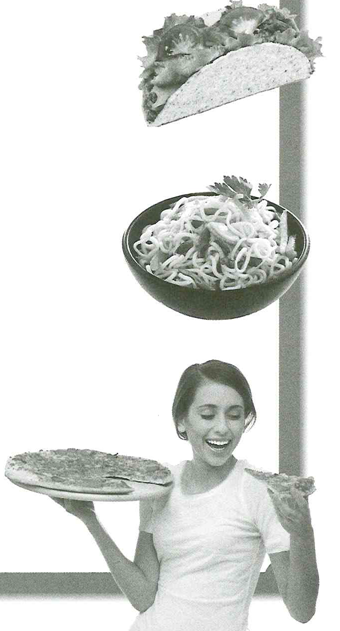
(9) portions (מנות) every day! Mexicans usually eat at home in the afternoons so
(10) they buy most of their street food in the mornings and late at night.
(11) Vietnamese
(12) Do you like noodles? If you do, you'll love Vietnamese food! The Vietnamese
(13) sometimes eat noodles for every meal. There are so many different
(14) kinds of noodle dishes, it's hard to decide which to choose. The most
(15) popular one is beef noodle soup. Many people stop to eat a big bowl
(16) of noodle and fried tofu soup on their way to work. They sit at a little
(17) kiosk with a small stove (תנור) on the street and enjoy their delicious meal.
(18) They also enjoy a bowl of noodle soup as a snack late at night. Although
(19) people also cook at home, eating street food is a way of life.
(20) Italian
(21) Italians are very proud of their traditional street food. It is tasty because it is
(22) always simple and fresh. A good example of this is the fried fish served in a
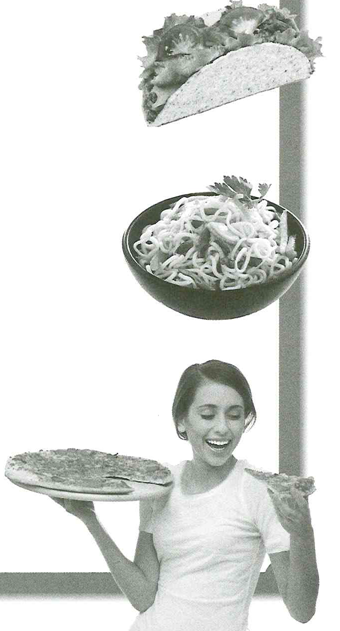
(24) there is suppli, or fried rice balls, one of the oldest
(25) street foods. And of course there is pizza. Italians
(26) believe there are only two kinds of pizza - Italian
(27) pizza and pizza in the rest of the world. They say that
(28) after eating pizza in Italy, people don't want to eat pizza
(29) anywhere else.
Mexican food: tortillas, --
Vietnamese food: --
Italian food: --

*65*

1. Name 3 places where you can buy street foods. (line 1-3). --.
2. What can you learn about a place from its traditional street food? (lines 1-3)
Tick (V) 2 things.
-- a. Its seasons
-- b. Its culture
-- c. Its history
-- d. Its weather
-- e. Its language
3. When do Mexicans usually buy most of their street food? --.
4. When do the Vietnamese eat noodles? --.
5. Where do Vietnamese people sit at night to eat their street food? --.
6. Complete the sentences.
a. Italian street food is tasty because it is --.
b. In Venice, people can buy -- to eat as they walk along the street.
7. a. Circle the correct answer, true or false.
Suppli is an example of new street food. True / False
b. Write the words from the article that helped you answer. --.
8. What do Italians think about their pizza? --.
What about you?
1. Would you like to taste any of the street food you read about? Explain why or why not. --.
2. Give 3 examples of street food that you enjoy eating in Israel. --.
*66*
*66*
Part 1 - Tweet to the Rescue!
reading - student's book, page 66, exercise a.
New words
Write the words below next to their meaning. If you do this correctly, the words will be in alphabetical order.
כיתבו את המילים שלמטה ליד הפירוש שלהן. אם תעשו זאת נכון, המילים יופיעו לפי סדר האלפבית.
advice / dirt / climb (v) / injury / continue / in order to / final / frightened / ground (n) / calm / lake / confused / around / event / connect / downhill
1. עצה - advice
2. בסביבה --
3. רגוע --
4. לטפס --
5. מבולבל --
6. לחבר, להתחבר --
7. להמשיך --
8. לכלוך --
9. מדרון --
10. אירוע, מאורע --
11. אחרון --
12. מבוהל, מפוחד --
13. אדמה, קרקע --
14. כדי ל- --
15. פציעה, פגיעה --
16. אגם --
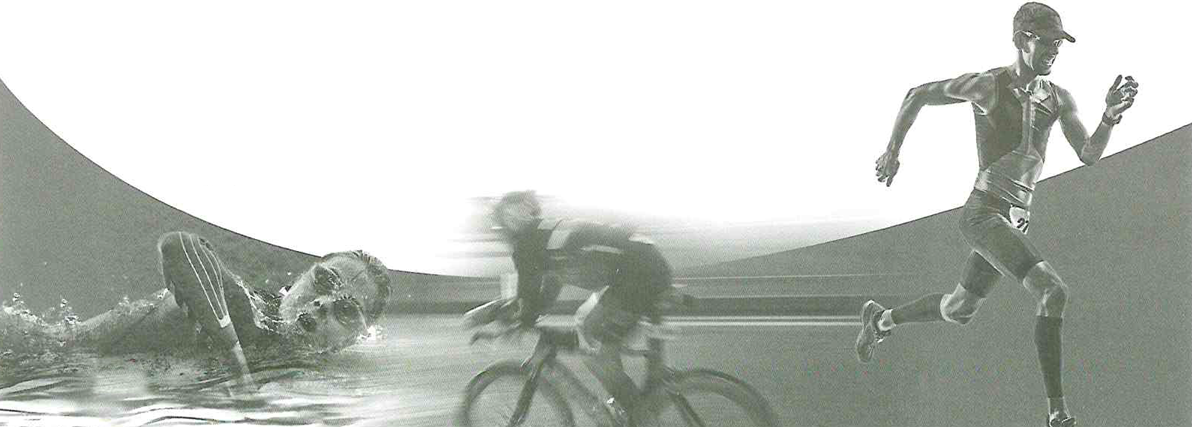
*67*
mountain / root / lost / sense of direction / strength / path / look back / woods / save (v) / within / manage / worried / serious / look back
17. להסתכל אחורה - look back
18. אבוד, תועה --
19. להצליח --
20. הר --
21. מסלול, שביל --
22. שורש --
23. להציל, לשמור --
24. חוש כיוון --
25. רציני, חמור --
26. כוח --
27. בתוך, תוך --
28. יערות --
29. דואג --
b. Find at least 2 words in exercise a. that are connected to:
מיצאו לפחות 2 מילים או שני ביטויים מתרגיל a שיש להם קשר ל:
1. the earth: ground, --
2: feelings: --
Student's book. Page 68, exercise f1
Complete the chart about Leigh's mini-triathlon.
ריק, First event, Second event, Final event
Sport, --, mountain bike ride, --
Distance, --, --, --
Place, --, woods, mountain paths

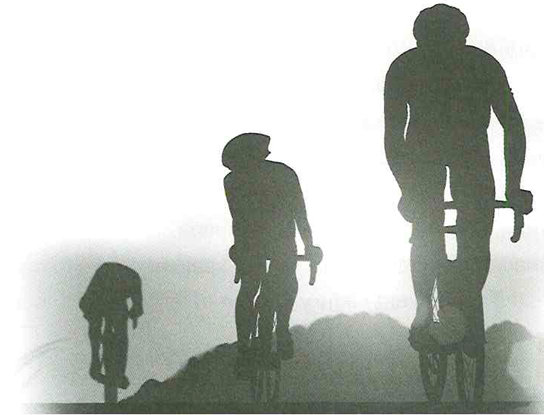
*68*
Words, words, words - after student’s book, page 69
התאימו כל תמונה למשפט. שימו לב למילים החדשות שבסוגריים. לאחר מכן, הוסיפו משפט נוסף.
תמונות:
1. 2 בחורות מטיילות בפארק
2. בחורים יושבים סביב מדורה
3. שני מטיילים על פסגת גבעה.
4. שני מטיילים מתלבטים באיזו דרך ללכת.
5. בחור מאזין דרך אוזניות למכשיר.
6. ילדים מחליקים על קרח
7. שלושה נערים על רפסודה מבולי עץ.
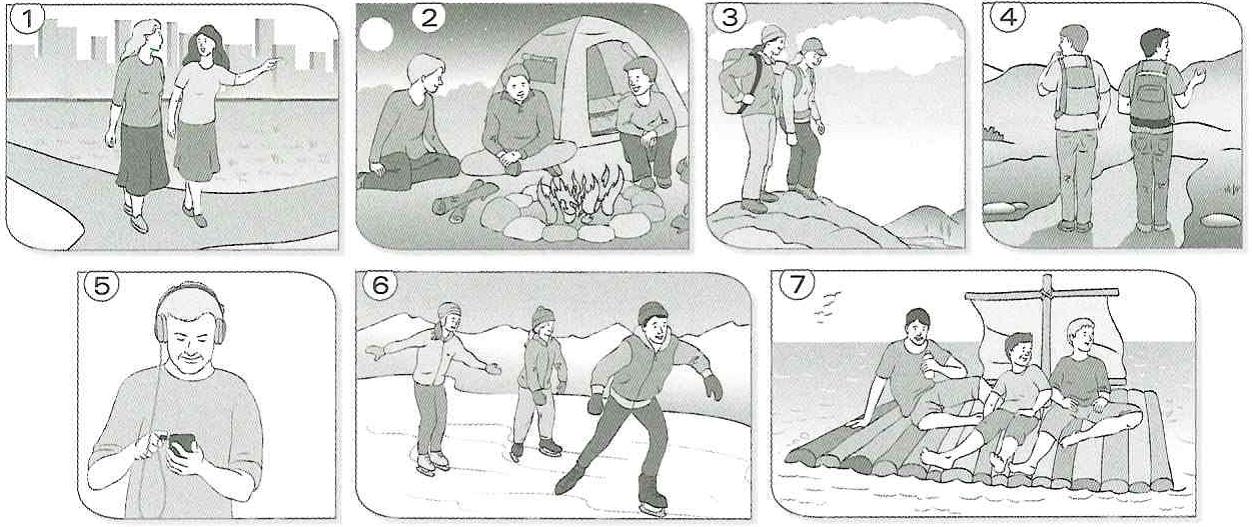
ex. -- a. They took the wrong (path). They didn't know which way to go.
-- b. The hikers (climbed) to the top of the hill. --.
-- c. They are ice-skating on the frozen (lake). --.
-- d. The sea is (calm) today. --.
ex. 1. e. Fatima showed her cousin (around) the park. --.
-- f. The teens sat on the (ground) next to the campfire. --.
-- g. Tal (connected) his earphones to his smartphone. --.
b. Circle the correct answer.
rהקיפו את התשובה הנכונה.
ex. 1. Ronaldo's goal continued / worried / (saved) the game.
2. She sets the alarm for 6 every morning because / in order to get to school on time.
3. After her illness, she slowly got her calm / character / strength back.
4. His older brother usually gives him good advice / cooperation / success.
5. After a long hike, we reached the top of the mountain / ground / path.
6. Don't worry about me! I'll connect / look back / manage.
7. On the confused / final / frightened day of the trip, I said goodbye to my friends.
8. The football player had a knee event / injury / sense of direction and couldn't play.
*69*
c. 1. Complete the sentences with the words below. There are 2 words you don't need.
השלימו את המשפטים עם המילים שלמטה. ישנן שתי מילים מיותרות.
frightened / serious / dirt / woods / advice / look back / worried / within / ground / manage
ex. 1. My teacher gave me some good advice.
2. The leaves fell slowly to the --.
3. Nina is -- she won't pass her test.
4. We drove along a -- road until we reached the farm.
5. My school is -- a 10-minute walk from my house.
6. We got lost walking in the --.
7. The cat was -- of the dog.
8. When my parents -- at their school days, they laugh.
2. Write a sentence with each of the two words you didn't use in exercise c.1. --.
כיתבו משפט עם כל אחת מהמילים בהן לא השתמשתם בתרגיל c.1..
d. Complete the sentences about yourself. Pay attention to the words in brackets.
השלימו את המשפטים על עצמכם. שימו לב למילים שבסוגריים.
ex. 1. My favorite (event) is The World Cup.
2. My (advice) to new students is --.
3. If I am (lost), I --.
4. I didn't see the (roots) of the tree, --.
5. We walked (downhill) --.
e. Imagine you fell from a kayak into a river. Write a short email to a friend about what happened. Use at least 4 of the words below.
תארו לעצמכם שנפלתם מהקיאק לנהר. כיתבו אימייל קצר בו אתם מספרים לחבר/ה על מה שקרה. השתמשו לפחות בארבע מהמילים שלמטה.
calm / injury / look back / continue / around / confused / serious / strength / frightened / save / worried / sense of direction
The river was very calm when I climbed into the kayak. --.

*70*
f. Phrasal verbs
f.1. Circle the correct answer.
ex. 1. When you look like someone, you --.
are good friends. (b.) look similar.
2. When you look after someone's dog while they are away, you --.
a. follow the dog everywhere, b. care for it
3. When you look back at something that happened in the past, you --.
a. remember it, b. do it again
4. When you look forward to something, you --.
a. feel happy it's going to happen, b. feel sad
5. When you look for something, it means you --.
a. know where it is, b. don't know where it is
f. 2. Read what each person said. Then answer the questions below.
קיראו מה אמר כל אחד מהאנשים. לאחר מכן, ענו על השאלות שלמטה.
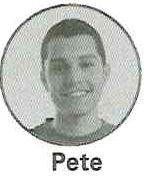
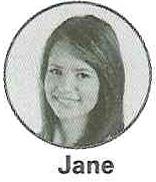
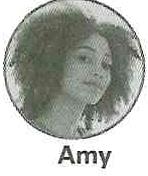
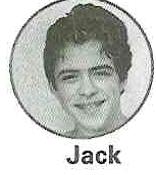
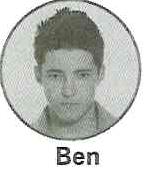
ex. 1. Who doesn't know where something is? Ben
2. Who reminds people of someone in the family? --
3. Who babysits? --
4. Who has good memories of the past? --
5. Who is excited about something that's going to happen? --
*71*
Language - Past simple - after student’s book, page 73
a. 1. Complete the list. Then circle the past simple form of the verbs in the puzzle.
השלימו את הרשימה. לאחר מכן, הקיפו את צורת ה- past simple של הפעלים בתפזורת.
Present Simple / Past Simple
ex. 1. catch - caught
2. say --
3. do --
4. give --
5. make --
6. see --
7. forget --
8. spend --
9. win --
10. stand --
11. leave --
12. think --
B S V G A V E K F
S P R S A W X S O
L E (C A U G H T) R
E N B I W O N O G
F T P D M K L O O
T H O U G H T D T
D Q S S I H D I D
U W W M A D E H N
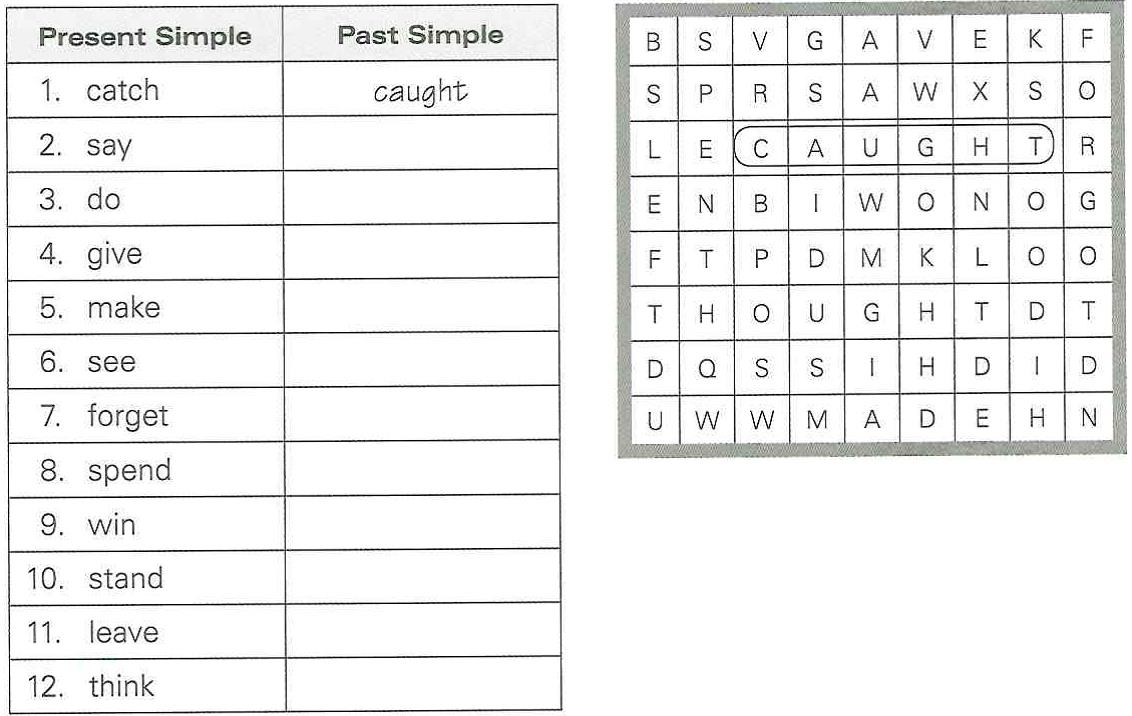
a. 2. Complete the sentences with the past simple form of the verbs in exercise a.1. Use a different verb in each sentence. There are four extra verbs.
השלימו את המשפטים עם פעלים בצורת ה- past simple מתרגיל a.1.. השתמשו בפועל שונה בכל משפט. ישנם ארבעה פעלים מיותרים.
ex. 1. We (caught) the six o'clock train to Haifa.
2. This past summer I -- a lot of time with my friends.
3. We -- in line for hours to get tickets for the festival.
4. I -- to bring my history book to class today.
5. I can't find my watch. I guess I -- it at the pool.
6. Did you hear what she -- before she left the room?
7. They -- the barbecue was great.
8. I -- a bad mistake in my math test.
a. 3. Write a sentence with each of the 4 verbs you didn't use in exercise a. 2. --.
כיתבו משפט עם כל אחד מארבעת הפעלים בהם לא השתמשתם בתרגיל a.2..
*72*
b. Complete the pairs of sentences with the positive and negative form of the past simple.
השלימו את זוגות המשפטים עם צורות החיוב והשלילה של ה-past simple.
ex. 1. take
I (took) your pen by mistake!
I (didn't take) your pencil.
2. buy
She -- a pair of earrings at the mall.
She -- a ring.
3. be
We -- with Elliot last night.
We -- with Liam.
4. come
I -- to the theater on time and waited ten minutes for you.
We agreed to meet at the theater at 8 p.m., but you --!
5. go
They -- to the movies on Tuesday.
They -- yesterday.
6. get
When Aliza -- home, everyone was asleep.
She -- home until after midnight.
c. Use the past simple to complete the questions in the dialogues. Pay attention to the words in brackets.
השתמשו ב-past simple להלשים את השאלות בשיחות. שימו לב למילים שבסוגריים.
ex. 1. Omar: When was your birthday?
Nadine: My birthday was (two weeks ago).
2. Natalie: When --?
Julie: We went to a movie (last night).
3. Yoav: Where --?
Yoni: The friends met (at the beach).
4. Tamar: What --?
Sara: My mom bought me (the bag).
5. Teacher: Where --?
Student: I left my homework in my (locker).
6. Lior: What --?
Karen: I wore my (black jeans) and (a T-shirt) to the party.
*73*
d. 1. Complete the news report with the past simple form of the verbs in brackets.
השלימו את הכתבה עם צורת ה- past simple של הפעלים שבסוגריים.
Sally's Challenge
Two years ago, the Smith family had (have) a terrible car accident.
When 15-year-old Sally Smith -- (wake) up in the hospital, the doctors -- (tell) her she wouldn't walk again.
At first, Sally -- (not want) to do anything and -- (feel) very sorry for herself. But then she -- (decide) she was going to live her life to the fullest. Sally -- (move) to another hospital where she -- (do) hours of exercises. She -- (not stop) and slowly she -- (become) stronger.
Last month Sally -- (ride) a special bike in a bike riding event to collect money for the hospital. Sally says she can't wait to do it again.
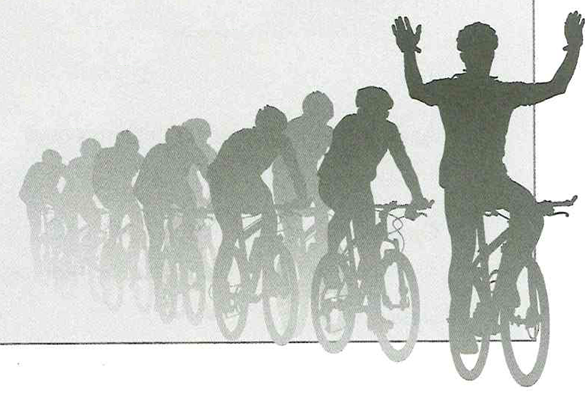
d. 2. Answer the questions. Write complete sentences.
ענו על השאלות. כיתבו משפטים שלמים.
ex. 1. What happened to Sally?
She was in a terrible car accident.
2. What did the doctors tell her? --.
3. What did Sally do at the hospital? --.
4. Why did Sally take part in the bike riding event? --.
d. 3. Write 2 questions you would like to ask Sally. Use the past simple. --.
כיתבו שתי שאלות שהייתם רוצים לשאול את סאלי. השתמשו ב- past simple.
ex. 1. What kind of exercise did you do?
2. --?
3. --?
*74*
Writing - A narrative - after student’s book, page 75, exercise b.
a. 1. Read the paragraph Oren wrote about a day he spent with his family. Label the parts with the words below.
קיראו את הפיסקה שכתב אורן על יום אותו בילה עם משפחתו. סווגו את החלקים לפי המילים שלמטה.
dosing sentence /opening sentence / details
a. 1. My family decided to spend a day in Jerusalem. When we arrived in the city, we
2. took a ride on the Light Rail. It was interesting to see Jerusalem's different neighborhoods. When we reached the Old City, we took a tour of the walls of the Old City. As you walk along the walls, you can see the whole city of Jerusalem. It was amazing. After the tour, we walked around the colorful market. I was sorry
3. when it was time to leave. What a great day!

1. --
2. --
3. --
a. 2. Answer the questions about Oren's day with his family.
ענו על השאלות על היום שבילה אורן עם משפחתו.
Opening sentence
1. Where did Oren's family spend their day? --.
Details
2. Find at least 3 adjectives Oren used in the paragraph. --.

תמונות:
א. הרכבת הקלה
They rode --.
ב. העיר העתיקה
They walked around --.
ג. השוק
They took a tour of --.
Closing sentence
4. How did Oren feel about leaving Jerusalem? --.
*75*
b. Read the 3 opening sentences below. Tick (V) 3 examples or details about each event.
קיראו את שלושת משפטי הפתיחה שלמטה. סמנו ב-V שלוש דוגמאות או פרטים על כל אירוע.
1. Opening sentence: My family spent a day at the Shefayim Water Park near Netanya.
ex. V. a. It's a great place to spend the day during the hot summer.
-- b. I am taking swimming lessons.
ex. V. c. The park has three large pools and twenty-two slides!
ex. V. d. There are pools for children and adults.
2. Opening sentence: My family spent a weekend at Mitzpe Ramon.
-- a. We slept in Bedouin tents on comfortable rugs.
-- b. One afternoon we took a jeep trip into the mountains.
-- c. We saw a great movie.
-- d. In the evenings we sat around a campfire under the stars.
3. Opening Sentence: I decided to volunteer at an animal shelter.
-- a. I go to the shelter once a week.
-- b. I work at the restaurant.
-- c. I clean the dog cages and give the dogs food and water.
-- d. I like to walk the dogs.
c. In the closing sentence of a narrative, you describe how you feel or felt. Which of these sentences can be a closing sentence? Tick V the 4 correct answers.
במשפט הסיום של תיאור אירוע אתם מתארים כיצד אתם מרגישים או הרגשתם. אלו מהמשפטים הבאים יכול להיות מפשט סיום? סמנו V ליד ארבע התשובות הנכונות.
ex. V. a. I can't wait to go again.
-- b. There is a big picnic area.
-- c. We went home, very tired, after a long and scary day.
-- d. I like going to the beach more than to the pool.
-- e. I will never forget that day.
-- f. I'm always sorry when the day ends.
-- g. I feel happy that I can help.
d. Imagine you spent a day out with your friends. Complete the sentences about the day.
תארו לעצמכם שביליתם יום בחוץ עם חבריכם. השלימו את המשפטים על אותו היום.
ex. 1. We decided to spend a day (together).
2. We went to --.
3. It was fun because --.
4. Afterwards we decided to --.
5. I was sad when --.
*76*
Part 2 - Say No to Bullying!
Reading - Student’s book, page 76, exercise a.
New words
Write the words below next to their meaning. If you do this correctly, the words will be in alphabetical order.
כיתבו את המילים שלמטה ליד הפירוש שלהן. אם תעשו זאת נכון, המילים יופיעו לפי סדר האלפבית.
account / contact (v) / deal with / blame (v) / depressed / connection / comment (n) / bully (n, v) / awful / be bullied / fear(v) / aware of / experience (n) / fault / bullying / follow / adult / control (v) / defend (v)
1. חשבון - account
2. מבוגר --
3. מודע ל- --
4. נורא --
5. לסבול מהתעללות --
6. להאשים --
7. בריון, להתעלל --
8. בריונות --
9. תגובה --
10. קשר --
11. ליצור קשר --
12. לשלוט --
13. להתמודד עם, לטפל ב- --
14. להגן על --
15. מדוכא --
16. חוויה --
17. אשמה --
18. לפחד --
19. לעקוב אחרי –
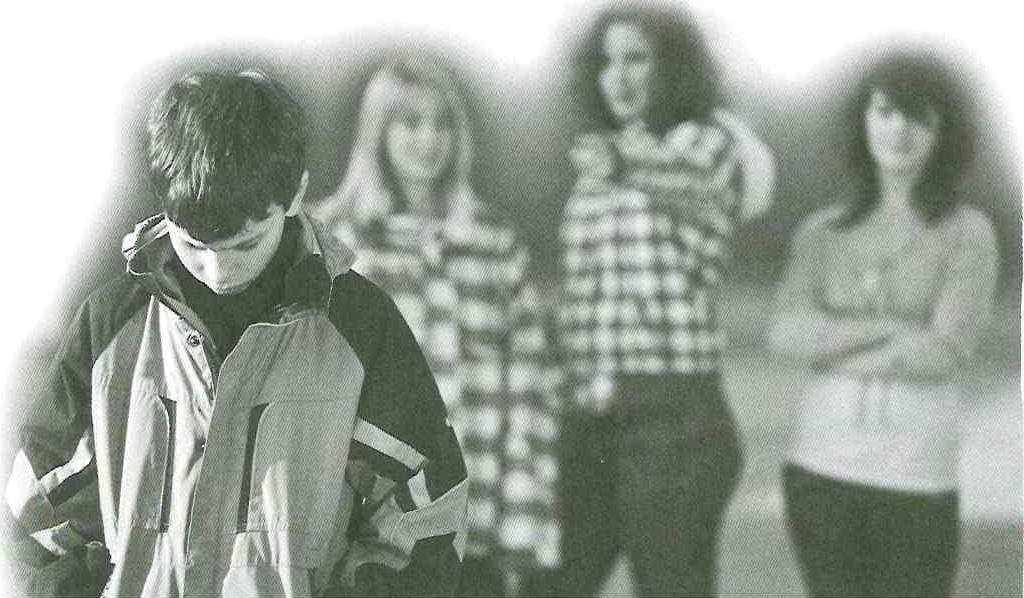
*77*
get rid of / social media / stress / shy / target / make fun of / survive / information / turn out / pick on / wonder / reply / turn to / victim
20. להיפטר מ- get rid of
21. מידע --
22. ללעוג, ל-, לצחוק על --
23. להיטפל ל- --
24. לענות --
25. ביישן --
26. רשתות חברתיות --
27. לחץ, מתח --
28. לשרוד --
29. מטרה --
30. לצאת (בסוף) --
31. לפנות ל.. --
32. קורבן --
33. לתהות, להתפלא --
b. Find at least 5 words in exercise a. that have a negative meaning:
מיצאו לפחות 5 מילים או שני ביטויים מתרגיל a שיש משמעות שלילית:
fear, --
Words, words, words - after student's book, page 80
a. Circle the correct answer to show you understand the words in brackets.
הקיפו את התשובה הנכונה כדי להראות שאתם מבינים את פירוש המילים שבסוגריים.
ex. 1. When Tim (commented), he wrote --.
a. a review, (b.) his opinion, c. a story
2. Maha (replied) to my --.
a. question, b. answer, c. experiment
3. When you go to the (coast), you go to --.
a. a city, b. the sea, c. a farm
4. The weather was (awful), it was very --.
a. bad, b. good, c. lovely
5. She -- her new school because she (was bullied) a lot the first few days.
a. loved, b. liked, c. hated
6. When something was your (fault), you did something --.
a. wrong, b. good, c. right
*78*
b. Circle the correct answer.
הקיפו את התשובה הנכונה.
ex. 1. It is wrong to deal with / turn out / (make fun of) other people.
2. No one controlled / survived / wondered the plane crash.
3. I can't hear you. The telephone connection / path / experience is bad.
4. Did you contact / manage / reply to Sharon's email?
5. She didn't break the window. Don't blame / connect / fear her!
6. You can find all the account / information / experience you need on the Internet.
7. When Fadel needs help, he looks back / picks on / turns to his parents.
8. The students felt a lot of bullying / directions / stress before the exam began.
9. Sue felt very bullied / confused / depressed when she couldn't go on the school trip.
10. A bus ticket for an adult / an event / a victim costs more than a ticket for a child.
c. 1. Circle the 2 words that can follow each verb in brackets.
הקיפו את 2 המילים שמתאימות לפועל שבסוגריים.
ex. 1. (be aware of): beauty / (a problem) / (danger)
2. (contact): a friend / a day / the police
3. (deal with): a question / people / a surprise
4. (get rid of): rain / clothes / garbage
5. (follow): a plan / a person / food
6. (control): someone / a situation / the weather
7. (defend): a victim / a target / an adult
c. 2. Answer the questions. Pay attention to the words in brackets. Write complete sentences.
ענו על השאלות. שימו לב למילים שבסוגריים. כיתבו משפטים שלמים.
ex. 1. Who or what can you (be aware of)?
I can be aware of the people around me.
2. Who can you (contact)? --.
3. Who or what can you (deal with)? --.
4. What can you (get rid of)? --.
5. Who or what can you (follow)? --.
6. Who or what can you (control?( --.
7. Who or what can you (defend)? --.
*79*
d. Complete the post Kim wrote and the replies she received with the words below. There is 1 extra word for each.
השלימו את הפוסט שכתבה קים ואת התגובות שקיבלה עם המילים שלמטה. ישנה מילה מיותרת אחת לכל תגובה.
1. fear / wonder / adult / shy
July 02, 2016, 07:00 p.m.
Kim: We're moving to a new city and I'm under a lot of stress. I'm -- and I don't make friends easily. I'm scared and I -- what starting a new school is going to be like. I'm feeling depressed and I'd like any suggestions you might have. Thanks.
2. turn to / information / deal with / follow / survive
July 02, 2016, 07:04 p.m.
Smile123: Be more positive. Lots of kids move to new places and they --! First you can -- the school counselor if you have any problems you have to --. Another suggestion is get -- about after school activities or clubs you can join. This meet new kids, and I'm sure you'll make new friends. Good luck!
3. bully / stress / experience / account / reply / aware of
July 02, 2016, 07:08 p.m.
DJ507: It's not easy to be the new kid on the block. Some kids might -- you to see how you react. Act like you aren't even -- them. If they post comments on your social media, --don't --. They just want your attention. I'm speaking from personal --.
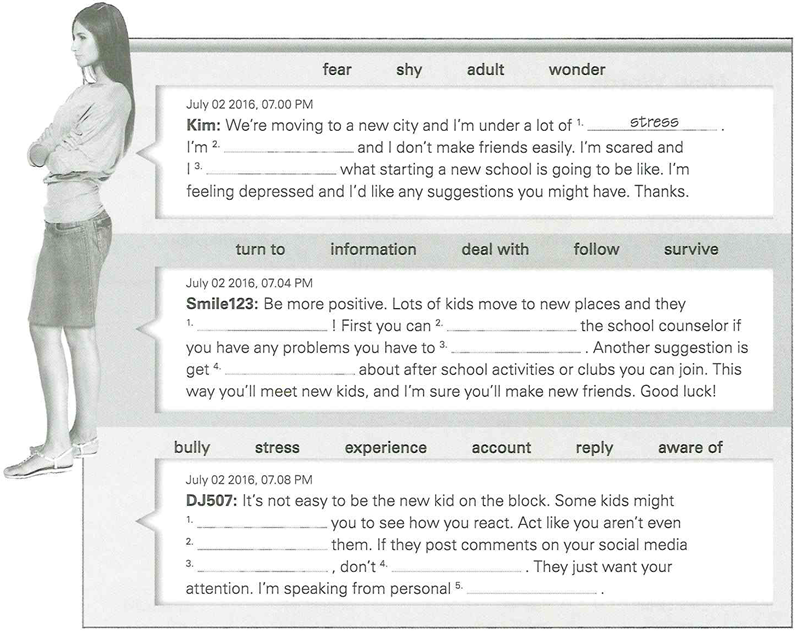
e. Answer the questions about yourself. Pay attention to the words in brackets. Write complete sentences.
ענו על השאלות על עצמכם. שימו לב למילים שבסוגריים. כיתבו משפטים שלמים.
ex. 1. Where can you find (information) about a band you want to see?
I can find information about a band online.
2. Name one thing you would like to do when you become an (adult). --.
3. What kinds of things do you do on (social media)? --.
4. What do you do when you are (depressed)? --.
5. Was there any (bullying) in your elementary school? Explain. --.
*80*
Part 3 - How Can I Help?

New Words
correctly / farm (n) / extra / health / army / fantastic / for example / destroy / agriculture / go backpacking / earthquake
1. חקלאות - agriculture
2. צבא --
3. (באופן) נכון) --
4. להרוס --
5. רעידת אדמה --
6. נוסף --
7. מופלא, נפלא --
8. חווה --
9. לדוגמה --
10. לעשות טיול תרמילאים --
11. בריאות --
service (n) / materials / set up / leader / technology / travel / project (n) / successful / shelter (n) / rebuild / leadership
12. מנהיג, אחראי - leader
13. מנהיגות, הנהגה --
14. חומרים --
15. פרוייקט --
16. לבנות מחדש --
17. שירות --
18. להקים --
19. מקלט --
20. מצליח, מוצלח --
21. טכנולוגיה --
22. לנסוע, לטייל --
*81*
b. Find at least 4 words in exercise a that could be a subject of a news report.
מיצאו לפחות ארבע מילים בתרגיל a שיכולות להיות נושא לכתבה בחדשות.
ex. earthquake, --
d. Read the questions below. Then listen again to the interview and answer the questions.
1. Why did Amit go to Nepal? --.
a. to volunteer
b. to go backpacking
c. to learn about Tevel b'Tzedek
2. Name 2 things farmers learn to do on the model farms. --.
3. What does Amit say about the model farms? --.
a. He was the first to volunteer there.
b. The project is very successful.
c. They need to set up more farms.
4. What else does Tevel b'Tzedek do to help Nepal's communities?
Choose the 2 correct answers.
Volunteers --.
a. teach women about health.
b. sell food in the markets.
c. give the people money.
d. teach women how to manage their money.
e. find jobs for the people.
5. What is the goal of Tevel b'Tzedek? --.
a. For Israelis to have a fantastic experience.
b. For people from Nepal to work in Israel.
c. To improve the people's lives in Nepal.
6. How does Tevel b'Tzedek help solve the problems in the villages since the earthquake? Complete the sentence.
They help the people build -- and --.
*82*
Words, words, words - after student’s book, page 83
a. Circle the correct answer to show you understand the meaning of the words in brackets.
הקיפו את התשובה הנכונה כדי להראות שאתם מבינים את פירוש המילים שבסוגריים.
ex. 1. I have some (extra) time. I have -- time than I thought.
(a.) more, b. the same amount of, c. less
2. How's your (health)? How do you --?
a. study, b. feel, c. know
3. The (service) at the restaurant was good. The waiter brought all the food --.
a. quickly, b. in an hour, c. slowly
4. Modern (technology) makes keeping in touch -- in the past.
a. harder than, b. the same as, c. easier than
5. Under her good (leadership), the team --.
a. didn't play, b. stayed home, c. won the gold medal
My sister studies (agriculture). She studies --.
a. sports, b. farming, c. the environment
b. Circle the correct word in each sentence. Then tick V the sentences that are about natural disasters.
הקיפו את המילה המתאימה בכל משפט. לאחר מכן, סמנו ב- V את המשפטים על אסונות טבע.
ex 1. The tsunami destroyed the (farms) / services / technology.
2. I bought some advice / information / materials for my art class.
3. The volunteers looked back / dealt with / set up tents.
4. The new root / leader / stranger wants to make changes.
5. We are going backpacking / downhill / practicing in the Negev next vacation.
6. Many people died in the ground /earthquake / experience.
7. People had to rebuild / return / reply their homes after the tornado.
8. They needed food, clothing and events / shelter / victims after the hurricane.
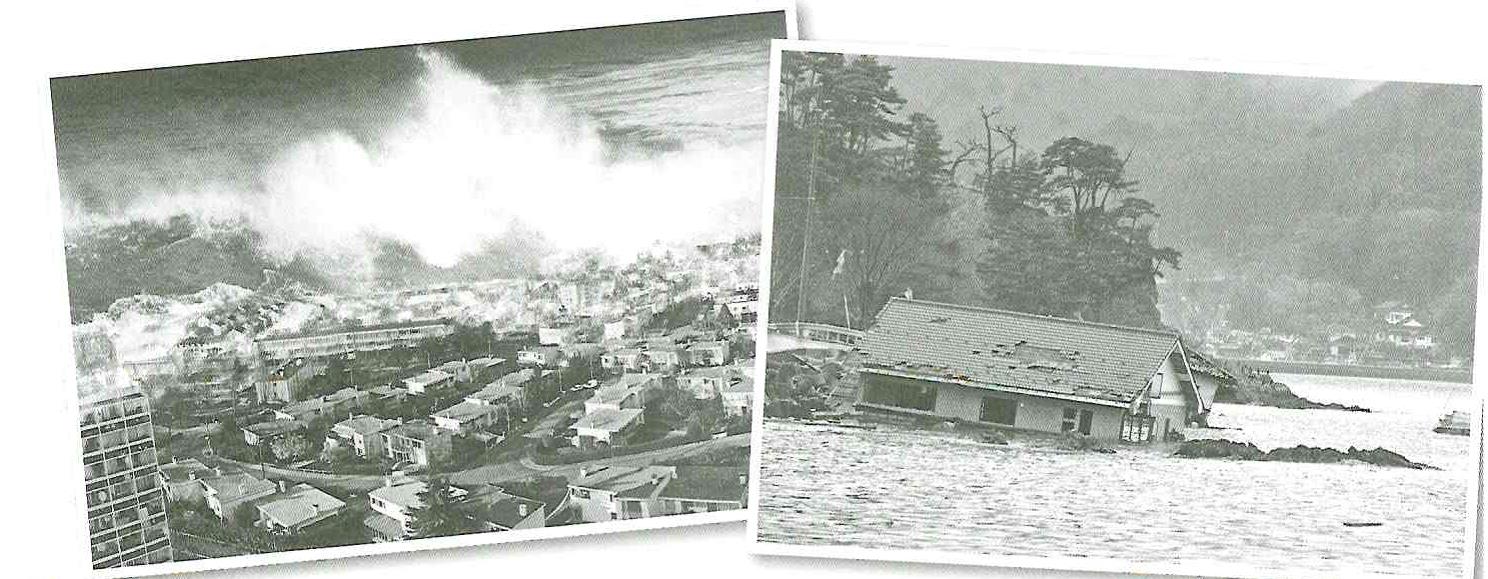
*83*
c. 1. Replace the words in brackets with words that have similar meanings below. There are two extra words.
החליפו את המילים שבסוגריים במילים מלמטה שיש להן פירוש דומה. ישנן שתי מילים מיותרות.
extra / setup / travel / project / successful / fantastic / correctly / leader
ex. 1. Do you want a sandwich? I have (more than I can eat). (extra)
2. Lavi helped me (put up) the picnic. --
3. Who is the (head) of the group? --
4. What a (wonderful) surprise. --
5. She answered all the questions (without making a mistake). --
6. We want to (take a trip) to Eilat in the spring. --
c. 2. Write a sentence with each of the two words you didn't use in exercise c.1.
כיתבו משפט עם כל אחת משתי המילים בהן לא השתמשתם בתרגיל c.1..
d. Circle the correct words to complete the article.
קיפו את המילים המתאימות כדי להשלים את המאמר.
Israel's Volunteer Search and Rescue Team
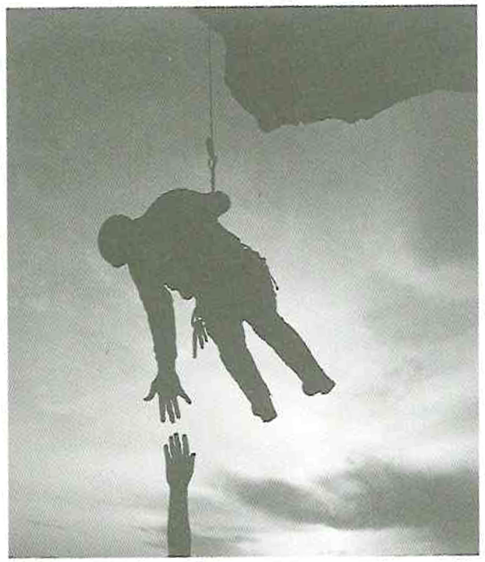
The team is very serious / successful. Each year they help over 2,000 people.
*84*
e. Imagine you are working for the Tevel b'Tzedek organization. Write an email to a friend about what you do. Use at least four of the words below.
תארו לעצמכם שאתם עובדים בארגון "תבל בצדק". כיתבו אימייל לחבר/ה על מה שאתם עושים. השתמשו לפחות בארבע מהמילים שלמטה.
successful / leader / materials / destroy / rebuild / earthquake / shelter (n) / service / setup / travel
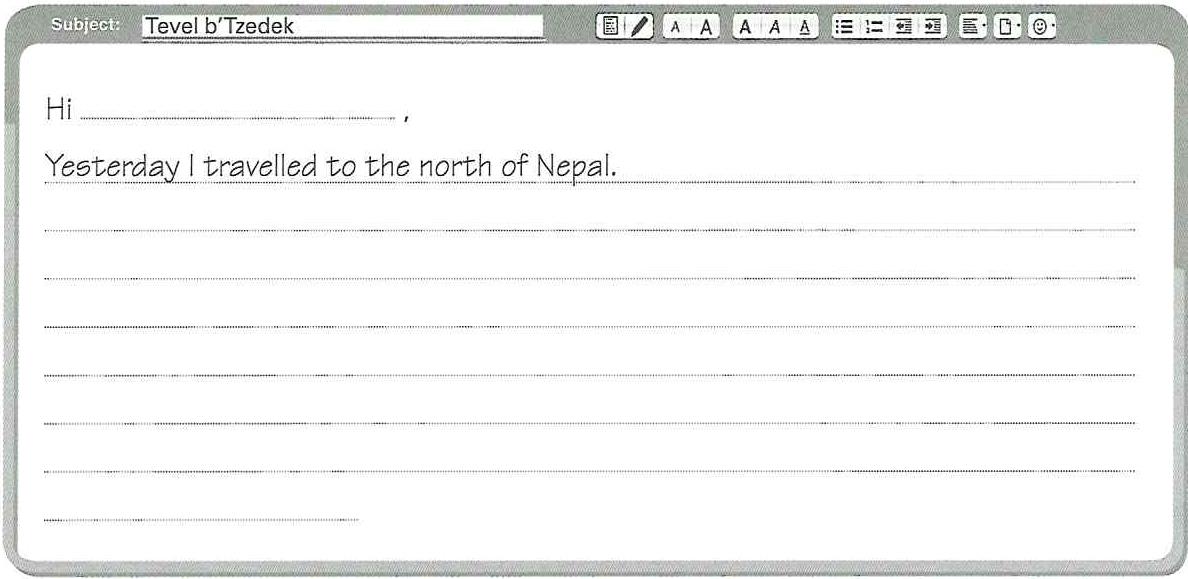
Hi,
Yesterday I travelled to the north of Nepal. --.
f. Prefix: re-
f. 1. Circle the correct answer.
הקיפו את התשובה הנכונה.
ex. 1. I (read) / reread a lot every day.
2. He didn't receive the fax, so I sent / resent it.
3. I wrote / rewrote the words in order to learn how to spell them all correctly.
4. I paid for the lunch so she paid / repaid me the next day.
5. View / Review your work carefully before you hand it in to the teacher.
f. 2. Write each sentence using the words in brackets with the prefix re-.
כיתבו כל משפט תוך שימוש במילים שבסוגריים בתוספת התחילית re-.
ex. 1 You should (write) your story again.
You should rewrite your story.
2. We have to (build) the bookshelf again. --.
3. I want to (pay) him back for his help. --.
4. They (read) our letter many times. --.
5. The meal was cold so she (heated) it again. --.
*85*
Language - Past progressive - after student’s book, page 85
a. Circle the correct answer.
הקיפו את התשובה הנכונה
ex. 1. When Michal phoned, I (was taking) / were taking a shower.
2. Did you see Nati at the party? It looked like he were having / was having a great time.
3. I wasn't paying attention / weren't paying attention when you asked me the question.
4. What was you doing / were you doing when you broke your leg?
5. They wasn't wearing / weren't wearing seatbelts when the car hit them.
6. Tom's younger brother was crying / were crying while Tom was speaking / were speaking on the phone.
7. My parents was driving / were driving home while my brother and I was making / were making dinner.
8. I was telling / were telling my friend about my weekend while we were shopping / was shopping in the mall.
מה עשו האנשים כאשר ריבי הביטה החוצה מחלון חדרה? השלימו את משפטים על התמונה עם המילים שלמטה.
jog / get out / feed / skip / argue / walk
תמונה:
Mr. Salam - מאכיל יונים יושב על ספסל
Tali and Keren - קופצות בחבל
Yuval - מטיילת עם כלב
Ron - מתווכח עם Guy
Yasmin - רצה
Rivi - מביטה על כולם מהחלון
Mika - יוצאת מהמכונית
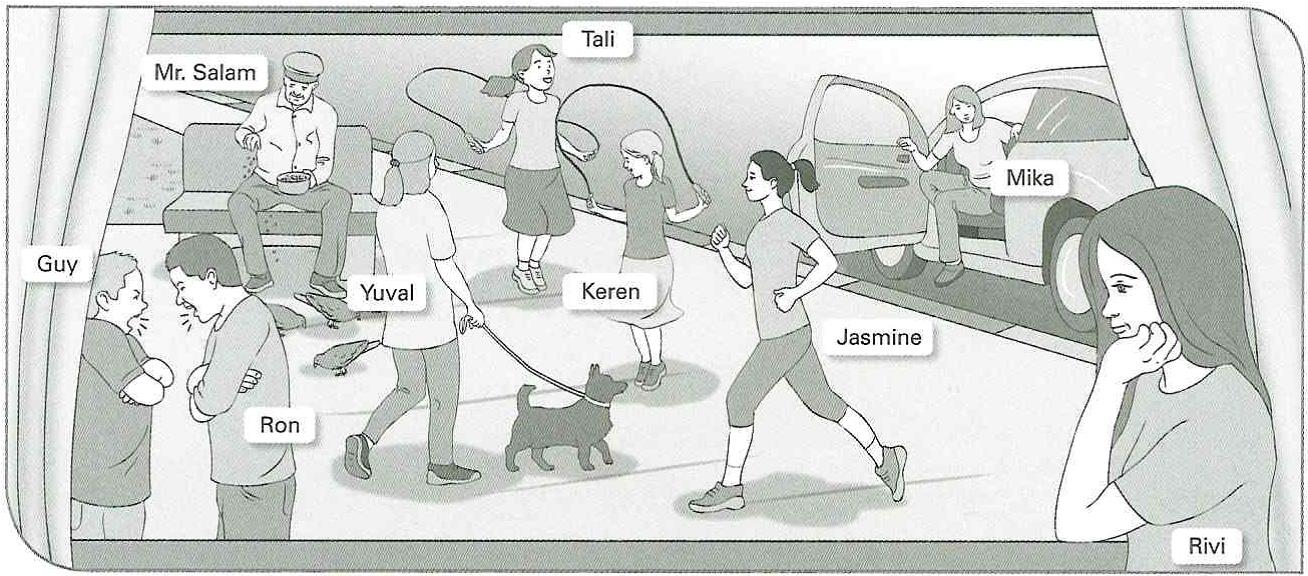
ex. 1. Jasmine was jogging along the sidewalk.
2. Her neighbor, Mika, -- of her car.
3. Tali and Keren -- and having fun.
4. Mr. Salam -- the birds.
5. Guy and Ron -- in the street.
6. Yuval -- a dog.
*86*
c. 1. A reporter interviewed some teens who were hiking in the Negev during a flood. Complete the reporter's questions. Use the past progressive form of the verbs.
כתב ראיין כמה בני נוער שעשו טיול רגלי בנגב במהלך שיטפון. השלימו את השאלות של הכתב. השתמשו בצורת ה- past progressive של הפעלים.
Reporter's Questions
ex. 1. What. were you doing (do) in the Negev at the time of the flood?
2. Where -- you -- (hike)?
3. -- it -- (rain) when you began the hike?
4. there other people (walk) in the wadi, too?
5. Why -- some people -- (shout) at you?
6. -- the water -- (flow) very fast?
c. 2. Complete the teens' answers with the verbs in the positive or negative form of the past progressive. Then match each answer to a question in exercise c.1.
השלימו את התשובות של בני הנוער עם הפעלים ב- past progressive, בחיוב או בשלילה. לאחר מכן, התאימו כל תשובה לשאלה מתרגיל c.1..
Teens' Answers
ex. 3. a. It. wasn't raining -- (not rain) when we began the hike.
-- b. We -- (hike) when the flood began.
-- c. Yes, it -- (flow) very fast.
-- d. We -- (hike) in the wadi, at the southern part of the Dead Sea.
-- e. They -- (shout) at us to climb quickly to a higher place.
-- f. Yes, a group of people -- (stand) above us.
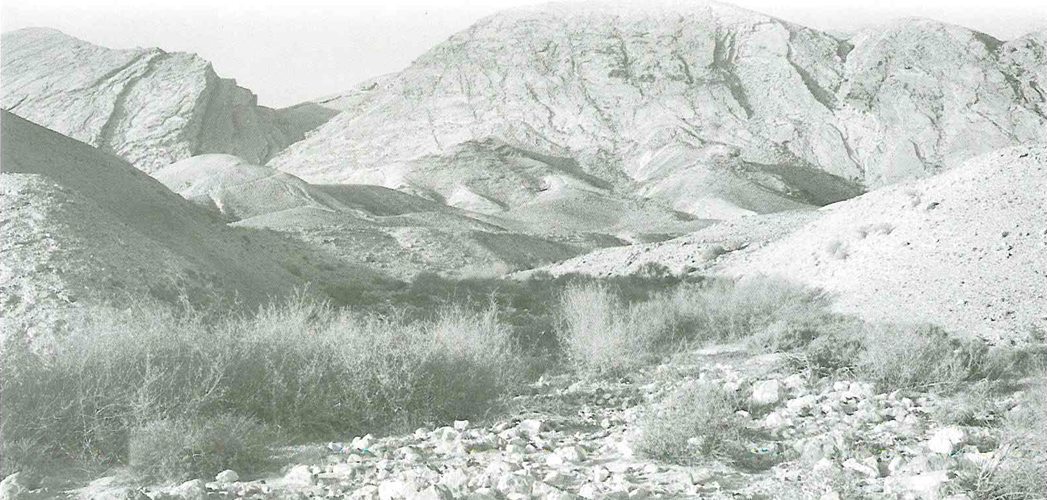
*87*
d. Complete the text with the past progressive form of the verbs in brackets.
השלימו את הקטע עם צורת ה-past progressive של הפעלים שבסוגריים.
Lucky Lucille
It was a cold night in 1912. Lucille and her family (were traveling) (travel) on the Titanic, the biggest ship in the world at that time. They -- (sail) from Southampton to New York. It was 11:30 at night. Some people -- (sit) and talking in the dining room and others -- (dance). Lucille -- (sleep) in her room.
Suddenly, there was a loud noise. Lucille woke up. She did not see her parents and she was frightened. When she opened her door water -- (flow) everywhere, and a man -- (shout), "To the lifeboats! The ship is sinking!" While Lucille -- (run) to the lifeboats, other people -- (try) to find their families.
Then Lucille saw her parents. They climbed into the lifeboat too. Many people weren't so lucky, though. About 1,500 people died that night.
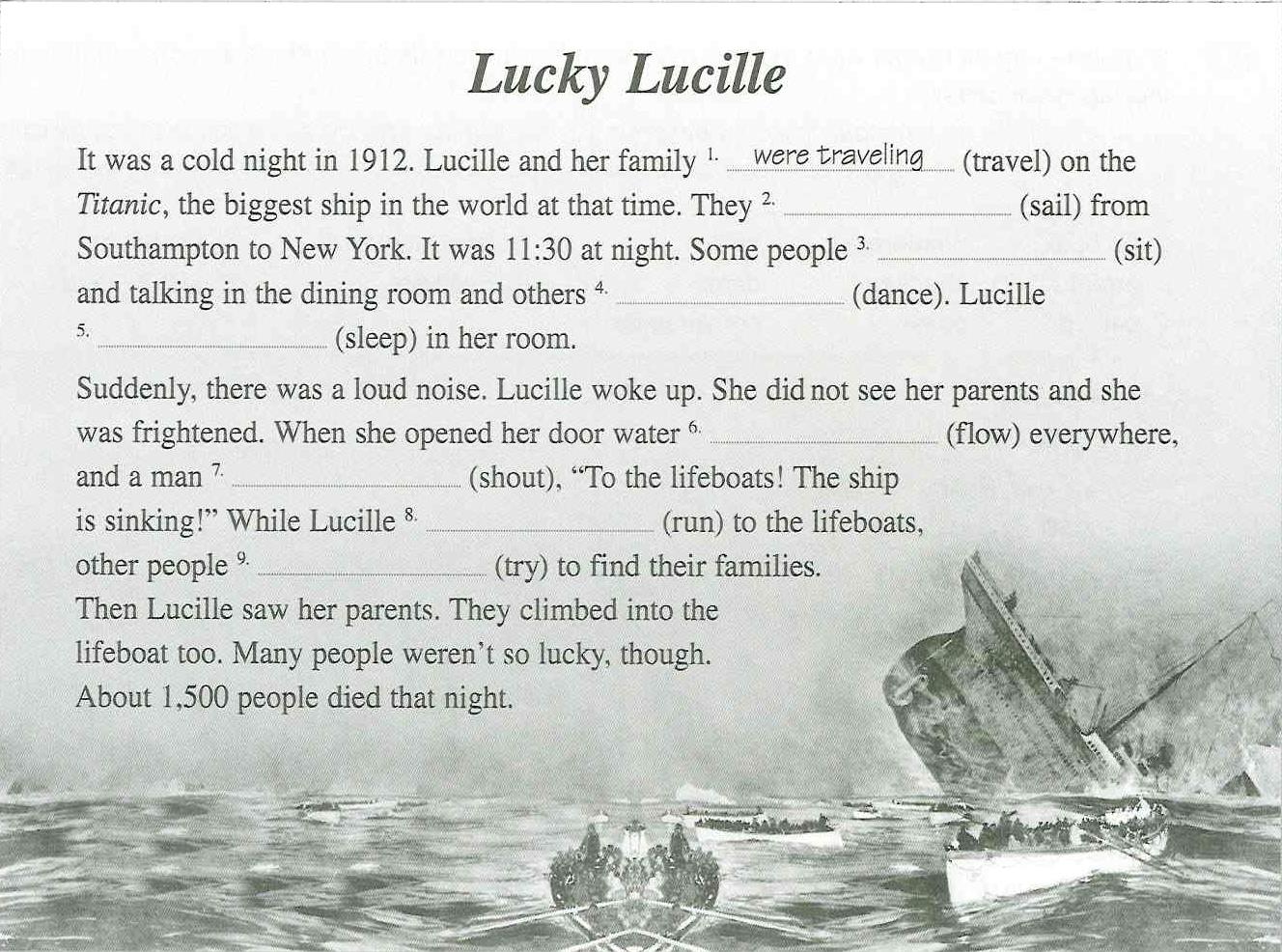
e. Answer the questions about yourself. Write complete sentences. Use the past progressive.
ענו על השאלות על עצמכם. כיתבו משפטים שלמים. השתמשו בצורת ה- past progressive.
ex. 1. What were you doing at 9 o'clock last night?
I was doing my homework.
2. Were you listening to music on your way home from school today? --.
3. Who were you talking to during the break today? --.
4. What were you doing when your parents got home from work yesterday? --.
5. What were you studying during your first lesson today? --.
*88*
Part 4 - Story: Wind
New words (1) - student's book, page 86 exercise a.
a. Write the words below next to their meaning. If you do this correctly, the words will be in alphabetical order.
כיתבו את המילים שלמטה ליד הפירוש שלהן. אם תעשו זאת נכון, המילים יופיעו לפי סדר האלפבית.
be back / dangerous / heavy / back and forth / flashlight / afraid / check on / deep / hesitate / just in case / call up / coast / conversation
1. פוחד - afraid
2. הלוך ושוב --
3. לחזור --
4. לגייס לצבא --
5. לבדוק מה שלום --
6. חוף --
7. שיחה --
8. מסוכן --
9. עמוק --
10. פנס --
11. כבד --
12. להסס --
13. רק למקרה ש-, לכל מקרה --
put up / on the way / wide awake / turn off / war / What's the matter? / of course / mail / roll down / wooden boards / supplies
14. דואר - mail
15. בוודאי, כמובן --
16. בדרך --
17. לתלות --
18. להוריד, לגלגל למטה --
19. ציוד --
20. לכבות, לסגור --
21. מלחמה --
22. מה קרה? --
23. ערני לגמרי, ער לחלוטין --
24. לוחות עץ --
b. Find at least 3 words or expressions in exercise a. that are connected to emergencies.
מיצאו לפחות 3 מילים או ביטויים בתרגיל a שיש להם קשר למצבי חירום.
check on, --
*89*
New words (2) - student’s book, page 90, exercise a.
Write the words below next to their meaning. If you do this correctly, the words will be in alphabetical order.
כיתבו את המילים שלמטה ליד הפירוש שלהן. אם תעשו זאת נכון, המילים יופיעו לפי סדר האלפבית.
look forward to / I'm glad / finally / behind / fix / wait till you see it / damage / get through / pretty bad / stay(v) / cover / safe / clean up the mess
1. מאחור, מאחורי - behind
2. לסדר את ה"בלגן" --
3. לכסות --
4. נזק --
5. לבסוף, סוף סוף --
6. לתקן --
7. לעבור --
8. אני שמח --
9. לצפות ל- --
10. גרוע למדי --
11. בטוח --
12. להישאר --
13. חכה עד שתראה (את זה) --
b. Find at least 3 positive words or expressions in exercise a.
מיצאו לפחות שלוש מילים או ביטויים חיוביים בתרגיל a.
look forward to, --,
Vocabulary practice - after student's book, page 91, basic understanding
a. 1. Write T (true) or F (false) next to each sentence according to Part 1 of the story "Wind" on pages 87-89 of the student's book. Pay attention to the words in brackets.
כיתבו T (נכון) או F (לא נכון) ליד כל משפט, על פי החלק הראשון של הסיפור Wind בעמודים 87-89 בספר הלימוד. שימו לב למילים שבסוגריים.
ex. T 1. The American army (called up) Annie's dad.
-- 2. Annie's dad will (be back) in twelve months.
-- 3. Annie's dad calls Annie to (check on) her and her mom.
-- 4. Annie and her dad had a long (conversation) on the phone.
-- 5. Annie was (wide awake) all night.
-- 6. A neighbor comes to see if Annie and her mom are (safe).
-- 7. Annie is (afraid) the hurricane will destroy the house.
a. 2. Correct the false sentences in exercise a.1. --.
תקנו את המשפטים הלא נכונים בתרגיל a.1..
*90*
b. Circle the correct answer according to part 2 of the story “Wind” on page 91 of the student’s book.
הקיפו את התשובה הנכונה לפי החלק השני של הסיפור Wind בעמוד 91 של ספר הלימוד.
ex. 1. Everyone is -- Annie’s dad’s return.
(a.) looking forward to, b. on the way, c. looking for
2. The neighbors -- Annie and her mom to see if they were OK.
a. checked on, b. called up, c. were back
3. The neighbors -- the roof with plastic.
a. contacted, b. connected, c. covered
4. The men -- the damage inside the house.
a. turned off, b. saved, c. fixed
5. Annie and her mom -- the hurricane with their neighbor’s help.
a. put up, b. got through, c. turned off
6. The damage to the house was --.
a. heavy, b. pretty bad, c. lost
7. Annie wrote to her dad that she -- found a reason to be happy.
a. for example, b. of course, c. finally
8. The hurricane caused a lot of --.
a. war, b. damage, c. ground
c. Circle the correct answer. Pay attention to the words in brackets.
הקיפו את התשובות הנכונות. שימו לב למילים שבסוגריים.
ex. 1. It’s (dangerous) to cross the road when the light is green / (red).
2. (Turn off) the clouds / TV, please.
3. Akko / Nazareth is a city on the (coast) of Israel.
4. He (put up) a fence / tree around the garden.
5. The mechanic (fixed) the cake / car.
6. Assaf (hesitated) a moment before answering the question. Then he spoke / didn’t speak.
7. (Wooden boards) can protect glass / water in strong winds.
8. Trees move (back and forth) when there’s a lot of wind / sun.
9. You should take a (flashlight) when you go camping / go swimming.
10. The children (rolled down) the hill / playing field.
11. (Just in case) you are all hungry, there are / aren’t sandwiches on the kitchen table.
12. Tim bought (supplies) for the trip. He bought some food / bowls.
*91*
d. Complete the sentences. Pay attention to the words in brackets.
השלימו את המשפטים. שימו לב למילים שבסוגריים.
ex. 1. Don’t stand (behind) a car.
2. I felt (pretty bad) when --.
3. I’m (glad) --.
4. Don’t go into (deep) water if --.
5. You should (clean up the mess) --.
6. Don’t (hesitate) to --.
מה הם אמרו? כיתבו משפט לכל תמונה עם המילים שלמטה.
check on / What’s the matter? / dangerous / afraid / pretty bad / mail / deep / afraid / safe / hesitate / just in case / clean up the mess / damage / wait till you see it
תמונות:
1. 2 גברים במכונית, הנהג שואל, הנוסע שלידו מצביע על משהו על הכביש.
What’s the matter? --
2. אחת מראה ציור ואומרת משהו לחברתה. --.
3. אמא מרגיעה ילד שנשפך משהו על שולחן המטבח. --
4. בחור בודק את תיבת הדואר וגבר אחר עומד מאחוריו. --
Student’s book, page 92, exercise c.
In which letter can we understand the following? Write: letter 1 / letter 3.
1. Mom and I are doing great. --.
2. I miss you very much. --
3. We are now friends with the neighbors. --
4. I feel better now. --
5. I often cry when I think of you. --
6. I have reasons to be happy. --
*92*
Unit 3 - review - after student’s book, page 95
Vocabulary
a. Translate the expressions into your language. Remember they cannot be translated word by word. Use the Glossary to check your answers.
תרגמו את הביטויים לשפה שלכם. זיכרו שאי אפשר לתרגם מילה במילה (תרגום מילולי). השתמשו במילון שבסוף הספר כדי לבדוק את תשובותיכם.
ex. 1. get rid of - להיפטר מ-
2. make fun of --
3. look back --
4. look like --
5. What's the matter? --
6. get through --
7. back and forth --
8. just in case --
b. Circle the correct answer.
הקיפו את התשובה הנכונה.
ex. 1. The (woods) / wars were very cool and quiet.
2. The women's 200 meter event / experience will begin in five minutes.
3. She covered / continued cycling until she reached the finish line.
4. You can save water, for example / I'm glad, by taking a shower instead of a bath.
5. Have fun on your trip. I hope everything follows / turns out well.
c. Circle the correct answer to show you understand the meaning of the words in brackets.
הקיפו את התשובה הנכונה כדי להראות שאתם מבינים את פירוש המילים שבסוגריים.
ex. 1. I (looked after) my brothers while my parents went to the market.
(a.) I took care of them., b. I tried to find them.
2. The lake is very (deep).
a. I can stand in the water., b. I can't stand in the water.
3. You have to do all the work (in order to) pass the course.
a. You can pass the course, without doing the work.
b. You have to do all the work so that you can pass the course.
4. The cold kept us (wide awake).
a. We were asleep., b. We weren't asleep.
5. We won the (final) game of the season.
a. We won the first game., b. We won the last game.
6. After the fire, they (rebuilt) the house.
a. They fixed up the house., b. They bought a new house.
*93*
Grammar
d. Complete the sentences with the positive or negative form of the verbs in brackets. Use the past simple.
השלימו את המשפטים עם צורת החיוב או השלילה של הפעלים שבסוגריים. השתמשו ב-past simple.
ex. 1. We didn't go (not go) to the beach because it was too cold.
2. We were hungry so we -- (have) falafel.
3. I -- (not see) Helen at school because she was sick.
4. Bill -- (not give) me an answer to my question so I asked someone else.
5. I -- (wear) a good pair of shoes to go hiking.
6. She -- (not buy) the earrings because they were too expensive.
e. 1. Write the words in the correct order to form questions.
כיתבו את המילים בסדר הנכון כדי לחבר שאלות.
ex. 1. did / Where / you / on vacation / go / ?
Where did you go on vacation?
2. have / yesterday / you / an English test / Did?: --?
3. your friend / get / What / for her birthday / did / you?: --?
4. Did / this morning / eat / you / breakfast? --?
e. 2. Answer the questions you wrote in exercise e.1.
ענו על השאלות שכתבתם בתרגיל e.1..
ex. 1. I went to Akko.
2. --.
3. --.
4. --.
f. Complete the sentences with the past progressive form of the verbs in brackets.
השלימו את המשפטים עם צורת ה- past progressive של הפעלים שבסוגריים.
ex. 1. We were listening (listen) to the radio when we heard the news about the terrible fire.
2. It -- (not rain) while we -- (walk) to school.
3. The students -- (watch) a movie from 10:00-11:00 a.m.
4. The football players -- (not play) a game. The whole team -- (train) for the next match.
5. The children -- (swim) in the pool while their father -- (prepare) lunch.
*94*
Writing
g. 1. Read the opening sentence for each topic below. Then tick V for 3 details in each.
קיראו את משפט הפתיחה של כל אחד מהנושאים שלמטה. לאחר מכן, סמנו ב- V שלושה פרטים לכל אחד מהם.
Topic: The Marathon Race
1. Opening sentence: I ran a marathon race.
-- a. During the race, I tried to stay calm and breathe regularly.
-- b. I was so excited before the race.
-- c. I like bike racing, too.
-- d. It wasn't easy but I kept going.
Topic: Volunteering at a Soup Kitchen בית תמחוי))
2. Opening sentence: I volunteered at a soup kitchen in my city.
-- a. Many hungry people came there to get a meal.
-- b. Everyone was welcome and no one asked any questions.
-- c. I'm in the 10th grade.
-- d. We served more than one thousand meals a day.
g. 2. Tick V a closing sentence for each of the topics below.
סמנו ב-V את משפט הסיום לכל אחד מהנושאים שלמטה.
1. The Marathon Race
-- a. There were lots of empty water bottles on the ground.
-- b. It was a great experience.
-- c. I have a lot of good friends.
2. Volunteering at a Soup Kitchen (בית תמחוי)
-- a. I'm happy that I am able to help.
-- b. I don't like fish.
-- c. I'm a great cook.
h. Imagine your class went on a school trip. Complete the paragraph.
תארו לעצמכם שהכיתה שלכם יצאה לטיול בית ספר. השלימו את הפסקה.
My class went on a school trip to --. First, we --. Then, we --. Finally, we --.
It was --.
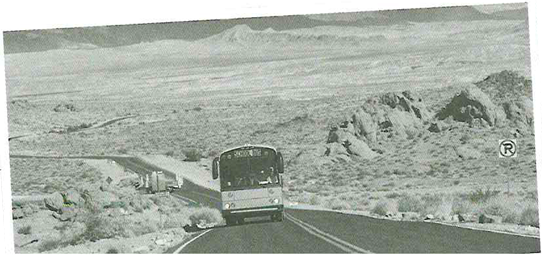
*95*
Review Units 1-3 - after student’s book, page 95
Circle the correct answer.
הקיפו את התשובה הנכונה.
Vocabulary
ex. 1. This jacket isn't mine. Does it -- you?
(a.) belong to, b. reach, c. improve
2. She -- hip hop to rock music.
a. realizes, b. describes, c. prefers
3. We -- the tour guide around the city.
a. followed, b. coached, c. encouraged
4. Thanks for all your good --.
a. advice, b. size, c. guests
5. -- Sara's map, we should be at her house soon.
a. In order to, b. Fortunately, c. According to
6. Khalil is never late. I -- where he is.
a. aware of, b. wonder, c. contact
7. We are -- to seeing you soon.
a. looking forward, b. turning, c. promising
8. There is nothing in this box. It is --.
9. Should we turn left or right at the corner? I'm --.
a. embarrassed, b. confused, c. traditional.
10. The sea was very --.
a. calm, b. depressed, c. daring
Grammar
ex. 1. You -- to see that movie. It is very funny.
a. must, b. should, (c.) have
2. I'm sorry, but I don't -- the answer to your question.
a. knowing, b. know, c. knows
3. -- want to go to the movies?
a. Are you, b. You are, c. Do you
4. The service at the restaurant was good, but the food --.
a. weren't, b. wasn't, c. was
5. It -- when I left home this morning.
a. rains, b. was rain, c. was raining
6. We -- to be home at 10 p.m.
a. needs, b. needing, c. need
7. I -- finish my homework before I go out.
a. have to, b. had to, c. mustn't
8. She is a -- person.
a. kind, b. kindest, c. kinder
9. I feel -- today than I did yesterday.
a. best, b. good, c. better
10. Did you -- to bed early last night?
a. went, b. go, c. going
*96*
Independent reading 1 - after student’s book, page 95
a. Read the article.
(השורות מחולקות וממוספרות לפי ספר הדפוס, מספר השורה יבוא בסוגריים בתחילת השורה)
Meet Hilik Magnus
(1) Imagine someone you know is hiking in South America. Suddenly, he
(2) goes missing. What is the best thing for his family to do? The answer
(3) is: call Hilik Magnus.
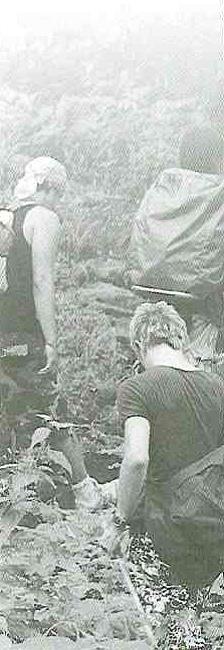
(5) to Israel when he was one year old. In 1994, he set up a company to
(6) help hikers in trouble, anywhere in the world. For more than 22 years,
(7) Hilik and his team have helped rescue people all over the world.
(8) On April 25, 2015, the day of the earthquake in Nepal, Hilik received
(9) hundreds of messages from Israelis hiking in Nepal. These messages
(10) arrived from personal safety devices (מכשירי בטיחות אישית) that the hikers take with them
(11) to call rescue teams. By that evening, Hilik and his team of rescuers
(12) were on their way to Nepal. During the week that followed they
(13) reached the hikers by foot, jeep, bus and helicopter.
(14) Israelis call Hilik "the national rescuer" (המחלץ הלאומי). When reporters ask him why
(15) he is ready to put his life in danger, Hilik says

(17) the world to try and save
(18) a family's child.
Nepal, 2015

*97*
b. Complete the fact file.
Fact file
Who is Yechiel "Hilik" Magnus? --.

Who was in trouble? --.
Who did they contact? --.
How did they contact the rescuers? --.
How did the rescuers reach the hikers? --.
c. Answer the questions about the article.
1. Hilik Magnus --.
a. hikes all over the world.
b. helps rescue Israeli hikers.
c. lives in Nepal.
2. Complete the facts below. Write the date and the events.
Date: Event
1949: a. --
1994: b. --
c. --: The earthquake in Nepal.

3. a. What do Israelis call Hilik? --.
b. Why do you think they call him by his name? --.
4. What question do reporters ask him? --.
5. Complete the sentence.
In order to save a family's child, Hilik --.
What about you?
Write three questions you would like to ask Hilik. --?
*98*
Independent reading - after student’s book, page 95
Read the article.
(השורות מחולקות וממוספרות לפי ספר הדפוס, מספר השורה יבוא בסוגריים בתחילת השורה)
Teen leaders against bullying
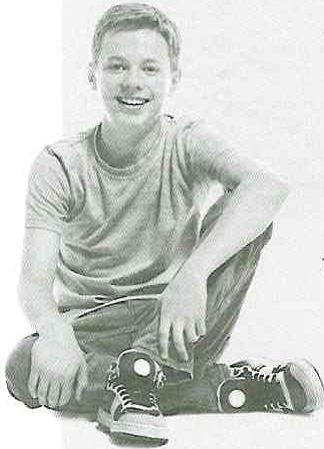
(2) want to go to school because they were
(3) afraid of bullying. Meet three teen
(4) leaders who are trying to stop bullying.
(5) Andy:
(6) I was once one of the people who stood on the side and
(7) watched. I was afraid to help because I didn't want to be bullied
(8) myself. When I saw a program about bullying on TV, I learned
(9) that a person who does not help is almost as bad as the bully
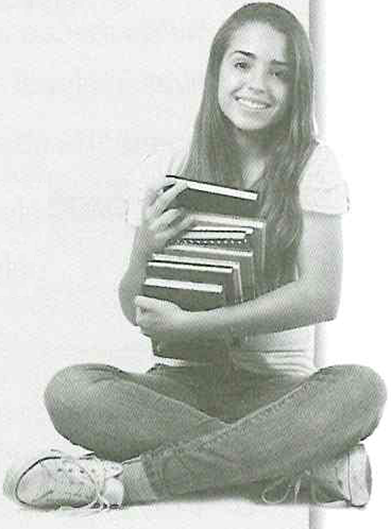
(11) I took an online course with an anti-bullying (נגד בריונות) group and now
(12) I am a teen leader against bullying. I help people who are
(13) bullied and I also work to help bullies stop bullying.
(14) Victoria:
(15) Until last year, I hid during class breaks. Some of the girls in
(16) my class bullied me. I was so frightened I didn't want to go
(17) to school. Then one day a teen leader against bullying
(18) came to speak at our school. Suddenly I understood that
(19) I was not the only one who was bullied. There were other
(20) people just like me. I decided to become a teen leader, too.
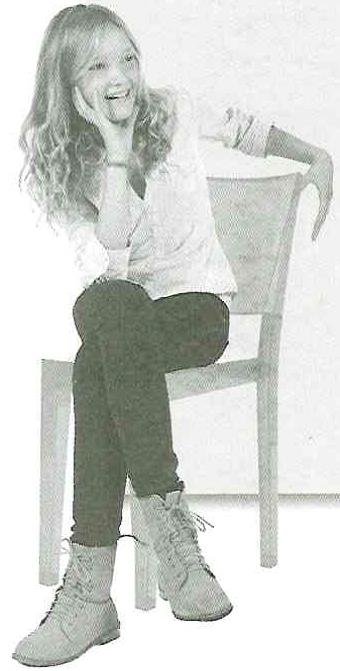
(21) Brittany:
(22) I made fun of kids so that no one would make fun of me.
(23) One day, a teen leader against bullying came to speak to
(24) my class. I saw that everyone was looking at me. I was so
(25) ashamed. Afterwards, I spoke to the teen leader. With
(26) her help, I understood why I was acting like a bully and
(27) how I could stop it. I decided that I wanted to become a
(28) teen leader against bullying. I want to help people, not
(29) hurt them.
*99*
b. Answer the questions about the article on page 98.
1. In 2015, nearly half a million teens said they were --.
a. bullied at school.
b. scared to go to school because of bullying.
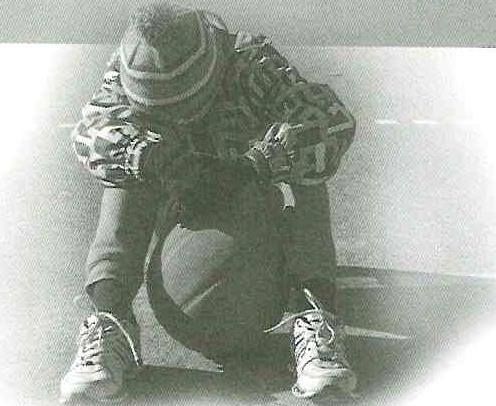
2. Why was Andy afraid to help? --.
3. Complete the sentence.
Andy decided to help after he --.
4. Name two kinds of people who Andy helps. --.
5. Why was Victoria scared to go to school? --.
6. How did Brittany behave towards other kids in her class? --.
7. Complete the sentence.
Brittany felt -- when she realized she behaved badly.
8. List two things Brittany realized after she spoke to the teen leader.
Complete the sentences.
Brittany --.
She --.
c. Complete the interviews with the teens. Use the information from the article on page 98.
1. When did you learn about bullying?
Andy: --.
2. Why did you decide to become a teen leader?
Victoria: --.
3. How do you think you can help?
Brittany: --.
What about you?
Would you like to be a teen leader? Explain why or why not. --.
*100*
*100*
Part 1 - Truth in Advertising
Reading - Student’s book page 98, exercise a.
New words
a. Write the words in English next to their meanings. If you do this correctly, the words will be in alphabetical order.
כיתבו את המילים שלמטה ליד הפירוש שלהן. אם תעשו זאת נכון, המילים יופיעו לפי סדר האלפבית.
check (v) / avoid (v) / influence (v) / on sale / carelessly / afford / choice / expensive / item / entertainment / media / payment / knowledge / marketing / advertiser / brand name / convince / electronic gadget
1. מפרסם - advertiser
2. להרשות לעצמו --
3. להימנע מ... --
4. מותג, ממותג --
5. באופן רשלני, בחוסר זהירות --
6. לבדוק --
7. ברירה, בחירה --
8. לשכנע --
9. גאדג'ט אלקטרוני --
10. בידור --
11. יקר --
12. להשפיע --
13. פריט --
14. ידע --
15. שיווק --
16. מדיה --
17. במבצע --
18. תשלום --
*101*
spend money / smart / sports gear / small print / pressure (v) / value too good to be true / trend / research / worth
19. ללחוץ על - pressure
20. לחקור --
21. האותיות הקטנות --
22. חכם --
23. להוציא / לבזבז כסף --
24. ציוד ספורט --
25. טוב מכדי להיות אמיתי --
26. מגמה --
27. ערך --
28. שווה, כדאי --
b. Find at least 6 words or expressions in exercise a. that are connected to:
1. advertisements: on sale, --
2. a good deal: --,
Words, words, words - after student's book, page 101
a. Circle the correct answer to show you understand the meaning of the words in brackets.
הקיפו את התשובה הנכונה כדי להראות שאתם מבינים את פירוש המילים שבסוגריים.
ex. 1. These shoes are (on sale).
(a.) They are cheaper now., b. They are more expensive.
2. Ads (influence) people to spend money.
a. They teach people to be careful with their money.
b. They encourage people to buy things.
3. Nedjma's (knowledge) of art is amazing.
a. Nedjma just started painting.
b. Nedjma studied art at university.
4. Daniel bought six (items) at the market.
a. When Daniel went to the market he got six things.
b. Daniel shopped in six places.
5. The company did (research) to find out what people were interested in buying.
a. They found out what people want to buy.
b. They found people to sell our products.
6. My friend (convinced) me to go shopping with her.
a. I went with her.
b. I stayed at home.
*102*
b. 1. Read what these teens learned from their parents about smart shopping. Complete the sentences with the words below. There are two words you don’t need.
קיראו מה למדו בני הנוער האלה מהוריהם על קניות חכמות. השלימו את המשפטים עם המילים שלמטה. ישנן שתי מילים מיותרות.
research / expensive / worth / check / choice / smart / avoid / too good to be true
ex. Emily: Do not believe everything you see. Some ads are (too good to be true).
Cathy: My mom tells me not to waste my money on -- things.
Hakim: My parents always tell me to be -- and to compare prices before I buy anything.
Tim: My parents say that I should always -- prices carefully before I buy.
Mike: My parents say I should make a list of everything I buy. That way I will make a better --.
Nadine: My dad says I should -- buying things I can't pay for.
2. What advice can you give about spending money? Write at least 3 sentences using the words below.
איזו עצה אתם יכולים לתת על הוצאת כספים? כיתבו לפחות שלושה משפטים. השתמשו במילים שלמטה.
value / choice / avoid / afford / price / convince / expensive / check / on sale / carelessly / research / trend
ex. 1. Don't buy expensive things.
2. --.
3. --.
4. --.
5. --.
5. Complete the sentences about yourself. Pay attention to the words in brackets.
השלימו את המשפטים על עצמכם. שימו לב למילים שבסוגריים.
ex. 1. What (influences) me to buy something is (the price).
2. I can't (afford) to --.
3. Before I decide to buy something, I (check) --.
4. I think that buying with (payments) is --.
5. When salespeople (pressure) me --.
6. My favorite kind of (entertainment) is --.
7. I think a good (brand name) is -- because --.
8. My favorite (electronic gadget) is --.
*103*
כיתבו שלושה משפטים על מה שקורה בכל תמונה. השתמשו לפחות במילה אחת מלמטה בכל משפט.
spend money / media / choice / marketing / on sale / small print / advertiser / sports gear / item / check / knowledge / convince / brand name / trend
שתי חברות בוחנות מוצר.
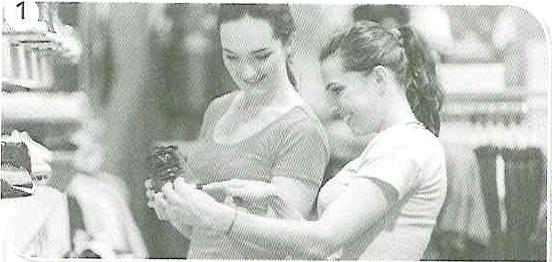
ex. I think this is a good choice. --.
2. מישהו בודק מצבעים באתר אינטרנט. --
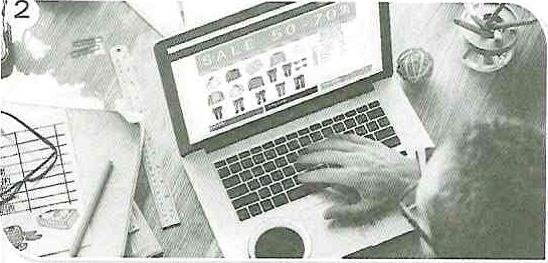
e. Expressions in advertising
e. 1. Match the expressions in A to their meanings in B.
התאימו את הביטויים ב-A לפירושים שלהם ב-B.
A
1. two for the price of one
2. up to 50 percent off
3. try it out
4. one of a kind
5. outlet store
6. final sale
7. a real bargain
8. three easy payments
B
-- א. נסה אותו
-- ב. ממש מציאה
-- ג. חנות מפעל
-- ד. מכירת חיסול
-- ה. עד 50 אחוז הנחה
-- ו. שלושה תשלומים נוחים
1. ז. שניים במחיר של אחד
-- ח. יחיד במינו
e. 2. Complete the sentences with the expressions in exercise e.1.
השלימו את המשפטים עם הביטויים שבתרגיל e.1..
ex. 1. I paid for the cellphone in (three easy payments) instead of one.
2. These jeans are --. They cost me only 50 shekels.
3. Let's go to the --. It is much cheaper than stores in the mall.
4. Dad bought two cartons of milk because they were --.
5. Most stores have their -- in February and August.
6. I'm not sure if I want that electric bike. I want to -- first.
7. The sign says --. The flashlight costs 80 shekels not 160 shekels.
8. This car is unique. It is --.
*104*
Language - Relative clauses - after student’s book, page 103
a. 1. Circle the correct answer.
הקיפו את התשובה הנכונה.
ex. 1. Here is the coach -- chooses the players.
(a.) who, b. which
2. A hotel is a place -- people sometimes stay when they are on vacation.
a. where, b. who
3. She didn't get the job -- she wanted.
a. who, b. that
4. I remember the day -- you were born.
a. where, b. when
5. Jonathan read the book -- his friend recommended.
a. that, b. where
6. What do you call a person -- works in a library?
a. which, b. who
7. Is that the store -- you bought your tablet?
a. that, b. where
8. Sunday is the day -- we plan to have a party.
a. when, b. where
a. 2. Translate at least 3 sentences in exercise a.1. into your language. --.
תרגמו לשפתכם לפחות שלושה משפטים מתרגיל a.1..
b. Complete the sentences about yourself.
השלימו את המשפטים על עצמכם.
ex. 1. Friday is the day when (I like to go to the beach).
2. Israel is a country where --.
3. My friend is a person who --.
4. This was the store which --.
5. My birthday is a day when --.
6. English is a language which --.
7. My first grade teacher was a person who --.
8. My school is a place where --.
*105*
Complete each sentence with a relative clause below.
השלימו כל משפט עם משפט זיקה (relative clause) מלמטה.
when / visit my grandparents / who live across the street / which I loved / that we bought at the supermarket / that lives in Netanya / where I once lived
ex. 1. The apples (that we bought at the supermarket) are delicious.
2. Do you know the kids --?
3. That's the house --.
4. Wednesday is the day --.
5. It's my sister --, not me.
6. The shoe store -- closed down.
d. Write 3 sentences with relative clauses. Use the words in the lists below.
כיתבו שלושה משפטים עם משפטי זיקה. השתמשו ברשימות שלמטה.
1. Spanish is the language / That's the flavor ice cream / I have a friend
2. who / that / which
3. I love. / I learned in school. / lives in Jerusalem.
ex. 1. Spanish is the language which I learned in school.
2. --.
3. --.
1. The shoes / The movie / The game
2. that
3. we saw / I bought / I played
4. was fun. / was great. / are too small.
1. --.
2. --.
3. --.
e. Complete the sentences about yourself. Use relative clauses.
השלימו את המשפטים על עצמכם. השתמשו במשפטי זיקה.
ex. 1. I usually like to eat at a place where I can sit outside.
2. I like to be with friends --.
3. l enjoy music --.
4. The best vacation I ever had was --.
5. I just saw a TV show --.
*106*
Writing - Write a review - after student’s book, page 105, exercise d.
Student's book, page 105, exercise c
The words below help describe products. Write each word in the group.
wonderful / beautiful / terrible / good value / too small / perfect / excellent / too big / comfortable / disappointing / exciting
Positive: --
ex. Negative: too big, --
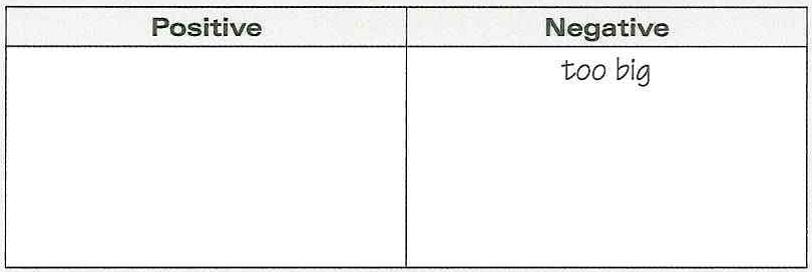
a. When you write a customer review, you first need to give your personal details. Complete the form below.
כאשר אתם כותבים ביקורת של לקוח, אתם צריכים למסור את פרטיכם האישיים. השלימו את הטופס שלמטה.
Customer review
Name --
Age --
Home address: --
Email: --
Telephone home: --
Cellphone: --

b. In a customer review, you can use adjectives to describe a product. Circle the correct adjective for each sentence.
בביקורת של לקוח, אתם יכולים להשתמש בשמות תואר (adjectives) כדי לתאר מוצר. הקיפו את שם התואר המתאים בכל משפט.
ex. 1. My new jeans were not expensive but they are --.
a. comfortable, (b.) too big
2. Adele's new album is very --. The new songs are very good.
a. disappointing, b. exciting
3. The sweater I bought on the Internet is --. It is just what I wanted.
a. terrible, b. perfect
4. I can wear my new running shoes all day. They are very --.
a. beautiful, b. comfortable
5. The service was --. I did not get the item I ordered.
a. disappointing, b. perfect
*107*
c. You can also describe a product with relatie clauses. Match A and B to complete the sentences about products.
ניתן גם לתאר מוצר בעזרת משפטי זיקה. התאימו A ל- B כדי להשלים את המשפטים על המוצרים.
A
1. I bought a great umbrella
2. I bought a blue jacket
3. I didn't receive the boots
4. I love the sunglasses
5. I'm not pleased with the belt
B
-- a. that I ordered.
-- b. which keeps me dry on rainy days.
-- c. that is very warm in cold weather.
-- d. which broke when I put it on.
-- e. that make me look like an actor.
תארו לעצמכם שקניתם כמה דברים באינטרנט. הסתכלו על התמונות וכיתבו מהי דעתכם. השתמשו במילים שלמטה ובמשפטי זיקה.
too big / exciting / disappointing / excellent / comfortable / perfect / terrible / good value / wonderful / too small
ex. 1. The slippers which I ordered on the Internet are very comfortable. (נעלי בית)
2. In my opinion, his jacket -- (גדול מדי).
3. The present -- (קופסה המכילה בקבוקי יין).
4. In my opinion, the computer equipment --. (50 אחוז על מדפסת ועכבר)
5. I think the camera --.
6. I think the football --.
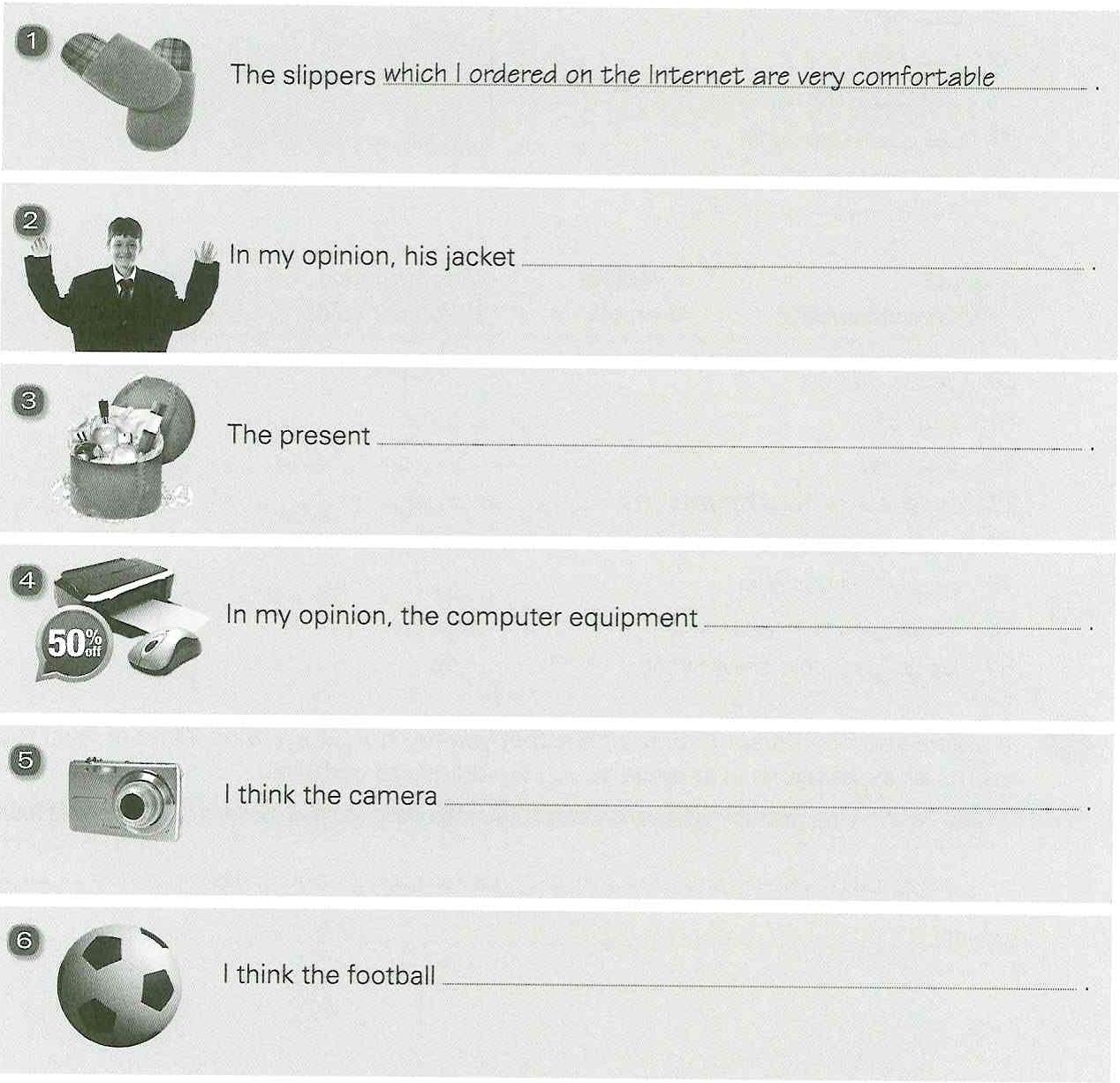
*108*
Part 2 - What a Rip-off!

New words
Write the words below next to their meaning. If you do this correctly, the words will be in alphabetical order.
כיתבו את המילים שלמטה ליד הפירוש שלהן. אם תעשו זאת נכון, המילים יופיעו לפי סדר האלפבית.
bank account / credit card / careful / order (n, v) / detail / half price / complaint / deal / post (n, v)
1. חשבון בנק - bank account
2. זהיר --
3. תלונה --
4. כרטיס אשראי --
5. עסקה --
6. פרט --
7. חצי מחיר --
8. הזמנה, להזמין --
9. הערה, תגובה, להעיר, להגיב --
upset / receive / subscription / voice message / What went wrong? / rip off / You bet I did! / surf the web
10. לקבל - receive
11. לגנוב --
12. מנוי --
13. לגלוש באינטרנט --
14. כועס, נסער --
15. הודעה קולית --
16. מה השתבש? --
17. ועוד איך (עשיתי זאת!) --
b. Imagine you bought something online that you are not happy with. Write at least 4 words or expressions in exercise a. you would use to complain.
תארו לעצמכם שקניתם משהו באינטרנט ואתם לא מרוצים ממנו. כיתבו לפחות ארבע מילים או ביטויים מתרגיל a שהייתם משתמשים בהם כדי להתלונן.
upset, --
*109*
Student’s book, page 107, exercise e.
Read the questions below. Then listen again and answer the questions.
1. When Alma met Lisa, Lisa was feeling --.
a. happy
b. terrible
c. frightened
2. What happened to Lisa? --
a. She got a good deal on a comic she liked.
b. An online company stole her money.
c. An online company sent her the wrong comic.
3. What did Lisa have to do to get the deal? --
a. She had to order and pay by the end of the day.
b. Lisa had to pay 12 payments.
c. She had to pay the store price.
4. Name two ways Lisa tried to contact the company that she ordered the comics from. --.
5. When Lisa's mom checked her bank account, she discovered that --.
a. the money was already gone.
b. the company never received Lisa's order.
c. the bank didn't know anything about the subscription.
6. Why does Lisa want to post her story on social media? --.
a. To get the comics she paid for.
b. To get her money back.
c. To warn her friends.
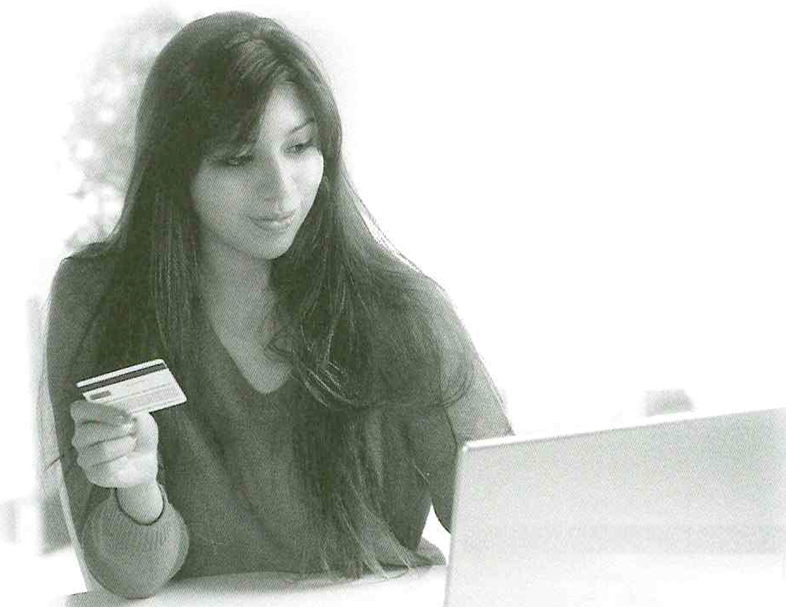
*110*
Words, words, words - after student’s book, page 108
a. Complete the puzzle with the words below. Use the clues to help you. Then find the hidden words to complete the sentence that follows.
השלימו את התשבץ עם המילים. היעזרו ברמזים. לאחר מכן, מיצאו את המילים החבויות כדי להשלים את המשפט שלמטה.
careful / details / half price / order / media / receive / upset / deal / bank account / marketing
ex. 1. try not to make a mistake: 7 letters, 1st letter - (c) a r e f u l
2. get: 7 letters, 1st letter --
3. ask for food in a restaurant: 5 letters, 4th letter --
4. pieces of information: 7 letters, 1st letter --
5. TV, radio: 5 letters, 4th letter --
6. sad: 5 letters, 5th letter --
7. a way to keep money in a bank: 2 words - 4 letters and 7 letters, 2nd letter of second word --
8. 50 percent off: 2 words - 4 letters and 5 letters, 2nd letter of first word --
9. selling something by advertising: 9 letters - (r) third letter --
10. low price: 4 letters, first letter --
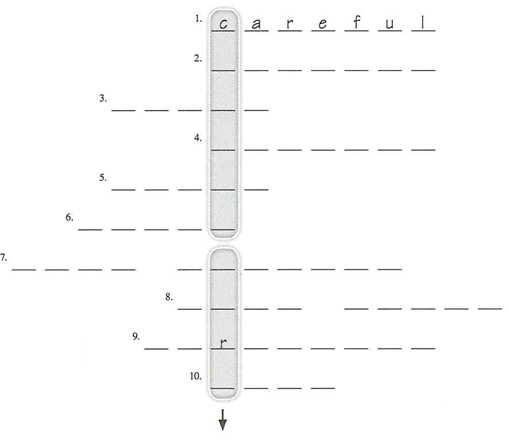
Many people pay for things with a --, -- instead of cash. (first word: 6 letters starting with c, second word: 4 letters, third letter: r)
b. Match each sentence in A to a sentence in B. Pay attention to the words in brackets.
התאימו את המשפטים ב- A למשפטים ב- B. שימו לב למילים שבסוגריים.
A
1. I opened a (bank account).
2. What went (wrong)?
3. Teens (post) a lot online.
4. Nurit paid (half price) for the scarf.
5. Did you buy a lottery ticket?
6. Did you (surf the web) for tickets?
7. This phone was a (rip off)!
8. I left Anne a (voice message).
9. Sam only buys (brand names).
10. Jill decided to get a (subscription) for her favorite magazine.
B
-- a. I baked the cake for too long.
-- b. (You bet 1 did)!
ex. 1. c. I am trying to save money to buy an electric bike.
-- d. It was on sale.
-- e. You can find cheap ones online.
-- f. They like to share their experiences.
-- g. She doesn't answer her phone.
-- h. 1 paid too much for it.
-- i. He thinks the products are better.
-- j. She will get a magazine every week for a year.
*111*
c. Circle the correct words to complete the article.
הקיפו את המילים המתאימות כדי להשלים את המאמר.
Be careful!
When you log on to the computer, does an ad appear offering you a great (deal) / media / post? The answer is probably, yes. These ads nearly always promise customers / volunteers / researchers something for free. For example, one ad may say you will get a free helmet when you influence / order / avoid a skateboard. Another ad may offer an electronic gadget if you buy two items or more. And a third ad may offer the second item for subscription / half price / worth.
Remember to read the small print to see exactly what you are getting.
Moreover, be careful / upset / convinced of ads that ask for your personal details / media / product. They may also want your choice / order / credit card information.
Never post / check / sell this information!
Finally, only buy from an online company you have heard of, or an online company someone you know recommends.
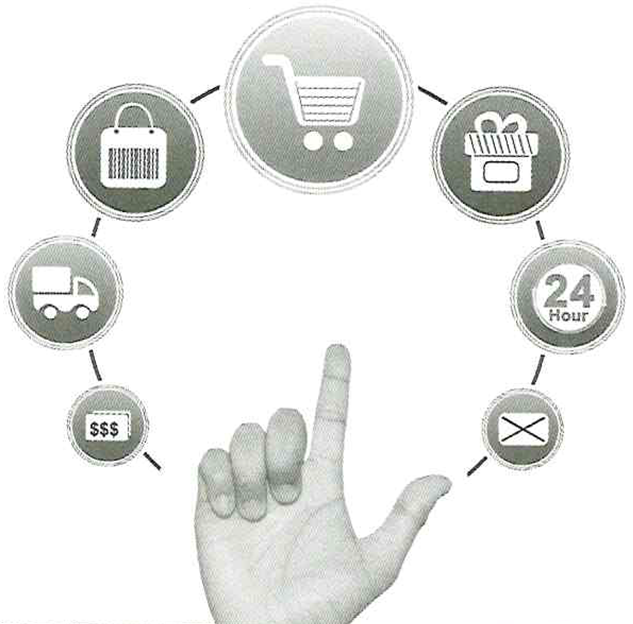
d. Write 5 sentences about what you do on a computer. Use the words from below.
כיתבו חמישה משפטים על מה שאתם עושים עם מחשב. השתמשו במילים שלמטה.
subscription / surf the web / voice message / complaint / deal / order details / small print / share a post / post something / careful / receive
ex. 1. I surf the web to find out about Interesting places to see,
2. --.
3. --.
4. --.
5. --.
6. --.
*112*
Part 3 - Seeing Is Believing
Reading - student’s book, page 110, exercise a.
New words
Write the words below next to their meaning. If you do this correctly, the words will be in alphabetical order.
כיתבו את המילים שלמטה ליד הפירוש שלהן. אם תעשו זאת נכון, המילים יופיעו לפי סדר האלפבית.
1. להוסיף - add
2. להרשות --
3. תשומת לב --
4. אוסף --
5. להעתיק ולהדביק --
6. ליצור --
7. כהה --
8. לעצב --
9. מהנה --
10. תמונה --
11. בפוקוס, בצורה ברורה --
make changes / perfect / tool / market (v) / professional (adj) / light / special effect / play around / including
12. כולל - including
13. בהיר --
14. לעשות שינויים --
15. לשווק --
16. מושלם --
17. לשחק, להשתעשע --
18. מקצועי --
19. אפקט מיוחד --
20. כלי --
b. Find at least 2 words in exercise a. that are connected to design, photography or both, and complete the lists below.
מיצאו לפחות שתי מילים בתרגיל a שקשורות לעיצוב, לצילום או לשניהם והשלימו את הרשימות למטה.

Photography: --
Both: create, --
*113*
Words, words, words - after student’s book, page 113
a. 1. Circle the 3 words that can follow the words in brackets.
הקיפו שלוש מילים שיכולות לבוא אחרי המילים שבסוגריים.
ex. 1. (professional): (photographer, coach, training) stores
2. (enjoyable): lesson movie trip attention
3. (make): mistakes changes homework decisions
4. (add): salt and pepper morning details comments
5. (create): a parent a design a story a webpage
6. (include): information weather examples photos
7. (copy and paste): a photo a mouse a sentence a link
a. 2. Write at least 5 sentences with the words in exercise a.1.
כיתבו לפחות חמישה משפטים עם המילים שיצרתם בתרגיל a.1..
ex. 1. My mother is a professional photographer.
2. --.
3. --.
4. --.
5. --.
6. --.
7. --.
b. Circle the correct answer.
הקיפו את התשובה הנכונה.
ex. 1. Isaac Mizrahi allows / (designs) / influences clothes.
2. I need to fix the closet door. Where are the collections / tools / items?
3. The architect designed / added / ordered the new museum.
4. Today, most companies add / market / check their products on the Internet.
5. Do you think Dad will afford / allow / avoid me to use his laptop?
6. Careful / Enjoyable / Professional basketball players earn a lot of money.
7. It was warm and sunny. It was a dark / perfect / careful day.
9. I found a great game while I was on sale / in focus / playing around on the computer.
10. The brand names / copy and paste / special effects in the James Bond movies are amazing.
*114*
c. 1. Complete the ad with the words below. There are two words you don't need.
השלימו את המודעה עם המילים שלמטה. ישנן שתי מילים מיותרות.
professional / attention / create / add / darker / lighter / tool / perfect
Photography Classes for All!
Taking perfect photos is easier than you think!
Sign up for our classes and you will learn how to:
a. -- albums using your digital photos
c. use digital programs to make photos look -- or --.
All of our classes are taught by -- photographers.
Click here to sign up for a class now!
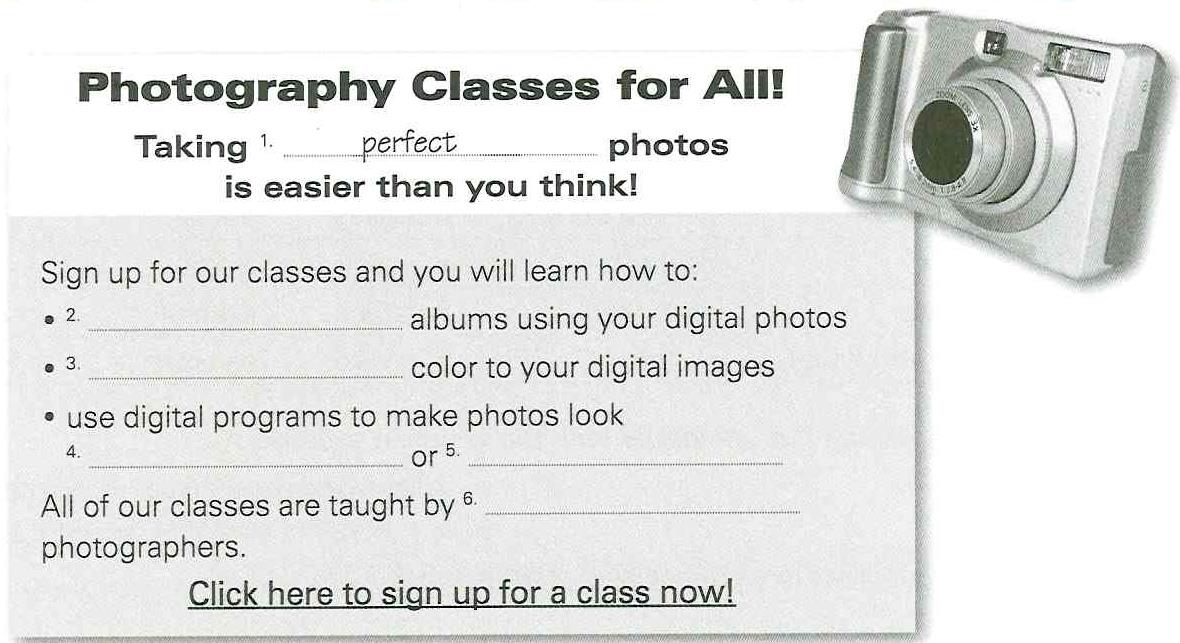
c. 2. Write sentences with the 2 words you didn't use in exercise --.
כתבו משפטים עם שתי המילים שלא השתמשתם בהן בתרגיל c.1..
d. 1. Complete the sentences about yourself. Pay attention to the words in brackets.
השלימו את המשפטים על עצמכם. שימו לב למילים שבסוגריים.
ex. 1. My parents usually (allow) me (to go out on the weekend).
2. I'd like to be a (professional) --.
3. I tried to catch the (teacher's attention), but --.
4. I have a large (collection) of --.
5. I don't like (dark) colors because --.
6. A party is (enjoyable) when --.
7. My favorite movie with (special effects) is --.
8. It's hard to stay (in focus) after --.
d. 2. Write sentences with at least 3 of the words below. --.
כיתבו משפטים עם לפחות שלוש מהמילים או הביטויים שלמטה.
*115*
e. Words that are both nouns and verbs
e. 1. Read the sentences and translate the words in brackets. Use the glossary to help you.
קיראו את המשפטים ותרגמו את המילים שבסוגריים. היעזרו במילון שבסוף הספר.
ex. 1. a. I (changed) my clothes - החלפתי
b. Did you tell us about your (change) of address? (שינוי)
a. Is this (design) original? --
b. The architect (designed) a beautiful house. --
a. Red is a good (color) on you. --
b. Her face (colored) when she saw us. --
a. I have a (fear) of heights. --
b. What do you (fear) most? --
a. Don't (blame) me if you miss the bus! --
b. If anything goes wrong, I'll take the (blame). --
a. I don't want any (comments) about my new haircut. --
b. The movie director (commented) on the actor's work. --
e. 2. Write your own sentences with the words in brackets above. Use each word once as a noun and once as a verb.
כיתבו משפטים משלכם עם המילים שבסוגריים שלמעלה. השתמשו בכל מילה פעם אחת כשם עצם ופעם אחת כפועל.
ex. 1. a. I made a lot of changes to my email. (noun)
b. I changed my clothes and went to a party. (verb)
2. a. --. (noun)
b. --. (verb)
3. a. --. (noun)
b. --. (verb)
4. a. --. (noun)
b. --. (verb)
5. a. --. (noun)
b. --. (verb)
6. a. --. (noun)
b. --. (verb)
*116*
Language - Adverbs - after student’s book, page 114
a. Underline the adverb in each sentence.
מיתחו קו מתחת לתואר הפועל (adverb) בכל משפט.
ex. 1. The teens spoke (politely - underlined) to the adults.
2. The game ended well.
3. The airplane landed late.
4. The bus arrived quickly.
5. I said goodbye sadly to my friends.
6. She plays the guitar beautifully.
7. They walked fast.
8. He hurt his foot badly.
הסתכלו בכל תמונה והקיפו את תואר הפועל(adverb) המתאים במשפט.
בחורה רצה מהר בפארק
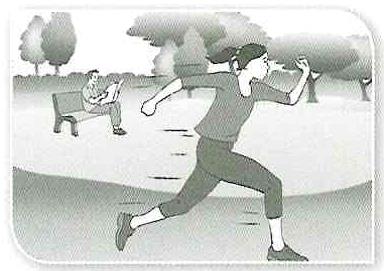
ex. Carole is running slowly / (fast).
שתי בחורות נכנסות בשקט ב-1 בלילה הביתה.
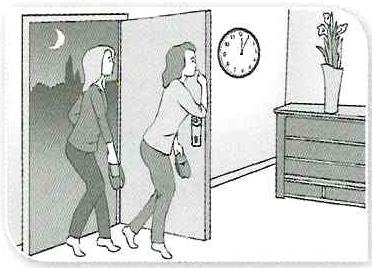
Mom was sleeping so we walked quietly / noisily into the house.
זמרת שרה וקהל אוטם אוזניים
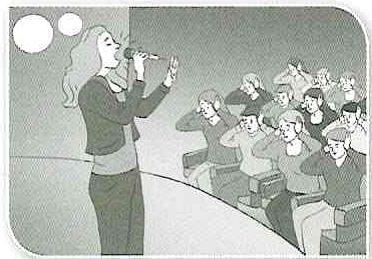
The singer sang so loudly / softly!
בחור חושב לעצמו שהוא מאד מתרגש כי קיבל 100 במבחן.
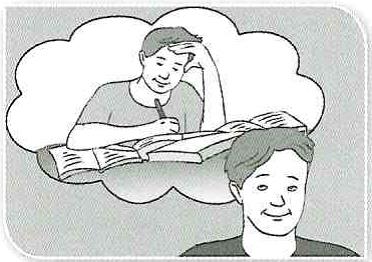
I am so excited! I got a 100 on my test. I worked hard / badly.
בחורה מאושרת מקבלת גביע.
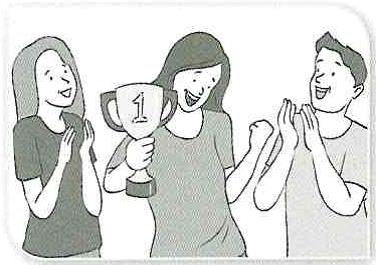
She happily / sadly received her prize.
*117*
c. 1. Complete the adverbs below. Then circle them in the puzzle. Check your answers in the glossary.
השלימו את תארי הפועל (adverbs) למטה. לאחר מכן, הקיפו אותן בתפזורת. בידקו את תשובותיכם במילון שבסוף הספר.
A B N O I S I L Y N V B
D E Y R I W P S E S F K
C A R E F U L L Y W A L
Q U I C K L Y S R Q S S
V T (L U C K I L Y) R T U
W I M M E D I A T E L Y
E F S A D L Y X E A M T
L U N T P S Q R Z S R C
L L Q U I E T L Y I H P
S L O W L Y G Z H L K G
C Y Z Q G P V C H Y T D
Adjectives - Adverbs
ex. 1. lucky - luckily
2. beautiful --
3. good --
4. sad --
5. fast --
6. noisy --
7. quick --
8. careful --
9. slow --
10. quiet --
11. immediate --
12. easy --
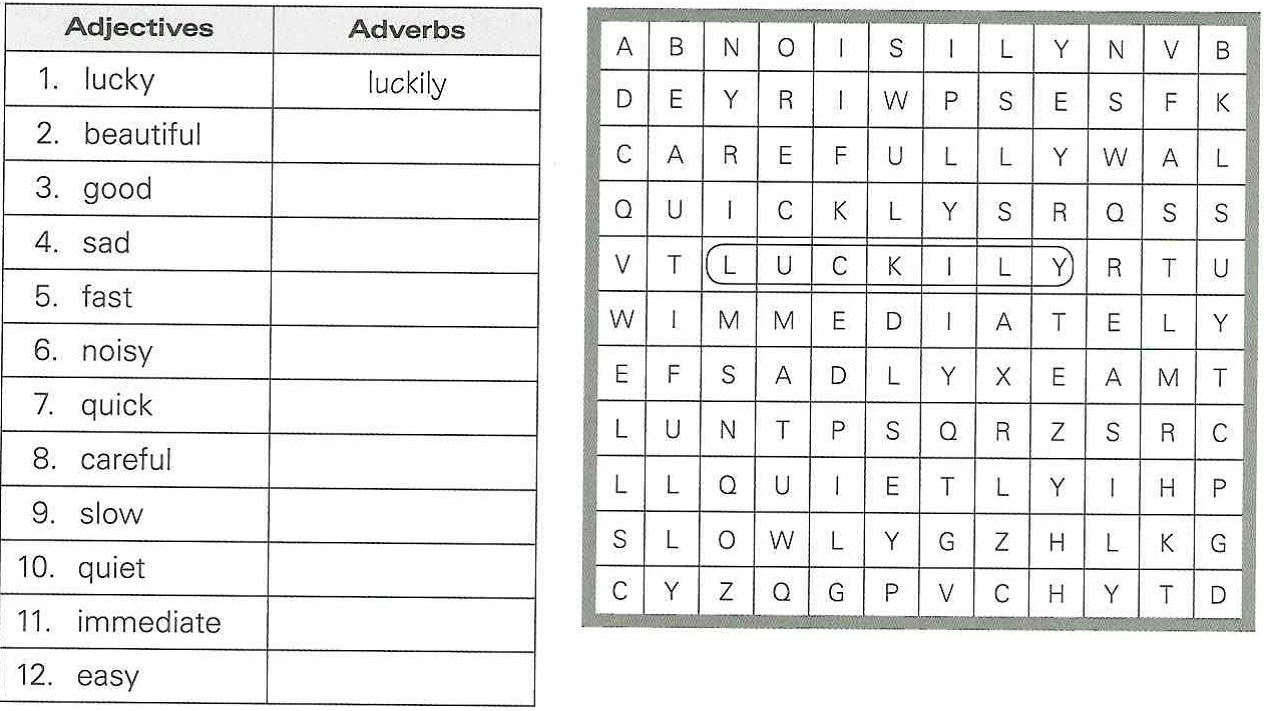
c. 2. Complete the sentences with the adverbs in exercise c.1.
השלימו את המשפטים עם תארי הפועל שבתרגיל c.1..
ex. 1. (Luckily) we didn't miss the bus this morning.
2. You must drive more --. You are driving 120 kilometers per hour!
3. They made a lot of noise. They spoke --.
4. It was not difficult. He found the address --.
5. Come --! There's a beautiful bird in the tree.
6. Usain Bolt can run very --.
7. They dance -- together.
8. The baby went to sleep -- after playing the whole afternoon.
9. Everyone was sleeping so I listened to the music --.
10. Jake paints --. His paintings are excellent.
11. Dalila sings --. Everyone loves to listen.
12. He told us -- that he didn't win the game.
3. Choose 3 adverbs from the list above and write a sentence with each.
בחרו שלושה תארי פועל מהרשימה שלמעלה וכיתבו משפט עם כל אחד מהם.
ex. 1. They walked quickly.
2. --
3. --
4. --
*118*
Part 4 - Story: The Landlady
New words (1) - student's book, page 115, exercise a
a. Write the words below next to their meaning. If you do this correctly, the words will be in alphabetical order.
כיתבו את המילים שלמטה ליד הפירוש שלהן. אם תעשו זאת נכון, המילים יופיעו לפי סדר האלפבית.
comfortable / close by / make up one's mind / exactly / immediately / catch someone's attention / inexpensive / local / landlady / certainly gentle / bed and breakfast / line / law
1. לינה וארוחת בוקר - bed and breakfast
2. לתפוס את תשומת לבו של מישהו --
3. בהחלט --
4. קרוב --
5. נוח --
6. בדיוק --
7. עדין --
8. מיד --
9. לא יקר, זול --
10. בעלת הבית --
11. חוק --
12. שורה --
13. מקומי --
14. להחליט –
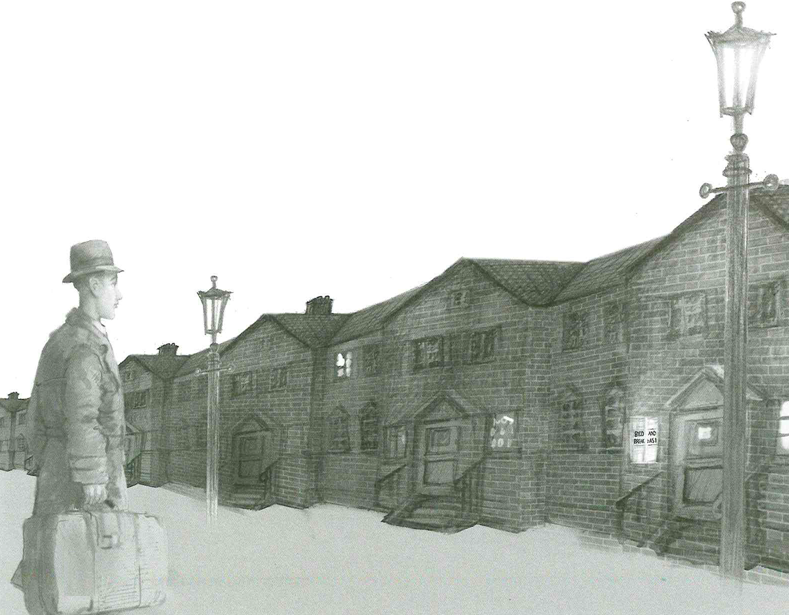
*119*
offer (v) / visitor / set out / stare at / suddenly / pickup / sign (n) / welcoming smile / seem pleasant / sign (v) / nervous / take a look
15. עצבני - nervous
16. להציע --
17. להרים --
18. נעים, מהנה --
19. להיראות, לעשות רושם של --
20. לצאת לדרך --
21. שלט --
22. לחתום --
23. לבהות ב-, לנעוץ מבט ב.. --
24. פתאום --
25. להעיף מבט --
26. מבקר --
27. חיוך מקדם בברכה --
b. Find at least 3 words in exercise a. that can describe:
מיצאו לפחות שלוש מילים או ביטויים מתרגיל a שיכולים לתאר:
1. a person: gentle, --
2. a place to stay: --
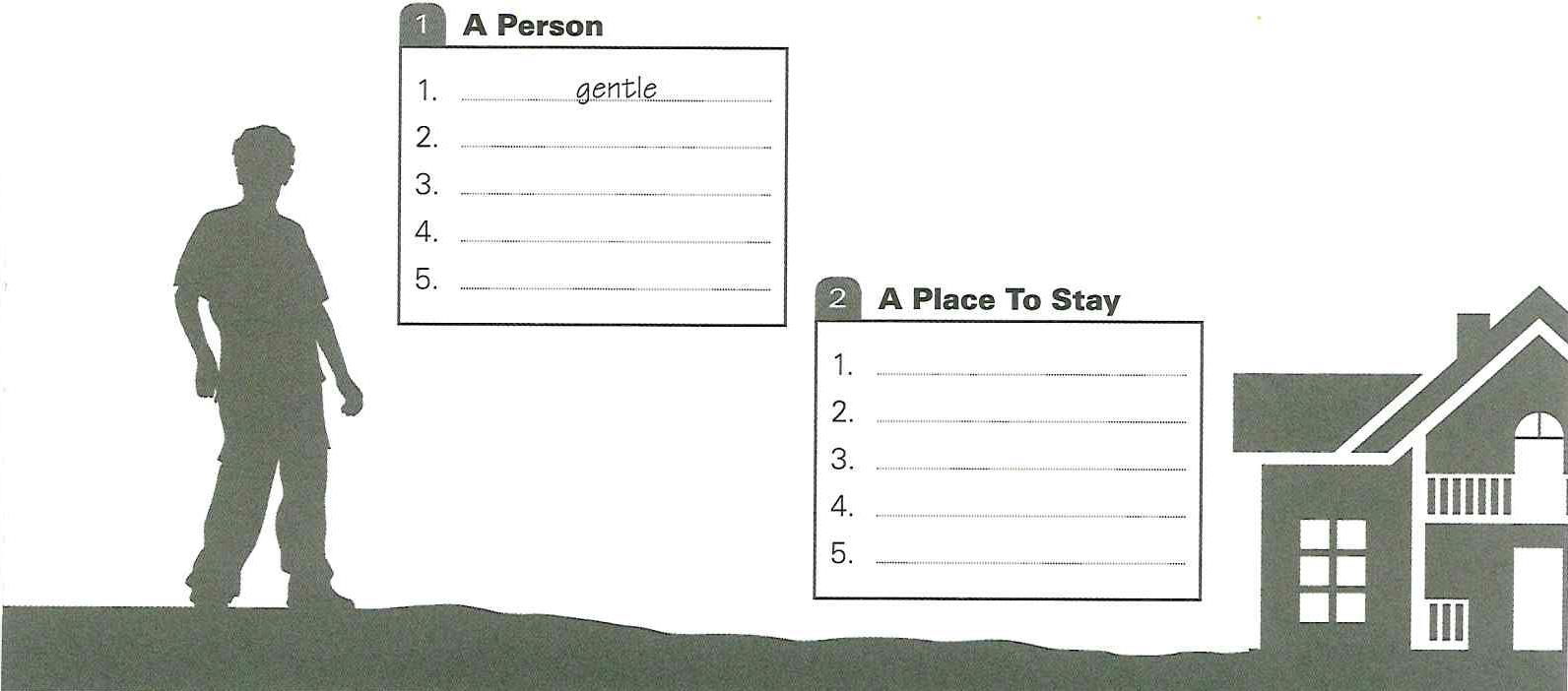
*120*
New words (2) - student’s book, page 118, exercise a.
a. Write the words below next to their meaning. If you do this correctly, the words will be in alphabetical order.
כיתבו את המילים שלמטה ליד הפירוש שלהן. אם תעשו זאת נכון, המילים יופיעו לפי סדר האלפבית.
aloud / handsome / charming / fooled / fascinating / die / familiar / gently
1. בקול - aloud
2. מקסים --
3. למות --
4. מוכר --
5. מרתק --
6. מולך שולל, מרומה --
7. בעדינות --
8. יפה תואר --
lately / interrupt / stuff (v) / strange / lucky / straight ahead I suppose / innocently / upstairs
9. אני מניח - I suppose
10. בתום לב --
11. לקטוע, להפסיק --
12. לאחרונה --
13. בר מזל --
14. ישר קדימה --
15. מוזר --
16. למלא --
17. בקומה למעלה --
b. Find at least 2 words or expressions in exercise a. that fit in each category below.
מיצאו לפחות שתי מילים או ביטויים מתרגיל a שמתאימים לכל קבוצה שלמטה.
1. verbs: die, --
2. adjectives: --
3. adverbs: --
*121*
Vocabulary - after student's book, basic understanding, page 121
a. Circle the correct answer according to Part 1 of the story "The Landlady" on pages 116-118 of the student's book. Pay attention to the words in brackets.
הקיפו את התשובה הנכונה לפי החלק הראשון של הסיפור The Landlady בעמודים 116-118 בספר הלימוד. שימו לב למילים שבסוגריים.
ex. 1. Billy Weaver came to Bath to work in the (local) --.
a. hotel, (b.) office
2. The porter at the station told Billy about an (inexpensive) --.
a. hotel, b. bed and breakfast
3. Billy noticed a bed and breakfast (sign) --.
a. at the train station, b. in the window of a house
4. Billy was very (nervous). This was the first time he was --.
a. staying in a boarding house (בית הארחה), b. going to work away from home
5. Billy (made up his mind) and --.
a. rang the doorbell, b. walked to the Bell and Dragon
6. When Billy looked through the window, -- (caught his attention).
a. a sleeping dog and parrot, b. some people
7. The landlady gave Billy a (welcoming smile). She seemed very --.
a. friendly, b. angry
b. Match A to B. Look at part 2 of the story "The Landlady" on pages 119-121 of the student's book to help you. Pay attention to the words in brackets.
התאימו את A ל-B. היעזרו בחלק השני של הסיפור The Landlady בעמוד 119-121 בספר הלימוד. שימו לב למילים שבסוגריים.
A
1. Billy felt (lucky)
2. According to the landlady, the two men were (handsome) and looked like
3. The landlady kept (interrupting) Billy's thoughts about
4. The landlady (prepared)
5. Billy thought it was (fascinating) that the landlady
6. When the landlady tells Billy the two men are (upstairs),
7. Billy realizes that he is probably going to (die)
B
-- a. the two men
ex. 1. b. to find a room.
-- c. Billy.
-- d. he is shocked.
-- e. tea and biscuits.
-- f. at the end of the story.
-- g. stuffed her pets.
*122*
c. Circle the correct answer.
הקיפו את התשובה הנכונה.
ex. 1. Please take a look / (pick up) / prepare the books. They are on the floor.
2. Gently / Suddenly / Carelessly, the lights went out.
3. The teacher told the students to stand in a law / line / style.
4. Ben has some very gentle / lucky / strange ideas. I don't always understand him.
5. The Israel Museum is very popular. Every year, thousands of orders / visitors / objects go there.
6. Bobby tried to explain what happened, but his sister kept entering / interrupting / stuffing him.
7. Grandma gave us a stare / welcoming smile / complaint. She was so happy to see us.
8. Megan gets very nervous / pleasant / professional before she has to go to the dentist.
9. Walk straight ahead / close by / in focus for two blocks and you'll find the library.
10. My mom warned me not to be fooled / set out / played around by ads.
d. Match the sentences in A to the sentences in B. Pay attention to the words in brackets.
התאימו את המשפטים ב-A למשפטים ב-B. שימו לב למילים שבסוגריים
A
1. Tom (stared at) his friend Sue and laughed.
2. My best friend lives (close by).
3. Pay attention to road (signs).
4. We (set out) early for Eilat.
5. These running shoes are so (comfortable).
6. Sam couldn't (make up his mind).
7. The ambulance came almost (immediately).
8. Please (take a look) at your work again.
B
-- a. He didn't know which backpack to buy.
ex. 1. b. She was wearing a funny hat.
-- c. They can save lives.
-- d. You didn't answer all the questions.
-- e. It takes me two minutes to walk to her house.
-- f. It arrived within two minutes.
-- g. We left at 5:00 in the morning.
-- h. I can wear them all day.
*123*
e. 1. Complete the sentences with the words below.
השלימו את המשפטים עם המילים שלמטה.
suddenly / aloud / stuff / gentle / upstairs / lately / certainly
ex. 1. He didn't remember anything because the accident happened so (suddenly).
2. She ran -- to her bedroom and brought down her laptop.
3. The mother read the story -- to her children before bed.
4. “Can you help me?” I asked, “--“, she answered.
5. My dog is very -- with children. He plays and does not bite.
6. Don't -- your bag with so many things. It will break.
7. I haven't seen my best friend --. He was sick.
e. 2. Complete the sentences with the words below.
השלימו את המשפטים עם המילים שלמטה.
innocently / bed and breakfast / charming / familiar / gently
ex. 1. He lifted the baby up (gently).
2. My parents are staying at a -- in the north.
3. There are several -- restaurants in this town.
4. “Did I do anything wrong?” asked the little boy --.
5. I think I know you. Your face looks --.
f. Complete the sentences. Pay attention to the words in brackets.
השלימו את המשפטים. שימו לב למילים שבסוגריים.
ex. 1. I had a (pleasant) day because (I met my friends).
2. People who break the (law) should --.
3. My (local) mall --.
4. He didn't answer his phone, so I (suppose) --.
5. I saw this (charming) movie about --.
6. Don't (stare at) --.
g. At the end of the story, Billy realizes what the landlady is planning to do. Write a continuation to the story telling what happens next. Use at least 4 of the words below.
בסוף הסיפור, בילי מבין מה מתכננת בעלת הבית לעשות. כיתבו המשך לסיפור כשאתם מספרים מה קורה לאחר מכן. השתמשו לפחות בארבע מהמילים שלמטה.
offer / strange / stare at / innocently / catch someone's sign / suddenly / familiar / landlady / attention / die / nervous / fooled / charming
A strange thing happened. --.
*124*
Unit 4 - Review - after student’s book, page 125
Vocabulary
a. Circle the correct answer.
הקיפו את התשובה הנכונה.
ex. 1. Would you like pizza with olives or with onions? It's your(choice) / stuff.
2. Carelessly / Suddenly, it began to snow.
3. Julie was very gentle / upset when she broke her cellphone.
4. He has to fill in his details / collection to open a bank account.
5. I try to avoid / pressure supermarkets on Fridays. There are too many shoppers.
b. Circle the word or expression that does NOT belong in each category.
הקיפו את המילה או הביטוי שלא שייך לכל קבוצה.
Computers: social media / post / allow
Shopping: payment / upstairs / half price
Taste: salty / spicy / smelly
Ads: rip off / small print / value
c. Write an answer for each of the questions below. Pay attention to the words in brackets. Write complete sentences.
כיתבו תשובה לכל אחת מהשאלות שלמטה. שימו לב למילים שבסוגריים. כיתבו משפטים שלמים.
ex. 1. What can you (check)?
I can check my homework to see if there are any mistakes.
2. What can you buy (on sale)? --.
3. What can you try to (convince) your parents to do? --.
4. What should you try to (avoid)? --.
d. Write two sentences with the word ‘design’, once as a noun and once as a verb. --.
כיתבו שני משפטים עם המילה design: פעם אחת בתור שם עצם ופעם אחת בתור פועל.
1. --. (noun)
2. --. (verb)
2. Does your language have words that can be both a noun and a verb? --.
האם יש בשפתכם מילים שיכולות להיות גם שם עצם וגם פועל?
*125*
Grammar
e. Circle the correct relative pronoun. Then match A and B to make sentences.
הקיפו את כינוי הזיקה (relative pronoun) המתאים. לאחר מכן, התאימו בין A ל-B כדי ליצור משפטים.
A
1. That is the store when / (where)
2. There is the coach who / which
3. We were very sad when / who
4. This is the place where / which
5. This is the cat which / where
6. Is she the teacher that / where
7. have a friend who / which
8. I buy sports gear when / which
B
-- a. our neighbors moved to another city.
ex. b. 1. I bought my boots.
-- c. is an amazing photographer.
-- d. we got at the animal shelter.
-- e. taught you Arabic?
-- f. we put up our tent.
-- g. is comfortable to wear.
-- h. trains the football team.
f. Write the adverb form of each adjective below.
כיתבו את צורת תואר הפועל (adverb) של כל שם תואר (adjective) שלמטה.
ex. 1. angry - angrily
2. easy --
3. loud --
4. good --
5. hard --
6. quiet --
7. carful --
8. fast --
2. Use adverbs from exercise f.1. to complete the sentences below.
השתמשו בתארי הפועל מתרגיל f.1. כדי להשלים את המשפטים שלמטה.
ex. 1. The firefighters worked (hard) to put out the fire.
2. Don't speak -- in the library.
3. Can you play --? I'm trying to study.
4. They ran too -- and fell down.
5. Does she drive -- or dangerously?
6. Did you find the park --?
7. He wrote his story -- and won a prize.
8. The man shouted -- at the bus driver who did not stop.
Choose 4 adverbs from exercise f.1. and write a sentence with each.
בחרו ארבעה תארי פועל מתרגיל f.1. וכיתבו משפט עם כל אחד מהם.
ex. 1. She spoke loudly.
2. --
3. --
4. --
5. --
*126*
Writing
c. An online company asked customers to review their products and service. Match the sentences in A to B.
חברה שמוכרת מוצרים דרך האינטרנט מבקשת מלקוחותיה לתת חוות דעת על מוצריה ועל השרות שלה. התאימו את המשפטים ב- A ל- B.
Product
A
1. I'm not happy with the jeans.
2. I love the headphones.
3. I love the make-up.
B
-- a. It makes me look good.
ex. 1. b. They are too short.
c. They work really well.
Service
A
I was happy with the service.
The service was bad.
The service was OK.
-- a. The shoes I ordered were the wrong color.
-- b. But I think it could be better.
-- c. The item arrived sooner than promised.
h. Add a sentence to complete at least 5 of the online reviews. Use the words from below.
הוסיפו משפט כדי להשלים לפחות חמש מהביקורות באינטרנט. השתמשו
במילים שלמטה.
beautiful / upset /too big / fair price /worth / terrible / too small / good value / disappointed / perfect / comfortable / brand name
ex. 1. I was pleased with the sweatshirt. (It is very comfortable).
2. I'm satisfied with the sneakers that I ordered. --.
3. The item that I ordered never arrived. --.
4. I am returning the shirts. --.
5. I am happy with the backpack that I bought. --.
6. I love the scarf. --.
7. The camera doesn't work. --.
8. The phone is too big. --.
*127*
Review units 1-4 - after student’s book, page 125
Circle the correct answer.
הקיפו את התשובה הנכונה.
Vocabulary
ex. 1. Those sneakers are too expensive. I can't -- them.
(a.) afford, b. allow, c. include
2. What is your favorite -- at school?
a. product, b. subject, c. success
3. The cake that took me a long time to prepare was terrible. --
a. I don't mind., b. Can you believe it?, c. It's too good to be true.
4. Please don't laugh. What I'm telling you is --.
a. serious, b. spicy, c. safe
5. Children are often -- around people they don't know.
a. wide, b. careful, c. shy
6. Jabar helped the woman with a baby to -- the bus.
a. get off, b. pickup, c. give up
7. People can't -- without food or water.
a. get rid of, b. survive, c. trust
8. "I didn't do it," said the little boy. "Don't -- me."
a. encourage, b. convince, c. blame
9. What -- do you like to wear?
a. sports gear, b. staff, c. percent
10. The earthquake -- the village.
a. created, b. destroyed, c. beat
Grammar
ex. 1. We -- see each other anymore.
a. hard, (b.) hardly, c. usually
2. My friend was very busy. He -- speak to me.
a. isn't able to, b. mustn't, c. couldn't
3. I don't understand you. Don't speak so --.
a. faster, b. fast, c. as fast as
4. While I -- home, I met Jill.
a. walks, b. walked, c. was walking
5. Did you -- a pizza last night?
a. order, b. ordered, c. orders
6. They always -- prices before they buy anything.
a. comparing, b. compares, c. compare
7. Do you remember the time -- we went on vacation together?
a. when, b. who, c. which
They didn't -- anything online.
a. buys, b. bought, c. buy
I prefer this chair. It's -- than the others.
a. the most comfortable, b. more comfortable, c. not as comfortable as
I don't remember the name of the book -- I got as a present.
a. who, b. which, c. where
*128*
Independent reading 1 - after student’s book, page 125
a. Read the article.
(השורות מחולקות וממוספרות לפי ספר הדפוס, מספר השורה יבוא בסוגריים בתחילת השורה)
Money Lessons in School - Yes or No?
(1) How much does your cellphone cost every month? How often do you buy new clothes?
(2) Do you know how much do you spend every month? Some British teens can probably
(3) answer these questions easily. That's because many British schools are teaching a new
(4) subject - money! In addition to maths, history, English and all the other subjects, there
(5) are now lessons in British schools on how to manage money.
(6) Many teens in the U.K. get pocket money from their parents every week. Some have
(7) jobs after school or at the weekend. The problem is that many teens spend their money
(8) quickly and without thinking. That's why many schools started a school programme
(9) for teens on how to manage their money.
(10) These are some of the topics that students learn in each lesson:
Lessons / Topics
How to manage your money / Don't spend more money than you have.
How not to waste money / Check prices. Think before you buy.
Where and how to buy / Find out where prices are the best. Learn the best way to pay for what you buy.
How to plan and save for the future: Save money for a time when you will need it.
These teens learn how to spend money wisely and save money for the future.
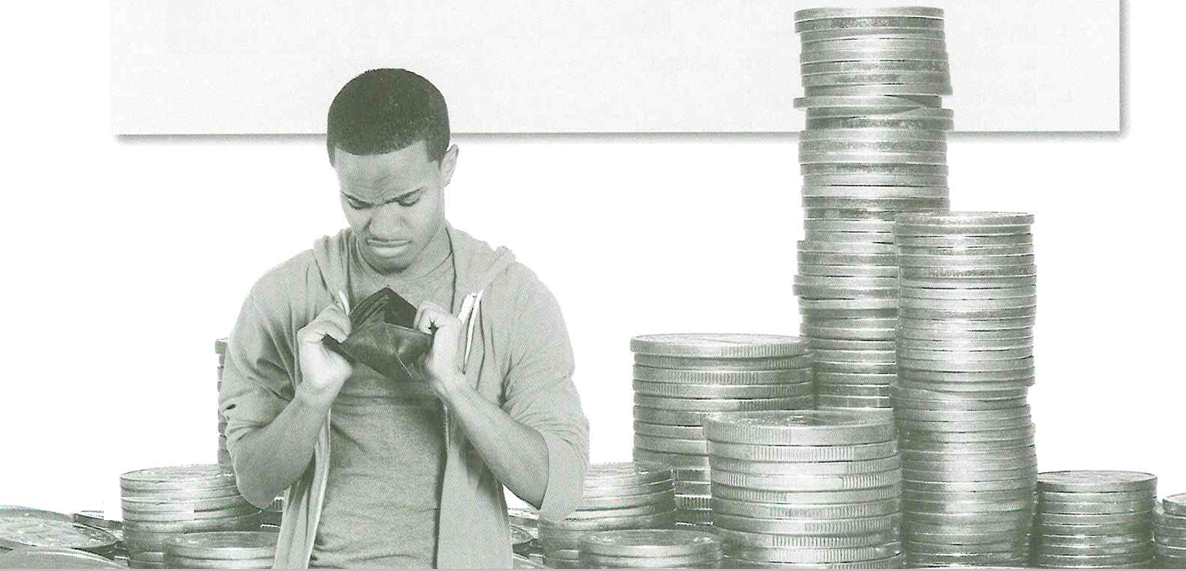
*129*
b. Answer the questions about the article on page 128.
1. What new subject do many British students learn? --.
2. Name two ways British teens get their pocket money. --.
3. Why did many British schools start the programme? --.
4. In which lesson will students learn…?
a. how to pay --
b. to look at different prices carefully --
c. Which lesson will each person take? Find the information in the article.
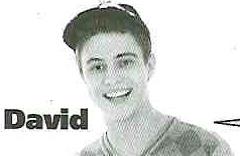
David: I work after school three times a week. I want to learn how to save enough money to buy an electric bike next year.
Lesson: --.
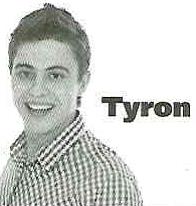
Tyron: No matter how much money I have at the beginning of the week, I spend it all by the middle of the week. I don't even know what I spend so much money on.
Lesson: --.

Mandy: I love buying scarves, belts and hats.
I have so many - I don't have time to wear them all!
Lesson: --.
What about you?
1. Do you think learning how to manage your money in school is a good idea? Explain why or why not. --.
2. Would you be interested in taking lessons about money in school? --.
*130*
Independent reading 2 - after student’s book, page 125
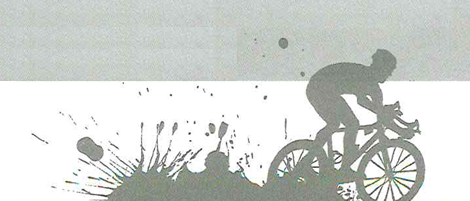
a. Read the article.
Raising Money for Others
Would you like to cycle for charity and meet people?
Here are two events that bring people together and also raise money for different organizations.
The Israel Ride
This ride takes place once a year. Cyclists from all over the world cycle from Jerusalem to Eilat over 5-7 days. This year, Steve was one of the cyclists from Texas. He says that bike riding is the best way to see the beautiful views in Israel.
Steve also rides because he wants to help the two organizations that organize the event. The first organization, Hazon, is an American Jewish group. Hazon raises money to help the environment. The second organization is the Arava Institute for Environmental Studies. They teach young people from different countries how to protect the environment.
The Israel Ride raises money to help Israeli, Palestinian and Jordanian students pay for their studies at the Arava Institute. In 2015, more than one hundred new riders took part in the event. Fifty-seven students from the Arava Institute and thirty families rode to support peace and the environment in the desert. They raised more than 650,000 dollars.
Bike for the Fight
When Israeli born Tom Peled's father died of cancer in 2011, Tom decided to start a bike riding organization called Bike for the Fight. Tom wanted to raise money for cancer research. In the summer of 2013, Tom flew to California, U.S.A. He planned to cycle from Los Angeles to New York City, speaking to people about cancer along the way.
Tom spoke to groups of people in community centers and at bike events. He showed each group a PowerPoint presentation about his organization. Tom says that people were warm, friendly and ready to listen.
When Tom finally reached Manhattan, there were forty people cycling with him. In the end, Tom succeeded in raising 100,000 dollars for cancer research. In the future, Tom hopes to organize cycling events for cancer research in South America and Australia.
These cycling events are a lot of fun. But most important, they can help organizations that do a lot for other people.
*131*
b. Complete the ads with the words below.
raised 650,000 dollars / from Jerusalem to Eilat / raises money for cancer research / raised 100,000 dollars / raises money for students / from Los Angeles to New York City
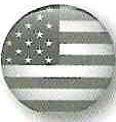
The Israel Ride: --
Bike for the Fight: --
c. Answer the questions about the article on page 130.
ex. 1. How often does the Israel Ride take place? --.
2. Give 2 reasons why Steve cycles. --.
3. How does the Hazon organization help the environment? --.
4. Circle the correct answer, true or false.
Only students from Israel study at the Arava Institute. True / False
5. Write the correct number next to each fact below.
5-7 / 57 / 30
a. The number of students who cycled in the Israel Ride in 2015. --
b. The number of families who cycled in the Israel Ride in 2015. --
c. The number of days the Israel Ride takes. --
6. What made Tom Peled set up Bike for the Fight? --.
7. Name 2 things Tom did on his journey from Los Angeles to New York City. --.
8. Complete the sentence.
In the future, Tom plans to --.
What about you?
Which ride would you like to take part in? Explain why. --.
*132*
*132*
Part 1 - Exploring our oceans - student's book, page 130, exercise a
Reading
New words
a. Write the words below next to their meaning. If you do this correctly, the words will be in alphabetical order.
כיתבו את המילים שלמטה ליד הפירוש שלהן. אם תעשו זאת נכון, המילים יופיעו לפי סדר האלפבית.
engine / international / lead (v) / darkness / creature / collect / environment / area / climate / discover / exploration / examine / explore
1. אזור - area
2. אקלים --
3. לאסוף --
4. יצור --
5. חשיכה --
6. לגלות --
7. מנוע --
8. סביבה --
9. לבדוק, לבחון --
10. חקר --
11. לסייר ולחקור --
12. בינלאומי --
13. להוביל –

*133*
underwater / lower (v) / satellite / mud / pressure (n) / natural / marine
14. להוריד --
15. ימי --
16. בוץ --
17. טבעי --
18. לחץ --
19. לווין --
20. מחת למים, תת ימי --
b. Find at least 2 words in exercise b. that are connected to:
מיצאו לפחות שתי מילים או שני ביטויים מתרגיל a שיש להם קשר ל:
1. the sea: underwater, --
the land: --,
both the above: --,
Words, words, words - after student's book, page 133
.התאימו כל משפט לתמונה. שימו לב למילים שבסוגריים.
א. צוות הצלה
ב. מרכז חקר האוקיאנוס
ג. יצורים תת מימיים
ד. צוללנים
ה. צוות צלילה עתיק
-- 1. We visited the (International) Ocean Sea Center.
-- 2. The two divers swam (underwater).
-- 3. The (exploration) of the ocean began in 1872.
-- 4. The rescue team used (satellite) maps to find the lost person.
-- 5. There are many amazing (creatures).
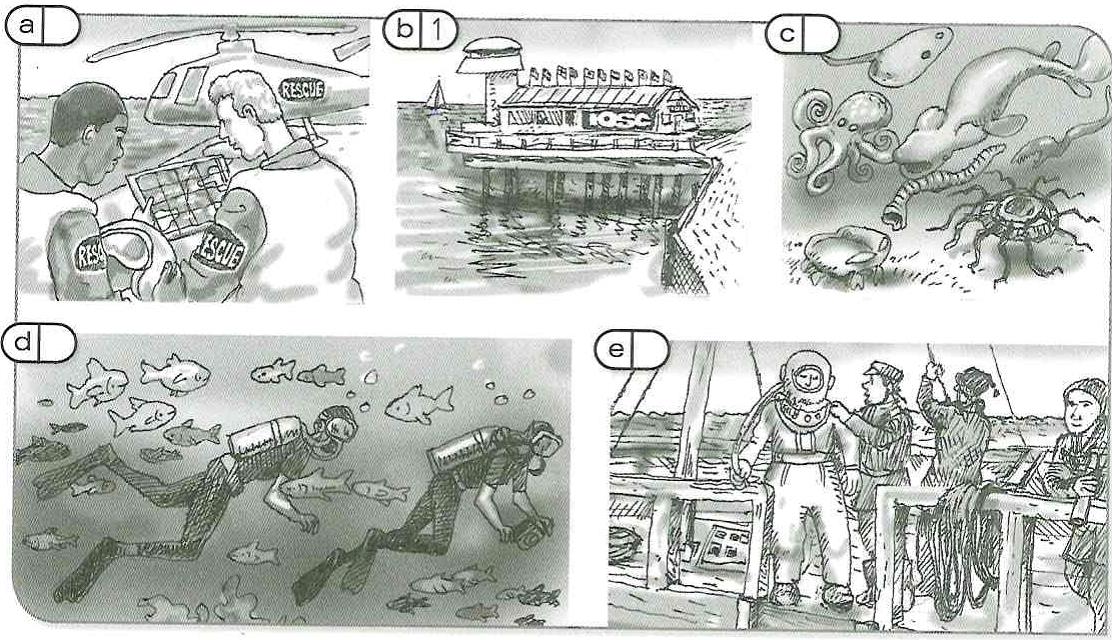
*134*
Circle the correct meaning of the words in brackets.
הקיפו את הפירוש הנכון של המילים שבסוגריים.
ex. 1. Some parks have a camping (area).
a. playground, b. grill, (c.) space
2. I (discovered) a mistake in the book.
a. wrote, b. made, c. found
3. I don't know the way, so you (lead) the group.
a. choose, b. walk in front of, c. be the last
4. We (lowered) the bookshelf.
a. put up, b. put down, c. left
5. We spent the day (exploring) our new town.
a. getting a map of, b. reading about, c. looking around
6. The doctor (examined) my eyes.
a. checked, b. gave me advice about, c. fixed
7. My mom got into her car and turned on the (engine).
a. lights, b. motor, c. windows
c. Do the quiz. Pay attention to the words in brackets. The answers are at the bottom of the page.
ענו על השאלון. שימו לב למילים שבסוגריים. התשובות נמצאות בתחתית העמוד.
Trivia
ex. 1. Which country was the first to (explore) the moon?
(a.) America
b. Russia
c. China
2. Which (area) in Israel has snow every year?
a. Mitzpe Ramon
b. the Hermon
c. Netanya
3. -- has an (underwater) observatory (מצפה).
a. Ashdod
b. Tel Aviv
c. Eilat
4. Where do fish live in complete (darkness)?
a. in the Mariana Trench
b. in the Hayarkon River
c. in the Mediterranean Sea
5. The -- is an (international) competition.
a. Kinneret Swim
b. Olympics
c. Tel Aviv Bike Ride
6. Which country has the hottest (climate)?
a. Canada
b. Singapore
c. Qatar
7. The (mud) -- is good for your skin.
a. at the Dead Sea
b. at the Kinneret
c. at the Red Sea
8. Which (creature) has eight legs?
a. an alligator
b. an octopus
c. snake
Answers: 1.a, 2.b, 3.c, 4.a, 5.b, 6.c, 7.a, 8.b
*135*
d. 1. Complete the sentences with the words below. There are two extra words.
השלימו את המשפטים עם המילים שלמטה. ישנן שתי מילים מיותרות
lower / collect / environment / pressure / reach / engine / climate / natural
ex. 1. The students are studying how to keep the environment (clean).
2. My grandfather's hobby is to -- stamps.
3. It took us two hours to -- Tel Aviv because it was raining.
4. Dad took his car to the garage. There was a problem with the --.
5. Scientists say that the world's -- is getting hotter.
6. I felt the -- in my ears at the top of the mountain.
d. 2. Write sentences with each of the 2 words you didn't use in exercise d.1. --.
כיתבו משפט עם כל אחת משתי המילים בהן לא השתמשתם בתרגיל d.1..
e. Write 3 questions to ask a marine scientist about his or her work. Use the words from below.
כיתבו שלוש שאלות לשאול מדען / מדענית ימי/ת על עבודתו / עבודתה. השתמשו במילים שלמטה.
discover / examine / least / collect / satellite / marine / collect / explore / underwater / area / creature / mud
ex. 1. How do you explore the sea?
2. --?
3. --?
f. Prefixes: sub- / inter- / under-
f. 1. Match A to B. Pay attention to the words with prefixes in brackets.
התאימו את A ל- B. שימו לב למילים שבסוגרים עם התחיליות.
A
1. The temperature was subzero.
2. Tal went through the underpass.
3. People travel on the subway.
4. Fish live in the underwater cave.
5. It is an international company.
B
-- a. They take the train.
-- b. It has offices all over the world.
ex. 1. c. It was freezing cold.
-- d. The divers love to explore there.
-- e. He walked to the other side of the road.
f. 2. Choose 2 words with a prefix in exercise f.1. and write a sentence with each. --.
בחרו שתי מילים עם תחילית מתרגיל f.1. וכיתבו משפט עם כל אחת מהן.
ex. 1. When we visited New York we took the subway.
*136*
Language
The future with ‘will’ and ‘be going to’
The future with ‘will’
a. Circle the verb in each sentence. Then underline the time expression.
הקיפו את הפועל בכל משפט. לאחר מכן, מיתחו קו מתחת לביטויי הזמן.
ex. 1. The students (will have) a math test (next week - underlined).
2. I will meet you at the gym later.
3. It will snow tomorrow night.
4. In the future people won't drive cars.
5. The lesson will finish soon.
6. Will you compete in the race next year?
7. They will go to London in the summer.
8. They won't study Art next year.
b. Complete the dialogues with the positive or negative form of the verbs in brackets. Use the future with ‘will’.
השלימו את השיחות בצורת החיוב או השלילה של הפעלים שבסוגריים. שתמשו בעתיד עם will.
ex. 1. Dina: Will Tom go (go) on the class trip next week?
Ella: No, he -- (not go) on the class trip. He hurt his leg.
2. Anat: Uri, there isn't any fruit left.
Uri: No problem. I -- (get) some at the market on my way home tonight.
3. Sam: I'm planning to buy a set of drums.
Dad: Umm… the neighbors -- (complain).
4. Mom: you -- (phone) me when you and Dave get to the Kinneret?
Gil: Sure, but don't worry. We -- (be) fine.
5. Sue: I'm glad you spent the weekend with us, Lara.
Lara: Thanks! When -- you (visit) me?
6. Mike: -- we -- (finish) work at 4 o'clock today?
Boss: No, Mike. We -- (not finish) at 4 o'clock today. We -- (finish) at 6 o'clock.
*137*
c. Sue will begin high school next year and is thinking about what it will be like. Write the questions she asks herself. Use the future with ‘will’ and the words below.
סו תתחיל ללמוד בבית ספר תיכון בשנה הבאה והיא חושבת איך זה יהיה. כיתבו שאלות שהיא שואלת את עצמה. השתמשו בעתיד עם will ובמילים שלמטה.
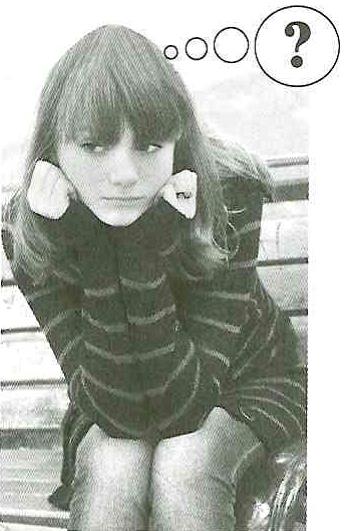
2. which subjects / I /study: --?
3. we / get / a lot of homework: --?
4. which sports / the girls / play: --?
5. how / I / get to school: --?
d. Complete the sentences about the future of sea exploration. Use ‘will’ / ‘won't’. You can use expressions from below or add your own ideas.
השלימו את המשפטים על עתיד חקר הימים. השתמשו ב- will / won’t. אתם יכולים להשתמש בביטויים שלמטה או להוסיף רעיונות משלכם.
reach new places / discover new seas / visit underwater hotels / discover new creatures / find new medicines / live underwater / travel by submarine / be much cleaner
ex. 1. People will travel by submarine.
2. Scientists --.
3. Explorers --.
4. Doctors --.
5. Travelers --.
6. The world --.
The future with ‘be going to’
a. Complete the sentences with the correct form of be going to and the verbs in brackets.
השלימו את המשפטים עם הצורה המתאימה של be going to והפעלים שבסוגריים.
ex. 1. The train is going to arrive (arrive) in Hadera in five minutes.
2. It -- (be) very hot later today.
3. The athletes -- (run) a marathon next week.
4. I -- (to go) diving tomorrow.
5. The astronauts -- (explore) new planets.
*138*
b. Complete the sentences with ‘be going to’ in the positive, negative or question form and the verbs below.
השלימו את המשפטים עם be going to בצורות החיוב, השלילה והשאלה ועם הפעלים שלמטה.
not have / come / miss / not swim / see / go shopping / tell / walk
ex. 1. Our English teacher is sick. I am not .going to have an English test today.
2. Someone is at the door. Dad -- who it is.
3. Ofri's mom can't drive her to school today so she --.
4. My friends and I are on our way to the mall. We --.
5. My party is on Thursday -- you --?
6. The water is too cold. I -- today.
7. We couldn't get tickets to the concert. We -- it.
8. -- you -- your parents you broke the window?
כיתבו משפט לכל תמונה על מה שדן יעשה או לא יעשה באילת.
1. לישון על החוף
2. לפגוש חברים
3. לא לרקוד
4. להפליג
5. לצלול

ex. 1. Dan is going to sleep on the beach.
2. --.
3. --.
4. --.
5. --.
Present progressive with future meaning
a. Complete the sentences with the present progressive form of the verbs in brackets.
השלימו את המשפטים עם צורת ה- present progressive של הפעלים שבסוגריים.
ex. 1. The train to Dimona is leaving (leave) in ten minutes.
2. I -- (work) tonight.
3. My class -- (volunteer) at the hospital next Thursday.
4. The girls -- (practice) for the concert.
5. I -- (not get up) at six tomorrow. It's too early.
6. -- Tim -- (collect) money for a gift later today?
7. I -- (meet) my friend at the mall after school.
8. We -- (not have) pasta tonight - we -- (have) it tomorrow.
*139*
Johnny wrote an email to his friend Alex in England about his summer plans. Complete Johnny’s email with the present progressive form of the verbs in brackets.
ג'וני כתב אימייל לחבר שלו אלכם באנגליה על התוכניות שלו לקיץ. השלימו את האימייל של ג'וני עם צורת ה- present progressive של הפעלים שבסוגריים.
Hi Alex,
The school year ends in a few weeks and I am making (make) plans for the summer vacation. My brother, Guy, and I -- (go) to a summer camp that is on the seashore near to Tel Aviv. I -- (take) the windsurfing course that I wrote to you about. Guy -- (plan) to take a surfing course. What -- you -- (do) this summer? How about checking out this camp online? I know that kids from different countries go to this camp, too. It would be great if we could spend the summer together!
Love,
Johnny
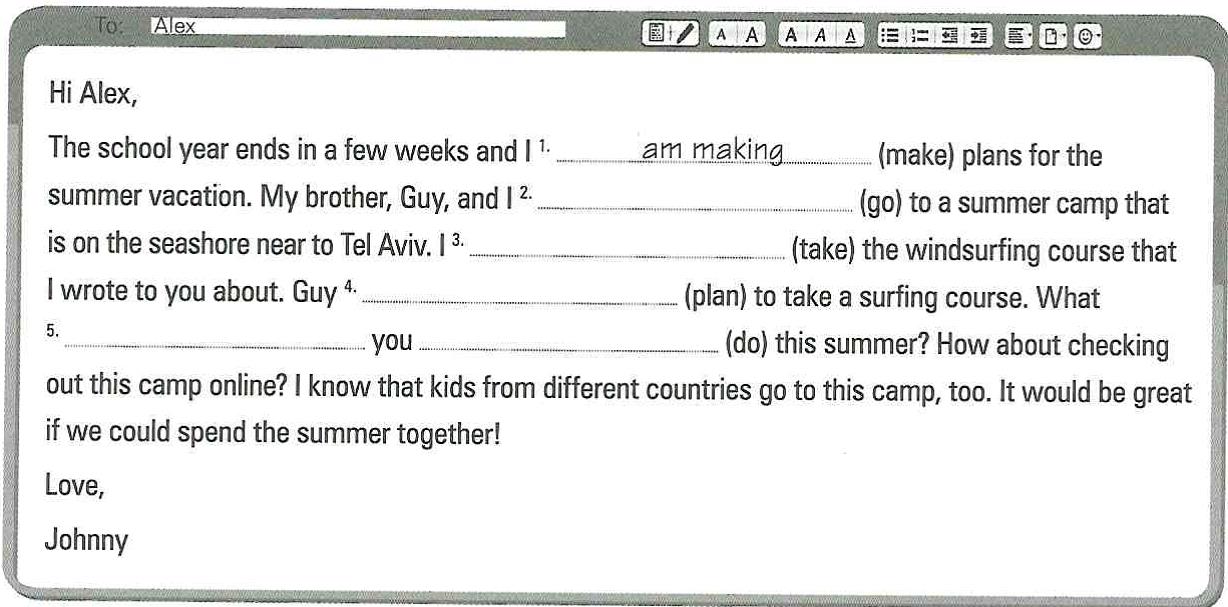
The future
Answer the questions about the future. Pay attention to the tense in each question.
ענו על השאלות על העתיד. שימו לב לזמן בכל שאלה.
ex. 1. What are you doing tonight?
I am playing tennis with some friends.
2. What is your family going to do this weekend? --.
3. Will you be free on Tuesday afternoon? --.
4. Which movie are you going to see soon? --.
5. What will you do in the summer vacation? --.
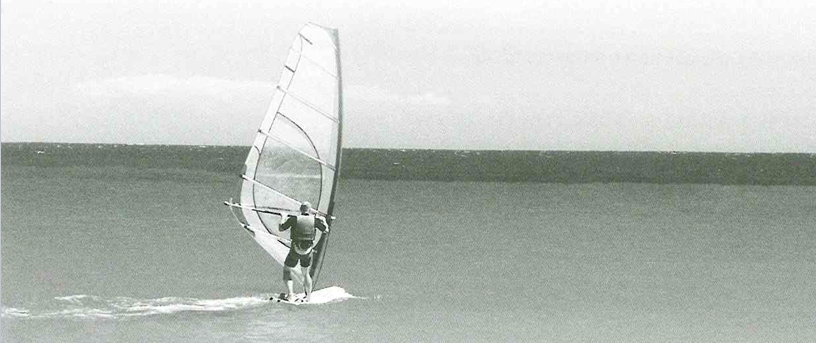
*140*
Writing - Describe future plans - after student’s book, page 138, exercise d
a. 1. Read the email below and label the parts with the words below.
קיראו את האימייל שלמטה וסווגו את החלקים לפי המילים שלמטה.
dosing sentence / sentences giving details / examples opening sentence
To: Sarit
Subject: End-of-year party
Hi!
-- 1. I read your ideas about the end-of-year party and they sound great!
-- 2. (First), I’ll send out the invitations to all the students in our class. Then we’ll kmow who is planning to come. After that, I’m going to ask some student’s to help us decorate, and I’m sure there are some people who will be happy to organize the music.
-- 3. Finally, I’ll get everyone to bring some snacks or some soft drinks. In the end, I’m sure this party will be fantastic!
See you there!
Dalia
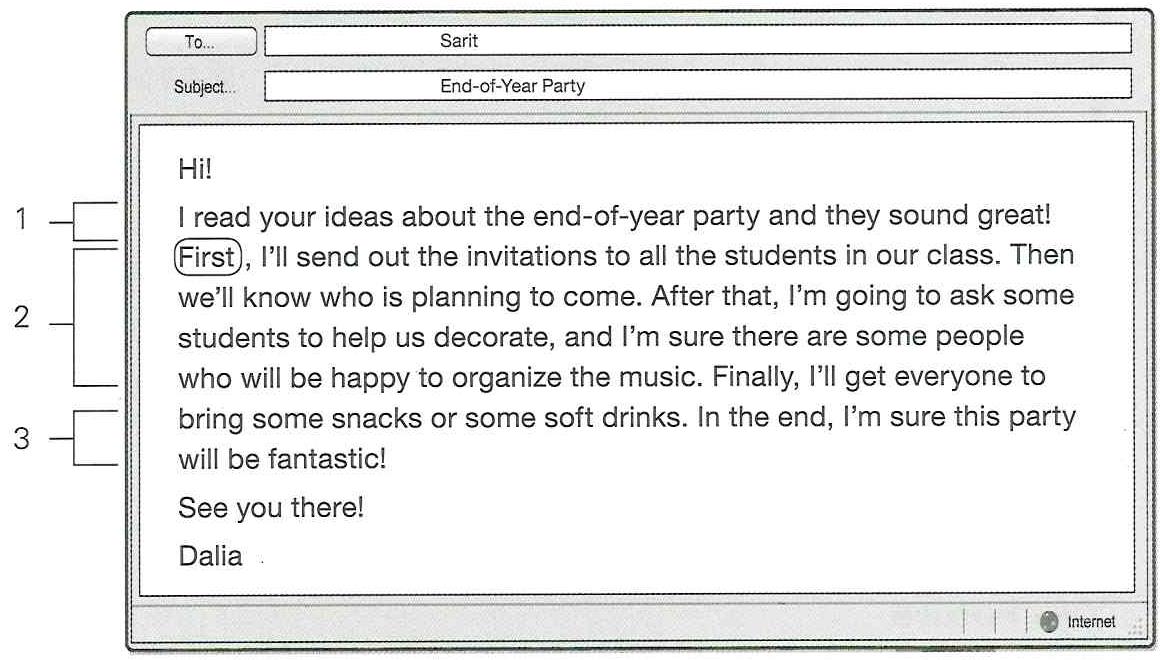
a. 2. Circle the five connectors of sequence in the email above.
הקיפו את מילות החיבור המציינות רצף באימייל שלמעלה.
a. 3. Answer the questions about the email.
ענו על השאלות על האימייל.
1. When will the party take place? --.
2. Who is going to come to the party? --.
3. What will Dalia ask some students to do? --.
4. What kind of party does Dalia think the class will have? --.
*141*
b. Alon and his cousins are planning a party for their grandparents. Read the sentences below and number them in the correct order.
אלון ובני הדודים שלו מתכננים מסיבה לכבוד הסבא והסבתא שלהם. קיראו את המשפטים שלמטה ומספרו אותם לפי הסדר הנכון.
-- a. Then we'll make up a guest list.
-- b. Next, we'll go shopping for some party snacks and decorations.
-- c. First, we'll decide when and where we want to have the party.
-- d. In the end, we'll make sure everyone is quiet so our grandparents are really surprised.
-- e. Finally, we'll ask some of the guests to help us prepare food.
c. Hana lives in London. Her cousin is coming to visit her. Write sentences describing what they are going to do together.
האנה גרה בלונדון. בת הדוד שלה באה לבקר אותה. כיתבו משפטים שמתארים מה הן עומדות לעשות יחד.
תמונות:
ex. 1. London bus: First, they are going to take a bus around London.
2. Buckingham Palace: --.
3. London Eye: --.
4. Oxford street: --.
5. Theater: --.

*142*
Part 2 - The Antarctic
Reading - student’s book, page 139, exercise b.
New Words
Write the words below next to their meaning. If you do this correctly, the words will be in alphabetical order.
כיתבו את המילים שלמטה ליד הפירוש שלהן. אם תעשו זאת נכון, המילים יופיעו לפי סדר האלפבית.
century / do better / aim / equipment / mainly / mixed / brave / condition (n) / exist / member / fabric / compass / follow in the footsteps of
1. מטרה - aim
2. אמיץ --
3. מאה שנים --
4. מצפן --
5. מצב --
6. להשתפר, לעשות טוב יותר --
7. ציוד --
8. להיות קיים --
9. אריג --
10. ללכת בעקבות --
11. בעיקר --
12. חבר (בארגון) --
13. מעורבב --
motivated / temperature / run into / skin / starve / tragedy / moreover / tragically / wool
14. בנוסף לכך - moreover
15. מונע, פועל ממניעים --
16. לפגוש ב.., להיתקל ב.. --
17. עור --
18. לרעוב --
19. טמפרטורה --
20. טרגדיה --
21. באופן טראגי --
22. צמר --
b. Find at least 4 words or expressions in exercise a. that are connected to exploring.
מיצאו לפחות ארבע מילים או ביטויים מתרגיל a שיש להם קשר לחקר וגילוי.
equipment, --,
*143*
Words, words, words - after student’s book, page 142
a. Circle the words in the puzzle. Then complete the sentences below with the words.
הקיפו את המילים בתפזורת. לאחר מכן, השלימו את המשפטים שלמטה עם המילים.
exist / equipment / conditions / moreover / tragedy / mixed / starve / compass
S R H (C) T D T V W A E T
H O U (O) M I X E D T S
K R K (N) F C K M O R M
M L A (D) J O F P S A O
E Q U (I) P M E N T G R
S E F (T) L P X H R E E
O N J (I) M A I K L D O
R C B (O) P S S O F Y V
L M T (N) Q S T A R V E
F K E (S) O P M J K R
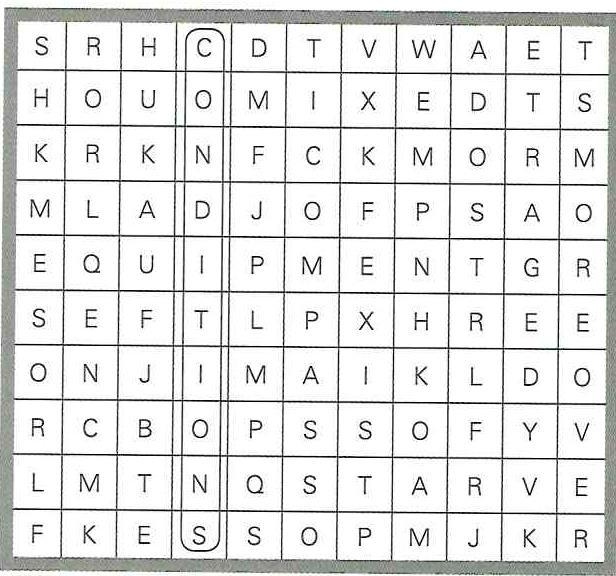
ex. 1. John likes working at the cafe because the (conditions) are very good.
2. There was a bad road accident last night. What a terrible --.
3. First, the cook -- the sugar and butter. Then he added eggs.
4. I'll -- if I don't eat something soon!
5. Did Earth -- 230 millions of years ago?
6. It's dangerous to climb mountains without suitable --.
7. The -- pointed north.
8. You are too young to walk alone to school. -- you're too small to carry such a heavy backpack.
b. Circle the correct answer.
הקיפו את התשובה הנכונה.
ex. 1.The zoo keeper was very (brave)/ mixed / pleasant to catch the snake.
2. A collection / An aim / A century ago, students of different ages sat and learned together in classrooms.
3. Few people can exist / explore / escape without water for more than a week.
4. The climber checked his equipment / conditions / sign to make sure he had everything he needed.
5. Her dancing career carelessly / mainly / tragically ended after she had an accident.
6. Sports shirts are often made from a fabric / research / skin that helps keep athletes dry.
7. The hiker had a map and a compass. Moreover / In the direction / At a time, she carried a satellite phone.
8. It's cold today. Wear a wool / natural / comfortable sweater.
*144*
c. Match the sentences in A to the sentences in B. Pay attention to the words in brackets.
התאימו את המשפטים ב- A למשפטים ב- B. שימו לב למילים שבסוגריים.
A
1. Peter was (motivated) to win.
2. The (temperature) is going down.
3. I (ran into) Ann near the park.
4. Sunburn is bad for the (skin).
5. When Tim got home, he was (starving)
6. She bought a coat made from (wool)
B
-- a. It was good to see her.
-- b. It is going to snow tonight.
ex. 1. c. He trained hard for the race.
-- d. He made himself a sandwich.
-- e. It will help keep her warm in winter.
-- f. Stay indoors during the hottest part of the day.
d. Answer the questions about yourself. Use the words in brackets. Write complete sentences.
ענו על השאלות על עצמכם. השתמשו במילים שבסוגריים. כיתבו משפטים שלמים.
ex. 1. What (equipment) do you use in your sports lessons?
I use a ball, a rope and a bat.
2. What is your (aim) in life? --.
3. What would you like to become a (member) of? --.
4. Whose (footsteps) do you think you will (follow in)? --.
e. Imagine you have reached the Antarctic with Amundsen's team. Write a diary entry with at least 5 of the words below. You can look back at the article on pages 140-141 of the student's book to help you.
תארו לעצמכם שהגעתם לאנטארקטיקה עם הצוות של אמונדסן. כיתבו רישום ביומן עם לפחות חמש מהמילים שלמטה. אתם יכולים להיעזר במאמר בעמודים 141-140 בספר הלימוד.
skin / run into / climate / area / environment / compass / brave / aim / motivated / set out / temperature / wool
December 14,1911
Today, we reached the South Pole. --.
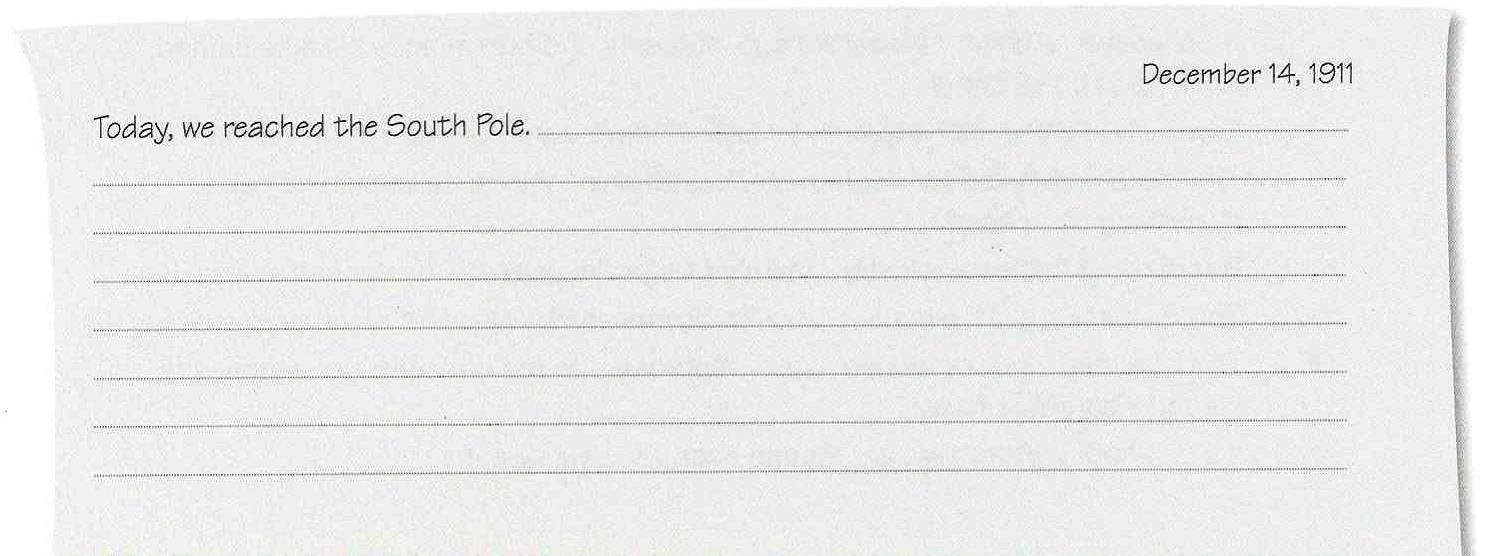
*145*
Part 3 - Man’s best friend

New words
Write the words below next to their meaning. If you do this correctly, the words will be in alphabetical order.
כיתבו את המילים שלמטה ליד הפירוש שלהן. אם תעשו זאת נכון, המילים יופיעו לפי סדר האלפבית.
excellent / find out / guide / free (v) / base / fight (v) / adventure / ice / get back / fence
1. הרפתקה - adventure
2. בסיס --
3. מצוין, מעולה --
4. גדר --
5. להיאבק, לריב, להילחם --
6. לגלות --
7. לשחרר --
8. לחזור --
9. מדריך --
10. קרח --
protect (v) / wrap (v) / storm / safety / trust (n) / not enough room / rock / rope / loyal
11. נאמן - loyal
12. אין מספיק מקום --
13. להגן --
14. סלע --
15. חבל --
16. בטיחות --
17. סערה, סופה --
18. אמון --
19. לעטוף --
b. Find at least 5 words or expressions in exercise a. that are connected to outdoor activities.
מיצאו לפחות 5 מילים או ביטויים מתרגיל a שיש להם קשר לפעילויות שמתקיימות בחוץ.
guide, --
*146*
Student’s book, page 144, exercise d.
Read the questions. Then listen again and answer the questions.
1. Why does Dave phone Tom? --.
a. He wants to invite him to a movie.
b. He wants to borrow a movie from Tom.
c. He wants to know how Tom is doing.
2. What happens to the scientist? --.
a. He falls into a pool of freezing water.
b. He gets lost in the snow.
c. He helps Jerry get back to the base.
3. Complete the sentence.
Everyone has to leave the base because of the --.
4. How do the dogs survive? --.
a. They eat the food at the base.
b. They learn to hunt for food.
c. They fish for food.
5. How long does it take Jerry to get back to the Antarctic?
a. a few weeks
b. more than six months
c. a year
6. Complete the sentence.
Tom thinks the best thing about the movie was the --.
Words" words, words - after student's book, page 146, exercise d
a. Circle the correct answer to show you understand the meaning of the words in brackets.
הקיפו את התשובה הנכונה כדי להראות שאתם מבינים את פירוש המילים שבסוגריים.
ex. 1. When will you get back from your --?
(a.) trip, b. food, c. score
2. The service at the restaurant was (excellent). It was --.
a. very bad, b. average, c. very good
3. To (free) an animal is to --.
a. put it in a cage, b. let it go, c. take care of it
4. When there is (not enough room) there is -- space.
a. too little, b. a lot of, c. just the right amount of
5. When you have an (adventure), you have -- experience.
a. a long, b. an exciting, c. a boring
6. There was a terrible (storm). It --.
a. was very warm, b. was very sunny, c. rained a lot
*147*
b. 1. Complete the sentences with the words below. There are two words you don't need.
השלימו את המשפטים עם המילים שלמטה. ישנן שתי מילים מיותרות.
fighting / found out / ice / storm / rocks / base / wrap / guide / safety / fence
ex. 1. I am so excited. I just (found out) that we are going skiing on the Hermon.
2. We listened to the tour --.
3. The weatherman warned that there was a big -- on the way.
4. The cyclists must wear a helmet for their --.
5. Please -- the gift I bought for Mom.
6. Two children were -- in the park.
7. The -- around my house is made of wood.
8. We climbed on the --.
c. 1. Write sentences with the 2 words you did not use in exercise b.1. --.
כיתבו משפטים עם שתי המילים בהן לא השתמשתם בתרגיל b.1..
c. 1. Circle the correct answers to complete the email.
הקיפו את התשובות הנכונות כדי להשלים את האימייל.
Hi Ori,
What's up? I just saw (an amazing) / a motivated / a safe movie. It was a true story about four friends that decided to travel in South America. They paid a visitor / a guide / a member to help them explore the Amazon Rainforest in Brazil. Unfortunately, the guide disappears so the friends have to find a way out of the rainforest by themselves. They decide to follow the river. The nights are the most dangerous / pleasant /serious because of wild animals. In order to lead / discover / protect themselves and keep warm, they light a fire. After 10 days, they manage to lead / get back / in the direction of to safety. The acting in the movie is excellent / afraid / international! I have the DVD if you want to see it.
We'll speak soon.
Amit
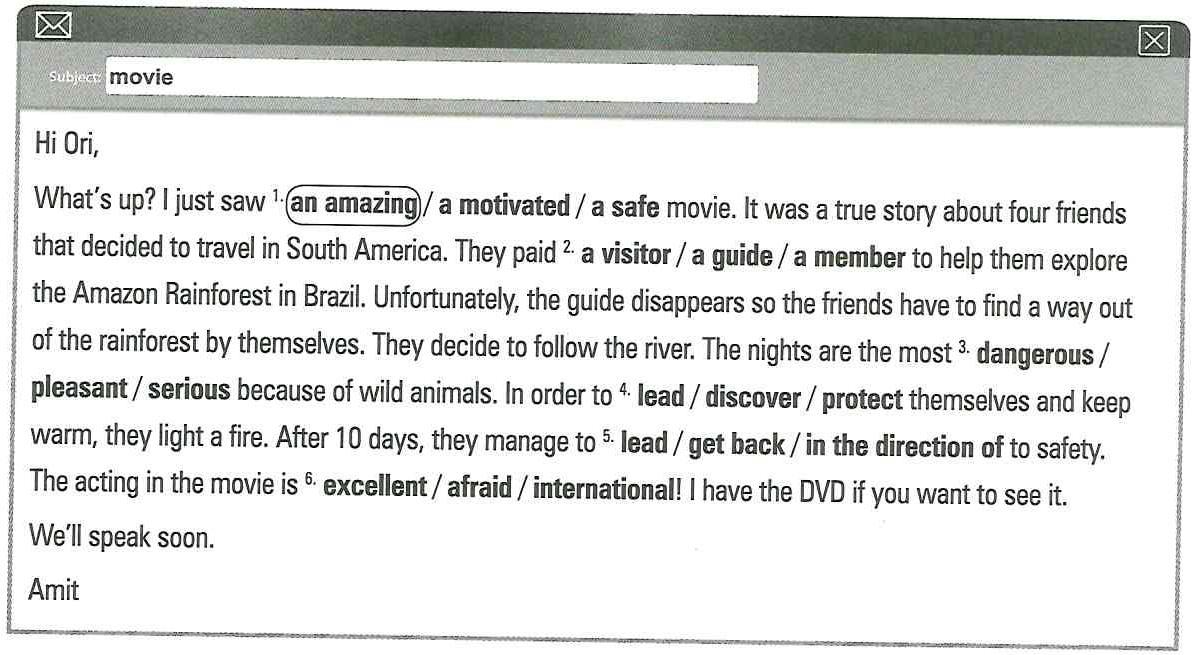
c. 2. Would you like to see this movie? Explain why or why not. --.
האם הייתם רוצים לראות את הסרט הזה? הסבירו מדוע או מדוע לא.
*148*
d. Write 3 sentences explaining which pet you would like to have and why. Use at least 3 of the words below.
כיתבו שלושה משפטים שמסבירים איזו חיית מחמד הייתם רוצים שתהיה לכם ומדוע. השתמשו לפחות בשלוש מהמילים שלמטה.
natural / protect / free / rope / guide / dangerous / wrap / loyal / amazing / trust / fight
e. Compound nouns
e. 1. Match A to B to form compound nouns. Use the glossary to help you
התאימו A ל- B כדי ליצור שמות עצם מורכבים. היעזרו במילון שבסוף הספר.
A
world / side / hair / tea / pop / foot / birth / break / land / play
B
day / cut / ground / wide / fast / cup / corn / lady / walk / ball
ex. 1. worldwide
2. --
3. --
4. --
5. --
6. --
7. --
8. --
9. --
10. --
e. 2. Complete the sentences with the compound nouns you formed in exercise e.1.
השלימו את המשפטים עם שמות העצם המורכבים אותם יצרתם בתרגיל e.1..
ex. 1. Bono went on a (worldwide) tour and gave concerts in many countries.
2. I dropped the -- when I was washing it.
3. My favorite snack is --.
4. It's my -- tomorrow. I am going to be 16.
5. It's dangerous to walk in the road. Always walk on the --.
6. The children played together in the --.
7. You look different. Did you have a --?
8. It's important to eat -- every day.
9. My sister plays -- every weekend.
10. A -- is a woman who rents a house or apartment to other people.
*149*
Language - Review of tenses - after student’s book, page 148
a. Underline the verb in each sentence. Then circle the correct time expression.
מיתחו קו מתחת לפועל בכל משפט. לאחר מכן, הקיפו את ביטוי הזמן המתאים.
ex. 1. We are (going to visit - underlined) our cousins (next week) / last week.
2. Did you finish your book last night / tomorrow?
3. I am going to Greece next summer / every day.
4. What were you doing while / now I was sleeping?
5. The students are taking a math test usually / at the moment.
6. We will finish the project yesterday / next week.
7. Yael usually / during goes swimming every morning.
8. I saw a great movie two days ago / in the future.
b. Circle the correct answer.
הקיפו את התשובה הנכונה.
ex. 1. I think it (will) / is / will be rain tomorrow.
2. Did / Was / Are they going to explore the shipwreck this year?
3. There is / are / was going to be a storm tomorrow.
4. The boys always plays / play / are playing soccer after school.
5. Yesterday we did / didn't / don't go to school because it was snowing.
6. Do / Does / Did you drink at least ten glasses of water every day?
7. Don't make any noise. Betty was / is / are sleeping now.
8. While Ido and Eran are / were / will be walking to school yesterday, they met their teacher.
c. Complete the sentences with the correct form of the verbs in brackets. Pay attention to the time expressions.
השלימו את המשפטים עם הצורה המתאימה של הפעלים שבסוגריים. שימו לב לביטויי הזמן.
ex. 1. While I was doing (do) my homework, the phone rang.
2. I -- (wrap) the present later.
3. My brother and sister always -- (fight) over their toys.
4. -- you -- (see) the movie on TV last night?
5. He -- (spend) two weeks in Jerusalem every summer.
6. -- you -- (go) to the football match tonight?
7. Several children -- (shout) in the park at the moment.
8. I -- (not clean) my room every day but I do -- (clean) it once a week.
9. They usually -- (not go) out during the week, but this Wednesday, they -- (go) to a party.
10. The people in the apartment above us -- (make) a lot of noise last night. We -- (ask) them to be quieter.
*150*
d. Complete the dialogues with the correct form of the verbs in brackets. Pay attention to the time expressions.
השלימו את השיחות עם הצורה המתאימה של הפעלים בסוגריים. שימו לב לביטויי הזמן.
ex. 1. Ken: How often do you meet (meet) your friends?
Greg: I usually -- (meet) them on the weekend.
2. Mom: What -- we -- (go) to do tonight?
Dad: I don't know. It -- (rain) very hard now.
3. Vet: When -- you (feed) your dog?
Dan: I -- (feed) my dog every morning.
4. Kelli: What street -- Tali -- (live) on?
Bernice: She -- (live) on Ruppin Street.
5. Anna: When -- you -- (phone) me?
Sophie: I -- (phone) you tomorrow morning.
6. Teacher: Where -- (be) Bill now?
Raymond: He's at the gym. He -- (train) for the competition.
7. Ari: I heard that you broke your arm last week! What you -- (do) when you broke your arm?
Gil: I -- (practice) judo when I suddenly fell.
8. Sheryl: What -- you usually -- (buy) for lunch?
Carla: Nothing. I -- (make) my own sandwiches every day.
תארו לעצמכם שאתם נמצאים על האי שבתמונה (אי קטן עם ספינה שוקעת). כיתבו על ההרפתקאות שלכם. מה קרה לכם? מה, לפי דעתכם, יקרה? השתמשו בפעלים שלמטה או בפעלים משלכם.
swam / sink / starve / eat / sail / get back / feel / drown
Diary
I swam to the island. --.
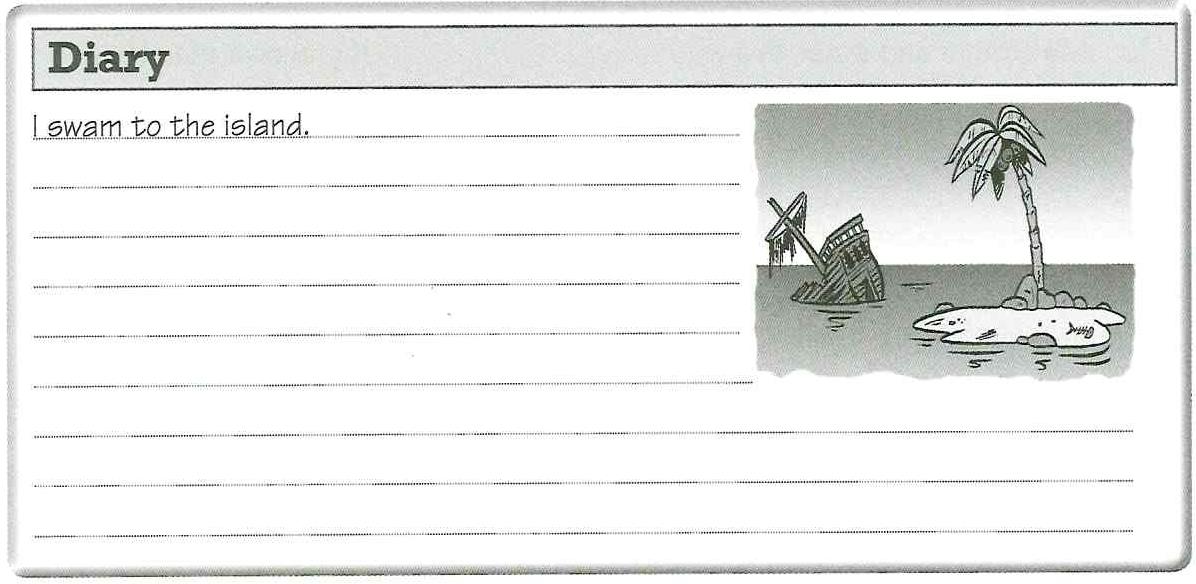
*151*
Part 4 - Story: The Snow Goose
New words (1) - student’s book, page 149, exercise a.
Write the words below next to their meaning. If you do this correctly, the words will be in alphabetical order.
כיתבו את המילים שלמטה ליד הפירוש שלהן. אם תעשו זאת נכון, המילים יופיעו לפי סדר האלפבית.
friendship / kindness / wild / besides / heal / alone / injured / wildlife / ugly / wander / goose (geese) / suspicious
1. לבד - alone
2. חוץ מ... --
3. ידידות, חברות --
4. אווז (אווזים) --
5. לרפא --
6. פצוע --
7. טוב לב --
8. חושד, חשדני --
9. מכוער --
10. לנדוד --
11. בר, פרא --
12. חיות בר --
b. Find at least two words in exercise a. that are connected to:
מיצאו לפחות שתי מילים או שני ביטויים מתרגיל a שיש להם קשר ל:
1. people: friendship, --
2. nature: --
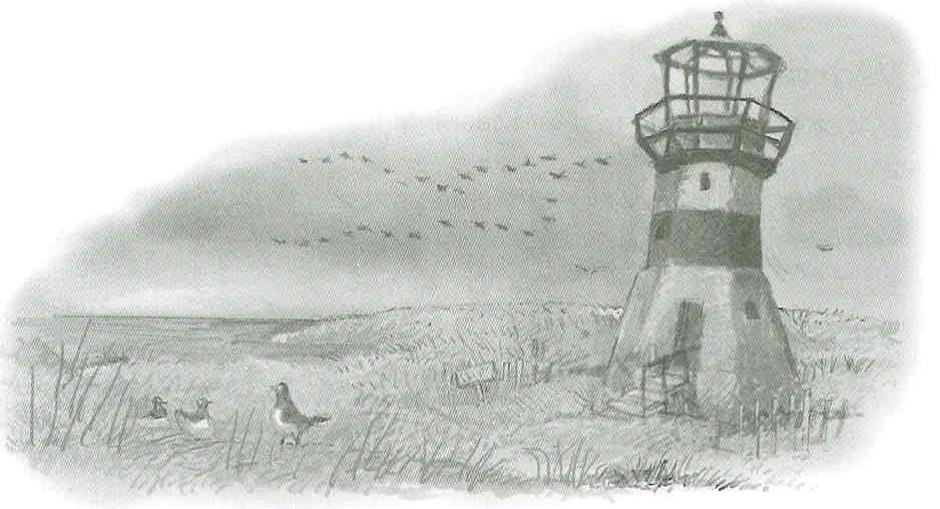
*152*
New words (2) - student’s book, page 152, exercise a
a. Write the words below next to their meaning. If you do this correctly, the words will be in alphabetical order.
כיתבו את המילים שלמטה ליד הפירוש שלהן. אם תעשו זאת נכון, המילים יופיעו לפי סדר האלפבית.
own (v) / thousand / take care of / in the direction / for once / bright / instead (of) / load (v) / disappear / possible / hopeless / beach / situation / peaceful / trap (v) / circle (n)
1. חוף הים - beach
2. בהיר, מבהיק --
3. עיגול --
4. להיעלם --
5. פעם אחת, לשם שינוי --
6. חסר תקווה --
7. בכיוון --
8. במקום --
9. להעמיס --
10. להיות הבעלים של --
11. שלו, שקט --
12. אפשרי --
13. מצב --
14. לטפל ב... --
15. אלף --
16. ללכוד --
b. Find at least 2 adjectives and 3 nouns in exercise a.
מיצאו לפחות שני שמות תואר ושלושה שמות עצם בתרגיל a..
1. adjectives: bright, --
2. nouns: --
New words (3) - student's book, page 154, exercise a
a. Write the words below next to their meaning. If you do this correctly, the words will be in alphabetical order.
כיתבו את המילים שלמטה ליד הפירוש שלהן. אם תעשו זאת נכון, המילים יופיעו לפי סדר האלפבית.
close (adj) / bottom / owe / turn around / shoot (v) / farewell / (one) at a time / bother (v) / remain / be finished / cliff / onboard / drop off / circle / soldier / sail (v) / navy / overhead
1. אחד בכל פעם, אחד אחרי השני - (one) at a time
2. נגזר גורלו --
*153*
3. להטריד, להפריע --
4. קרקעית, תחתית --
5. צוק, מצוק --
6. קרוב --
7. להוריד --
8. פרידה --
9. חיל הים --
10. על הסיפון --
11. מעל --
12. להיות חייב ל... --
13. להישאר --
14. להפליג --
15. לירות --
16. חייל --
17. להסתובב --
b. Find at least 3 words or expressions in exercise a. that are connected to:
מיצאו לפחות שלוש מילים או ביטויים מתרגיל a שיש להם קשר ל:
1. the sea: sail, --
2. the army (צבא): --
Vocabulary practice - after student’s book, page 151, basic understanding
a. 1. Write T (true) or F (false) for each sentence according to part 1 the story "The Snow Goose" on pages 150-151 of the student's book. Pay attention to the words in brackets.
כיתבו T (נכון) או F (לא נכון) ליד כל משפט לפי החלק הראשון של הסיפור “The Snow Goose” בעמודים 150-151 בספר הלימוד. שימו לב למילים בסוגריים.
ex. F. 1. Although the villagers thought Philip was (strange), they were friendly to him.
-- 2. The villagers thought Philip was (ugly).
-- 3. Fishermen (injured) the bird.
-- 4. Philip had a deep (friendship) with animals.
-- 5. Fritha wanted Philip to (heal) the bird.
-- 6. Philip was (suspicious) of the people in the village.
-- 7. The snow goose freely (wandered) in and out of Philip's house.
a. 2. Correct the false sentences in exercise a.1. --.
תקנו את המשפטים הלא נכונים בתרגיל a.1..
ex. 1. The villagers thought Philip was strange and they were suspicious of him.
*154*
b. Complete the sentences. Match A to B according to part 2 of the story "The Snow Goose" on pages 152-153 of the student's book. Pay attention to the words in brackets.
השלימו את המשפטים. התאימו את A ל- B לפי החלק השני של הסיפור The Snow Goose בעמודים 152-153 בספר הלימוד. שימו למילים שבסוגריים.
A
1. The German army trapped the British soldiers on the (beaches)
2. Anyone who (owned) a small boat was going to
3. Philip (loaded) his boat with
4. Fritha promised Philip she would (take care of)
5. The snow goose flew (in the direction) of
B
--a. help the British soldiers.
-- b. all the birds.
ex. 1. c. of Dunkirk.
-- d. Philip's boat.
-- e. food and water.
c. Circle the correct answer according to part 3 of the story "The Snow Goose" on pages154-155 of the student's book. Pay attention to the words in brackets.
הקיפו את התשובה הנכונה לפי החלק השלישי של הסיפור The snow goose בעמודים 155-154 בספר הלימוד. שימו לב למילים שבסוגריים.
.
ex. 1. The German soldiers were shooting from the cliffs at the --.
a. goose, (b.) British soldiers, c. people
2. Philip brought his sailboat (close) to the shore --.
a. to collect the British soldiers.
b. to give the soldiers.
c. to eat food and water.
3. Philip told the soldiers he could take -- (at a time).
a. one man, b. no one, c. seven men
4. The snow goose kept flying in (circles) --.
a. above Philip's sailboat.
b. to frighten the German soldiers.
c. because it was lost.
5. Philip told the soldiers to stay at the (bottom) of --.
a. the sea, b. the boat, c. the beach
6. Philip (dropped off) groups of British soldiers near the navy ship and --.
a. sailed back home.
b. stayed there.
c. sailed back to the shore.
7. There were more than 700 soldiers (on board) --.
a. Phillip's boat.
b. the navy ship.
c. the shore.
8. The soldiers said (farewell) and -- Philip's boat.
a. got on, b. got off, c. sailed on
*155*
d. 1. Circle the word that does NOT belong in each group.
הקיפו את המילה יוצאת הדופן בכל קבוצה.
ex. 1. possible / maybe / (for once)
2. soldier / thousand / army
3. take care / look after / turn around
4. strange / take a look / stare
5. beach / geese / wildlife
6. farewell / on board / sail
7. circle / shake / overhead
d. 2. Write sentences with at least 2 of the words you circled in exercise d. 1. --.
כיתבו משפטים עם לפחות שתיים מהמילים שהקפתם בתרגיל d.1..
e. Circle the correct answer.
הקיפו את התשובה הנכונה.
ex. 1. She always sees the good in any circle / (situation) / season.
2. The room is alone / bright / close and comfortable.
3. She was finished / dropped off / turned around and was surprised to see her old friend.
4. The sea was calm and underwater / peaceful / surprised.
5. Tom is busy doing homework. Please don't bother / surprise / owe him.
6. We couldn't see the sun. It appeared / loaded / disappeared behind a cloud.
7. Sally has some very hopeless / nervous / strange ideas about how to exercise.
8. I'm not interested in going. You can go instead of / possible / overhead me.
9. I was walking in the wrong direction, so I wandered / remained / turned around.
10. Mouna said you bet / farewell / how are you and left the house.
f. Answer the questions. Write complete sentences. Pay attention to the words in brackets.
ענו על השאלות. כיתבו משפטים שלמים. שימו לב למילים שבסוגריים.
ex. 1. What are two popular (beaches) in Israel?: Palmahim, Bet Yanai
3. What do you like to do when you are (alone)? --.
4. What languages do you speak (besides) English? --.
5. What things do you do (on board)? --.
*156*
Unit 5 - Review - after student’s book, page 159
Vocabulary
a. Complete the lists with words below. Then add one more item to the groups and write the words that go there.
השלימו את הקבוצות עם המילים שלמטה. לאחר מכן, הוסיפו קבוצה נוספת וכיתבו את המילים ששייכות אליה.
kindness / excellent / underwater / brave / compass / in the direction/ sail / wild / protect / on board / disappear / bottom / lead / examine / creature / equipment / beach / pressure / adventure / navy / take care of / safety / collect / loyal / satellite / environment / friendship / peaceful / marine
1. Water: underwater, --
2. Exploration: --,
3. --: --

b. 1. Match A and B to make phrases. Check your answers in the list of new words on
,pages 158-159 of the student's book.
התאימו A ל- B כדי ליצור ביטויים. בידקו את תשובותיכם ברשימת המילים החדשות בעמודים 159-158 בספר הלימוד.
A
1. find
2. run
3. turn
4. do
5. on
6. take
B
-- a. around
-- b. better
-- c. care of
-- d. board
-- e. into
ex. 1. f. out
b. 2. Complete the sentences with the phrases you made in exercise b.1.
השלימו את המשפטים עם הביטויים שיצרתם בתרגיל b.1..
ex. 1. How did you (find out) about the concert?
2. Yoni was glad to -- his friend in the library.
3. I promised myself to -- on the next exam.
4. We walked -- the ship with great excitement.
5. Sarit is busy. She has to -- of her little brother.
6. We are lost. Let's -- and go the other way.
*157*
c. Complete the sentences with the words below.
השלימו את המשפטים עם המילים שלמטה.
adventure / ice / century / rock / followed in the / international / starving / loyal / footsteps of
ex. 1. I'm (starving). I must have something to eat.
2. I wonder what life was like in the 18th --.
3. People who love -- are ready to explore new places.
4. Musicians from all over the world performed at the -- festival.
5. It was so cold the roads were covered with --.
6. Ted is Andrew's -- friend. Andrew trusts him.
7. Madjib injured his foot on a -- while he was walking in the mountains.
8. Many people -- Scott and Amundsen.
d. Write the meanings of these words in your language. Use what you learned about prefixes and compound words to help you. Then check your answers in the glossary.
כיתבו את הפירושים של המילים הבאות בשפתכם. היעזרו במה שלמדתם על תחיליות ומילים מורכבות. לאחר מכן בידקו את תשובותיכם במילון שבסוף הספר.
1. submarine --
2. netball --
3. snowstorm --
4. intercity --
Grammar
e. Circle the correct form of the verb.
הקיפו את הצורה המתאימה של הפועל.
ex. 1. You will send / (Will you send) me an SMS when you get to Haifa?
2. Dan is sick. He is going to go / isn't going to go to school today.
3. Eric promises that he will walk / won't walk the dog after lunch.
4. I will meet / won't meet you at the mall after school. Don't be late!
5. She loves to dance. She will begin / won't begin taking dance lessons soon.
6. Cathy is very busy so she is playing / isn't playing basketball with us tonight.
f. Complete the sentences with the correct tense of the verbs in brackets.
השלימו את המשפטים עם הצורה הנכונה של הפעלים שבסוגריים.
ex. 1. Liat and I are going to go (go) shopping later on.
2. -- you -- (meet) Ryan at the gym last night?
3. When -- your family usually -- (have) supper?
4. When I opened the door, Ben -- (talk) on the phone.
5. I -- (not see) you at the movies yesterday.
6. Stacy and Tina often -- (study) together for tests.
*158*
Writing
g. Dana wants to go ice skating at the Canada Center in Metula, in the north of Israel. Read the email she wrote to her friend Shani and answer the questions below.
דנה רוצה להחליק על הקרח במרכז קנדה במטולה, בצפון ישראל. קיראו את האימייל שהיא כתבה לחברתה שני וענו על השאלות שלמטה.
Hi Shani,
Let's go ice skating at the Canada Center in Metula. First, we will have to go online to find out the opening and closing hours of the center and how much it costs. Then we will have to get the bus schedule. After that, if you're interested, I can phone my aunt and uncle who live in Kiryat Shmona and ask them if we can stay overnight with them. What do you say?
I think we will have an amazing time!
Dana
1. Underline the opening sentence of Dana's email.
2. What does Dana think they have to do before taking the trip? Write 3 answers in complete sentences. --.
3. Underline the closing sentence of Dana's email.
4. Circle the 3 connectors of sequence in Dana's email.
5. Which additional connectors of sequence do you know? --.
h. Imagine that you want to plan a short trip with a friend to Tel Aviv. Complete the paragraph below.
תארו לעצמכם שאתם רוצים לתכנן טיול קצר עם חבר/ה בתל אביב. השלימו את הפיסקה שלמטה.
Let's go to Tel Aviv.
First, --. Then --. Next, --, After that, --.
*159*
Circle the correct answer.
הקיפו את התשובה הנכונה.
Vocabulary
ex. 1. Who -- America in 1492?
a. combined, (b.) discovered, c. created
2. By the time we -- the museum, it was closed.
a. reached, b. explained, c. turned
3. I was -- when I didn't remember her name.
a. frightened, b. definitely, c. embarrassed
4. They finished the test quickly. It was --
a. a sweet tooth, b. a piece of cake, c. the apple of my eye
5. The doctor -- the sick child.
a. looked for, b. owed, c. examined
6. The lion is a -- of the cat family.
7. We left the waiter a big tip because the -- was excellent
a. taste b. service, c. behavior
8. The event was a success. Everything went -- plan.
a. according to, b. deal with, c. instead of
9. Jackie has a -- of dolls from all over the world.
a. company, b. collection, c. century
10. Turn off your computer when it's not in use. You'll save --.
a. environment, b. electricity, c. earthquake
Grammar
ex. 1. A penguin is a bird -- can't fly.
a. who, (b.) that, c. where
2. My brother plays the piano --.
a. good, b. bad, c. well
3. You -- speak during a test.
a. couldn't, b. don't have to, c. shouldn't
4. It's raining. I -- walk the dog now.
a. going to, b. am not going to, c. don't
5. This is the teacher -- taught my sister.
a. when, b. where, c. who
6. On Monday she -- to New York.
a. is flying, b. fly, c. flying
7. Today is the -- day in my life.
a. happy, b. happiest, c. happier
8. She wasn't wearing a helmet when she -- off her bike.
a. was falling, b. fall, c. fell
9. I'm sure we -- each other soon.
a. will see, b. going to see, c. are seeing
10. I -- hear what you are saying. Please speak louder.
a. can't, b. won't, c. mustn't
*160*
Independent reading 1 - after student’s book, page 159
a. Read the interview.
(השורות מחולקות וממוספרות לפי ספר הדפוס, מספר השורה יבוא בסוגריים בתחילת השורה)
Dolphin Reef
(1) Interviewer: Robin, what do you do?
(2) Robin: I'm a dolphin trainer. I work in an amazing program with children
(3) who have special needs (צרכים מיוחדים) here at Dolphin Reef in Eilat.
(4) Interviewer: Who are the kids who come to Dolphin Reef?
(5) Robin: The kids who come to Dolphin Reef are between the ages of 6
(6) to 16. They have many difficulties. Some are depressed, others
(7) find it difficult to connect with people. And there are also kids
(8) who are under terrible stress.
(9) Interviewer: What activities do you do to help them?
(10) Robin: There are two kinds of activities - one activity is outside the
(11) water and the other activity is in the water. Outside the water,
(12) the kids touch the dolphins and play games with them. It's a lot
(13) of fun. In the water, each kid works with a dolphin trainer. They
(14) watch the dolphins under the water and play with them. Slowly,
(15) they begin helping the trainers with the dolphins.
(16) Interviewer: How do the dolphins help the kids?
(17) Robin: The kids get a chance to be themselves. They have a good
(18) experience with the dolphins. Dolphins are very loving animals.
(19) The kids get lots of personal attention and love. This makes
(20) them feel better about themselves. They get close to the trainer
(21) and to the dolphins. In the end, we succeed in helping most of
(22) the children who are part of this program.
(23) Interviewer: Thanks for your time, Robin.
(24) Robin: You're welcome.
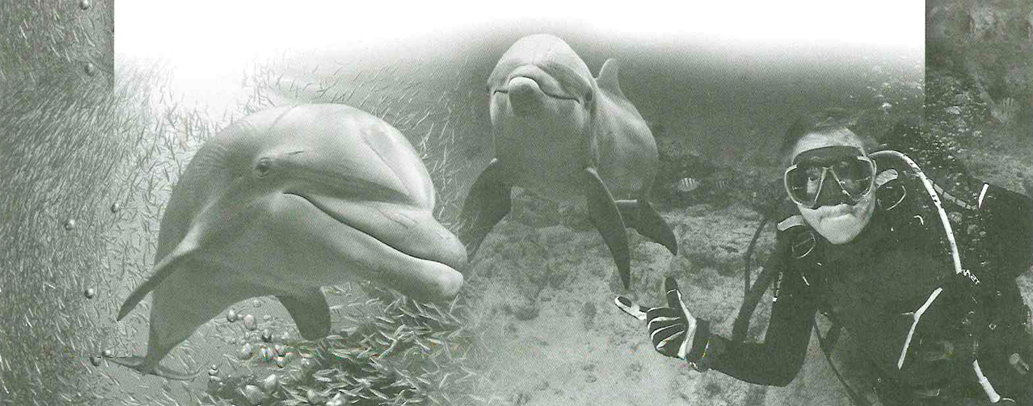
*161*
b. Complete the ad with information from the interview on page 160.
Swim with the Dolphins
ex. Where? Dolphin Reef, Eilat
Who visits the dolphins? --.
Why? --.
What do they do? --.
How does it help? --.
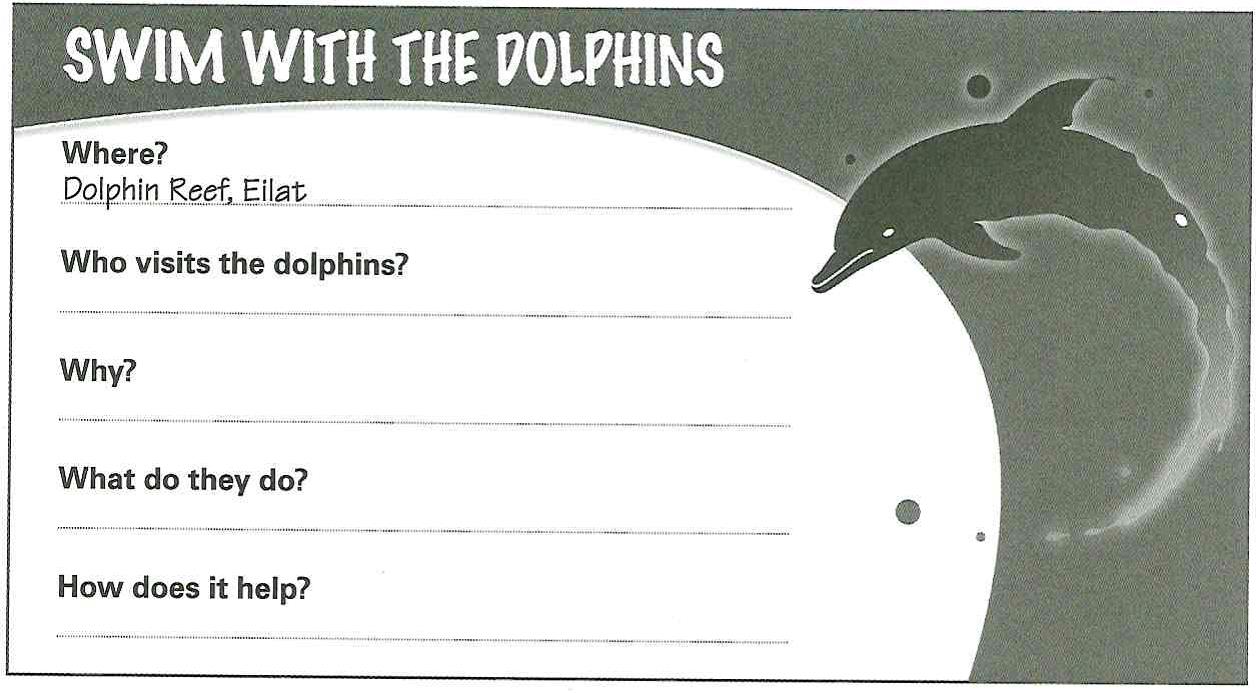
c. Answer the questions.
1. Who is Robin? --
a. the interviewer
b. a visitor to Dolphin Reef
c. a dolphin trainer
2. Name 2 problems the children who come to Dolphin Reef have. --.
3. The children do different activities with the dolphins at Dolphin Reef. Give an example of each kind of activity.
In the water --.
Out of the water --.
4. Why are dolphins special for the children to work with? Complete the sentence.
The dolphins --.
5. How do the children feel at the end of the program? --.
What about you?
Would you like to swim with the dolphins? Explain why or why not. --.
*162*
Independent reading 2 - after student's book, page 159
Read the article.
(השורות מחולקות וממוספרות לפי ספר הדפוס, מספר השורה יבוא בסוגריים בתחילת השורה)
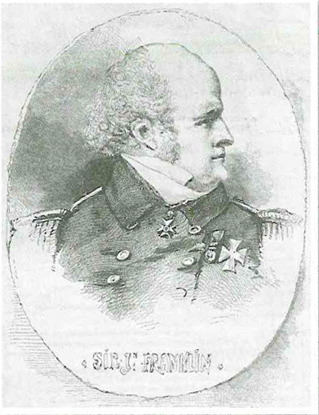
(1) For hundreds of years, sailors talked about a
(2) mysterious sea path called the Northwest Passage.
(3) This passage connected the Atlantic and Pacific
(4) Oceans. Many ships sailed to look for it but
(5) nobody could find it.
(6) In 1845, the two ships, the Erebus and the
(7) Terror, sailed to look for the sea path. The captain of the ship,
(8) Sir John Franklin was an excellent sailor and his ships were the best in
(9) England. He believed that he and his sailors would find the sea path.
(10) Three years passed. No one heard anything about the two ships or the 129
(11) sailors. Ships tried to find the missing sailors, but they didn't succeed. By 1854,
(12) many people in England believed that the sailors were all dead.
(13) But Lady Jane Franklin did not believe her husband was dead. She paid for
(14) ships to continue looking for her husband Sir John Franklin and his men. In 1859,
(15) the men on one of these ships found a metal box. Inside it were two
(16) letters from sailors on the Erebus and the Terror. In one letter, from May 1847,
(17) a sailor wrote that the ships were frozen in the ocean ice and couldn't
(18) move. He wrote that the men were all feeling well. In the second letter, from
(19) April 1848, the sailor wrote that twenty-four men were dead. Among these
(20) men was Sir John. The one hundred and five sailors who were still alive
(21) decided to walk across the ice to look for help. They never found that help.
(22) Today it is possible to learn more about many of the ocean's mysteries. In 2014,
(23) Canadian divers found the Erebus. It was eleven meters under the sea
(24) in the Canadian Arctic. Modem technology helped to solve the mystery of
(25) one of the missing ships of the Franklin expedition.

*163*
Complete the timeline:
ex. 1. 1845: Two ships, the Erebus and the Terror, sailed from England to look for the Northwest Passage.
2. 1854: --
3. 1859: --
4. 2014: --
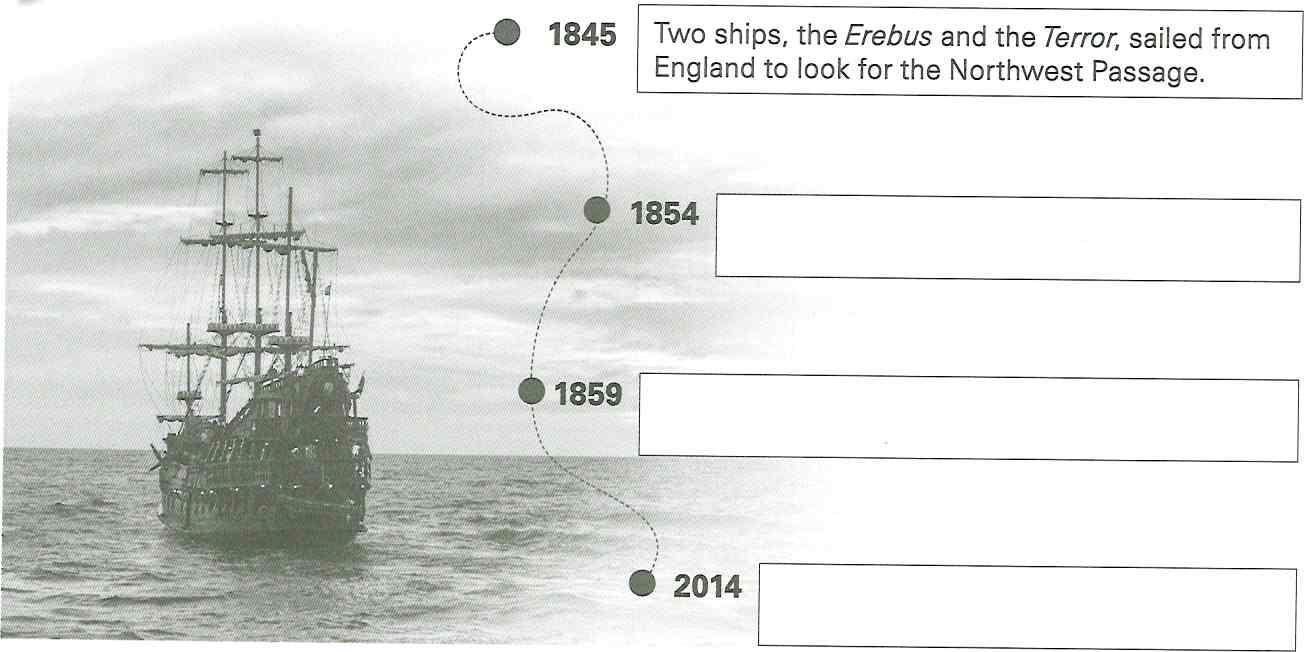
c. Answer the questions about the article on page 162.
1. The Northwest Passage was --.
a. the name of a ship, b. a mysterious sea path, c. a famous expedition
b. Who was Sir John Franklin? Write 2 facts about him. --.
3. a. Circle the correct answer, true or false.
In 1854, many people thought the sailors on the Erebus and the Terror were still alive. True /False
b. Write the words from the article that helped you answer. --.
4. What did the men find in the metal box? --.
5. What was the difference between the two letters? Complete the sentences.
In 1847, a sailor wrote --.
In 1848, a sailor wrote --.
6. What helped to solve the mystery of one of the missing ships? --.
What about you?
Throughout history, many people took chances to discover new places. What kind of people do you think they were? Would you like to discover new places? --.
*164*
Unit 1 - Task - student’s book, page 35
Survey Form: Competing
Question 1: What activities do you compete in?
Student 1: --
Student 2: --
Student 3: --
Student 4: --
Student 5: --
Question 2: Which kind of competition do you prefer - individual or team competition?
Student 1: --
Student 2: --
Student 3: --
Student 4: --
Student 5: --
Question 3: How do you feel when you compete - nervous, excited or relaxed?
Student 1: --
Student 2: --
Student 3: --
Student 4: --
Student 5: --
Question 4: Do you think it is good to compete? Why?
Student 1: --
Student 2: --
Student 3: --
Student 4: --
Student 5: --
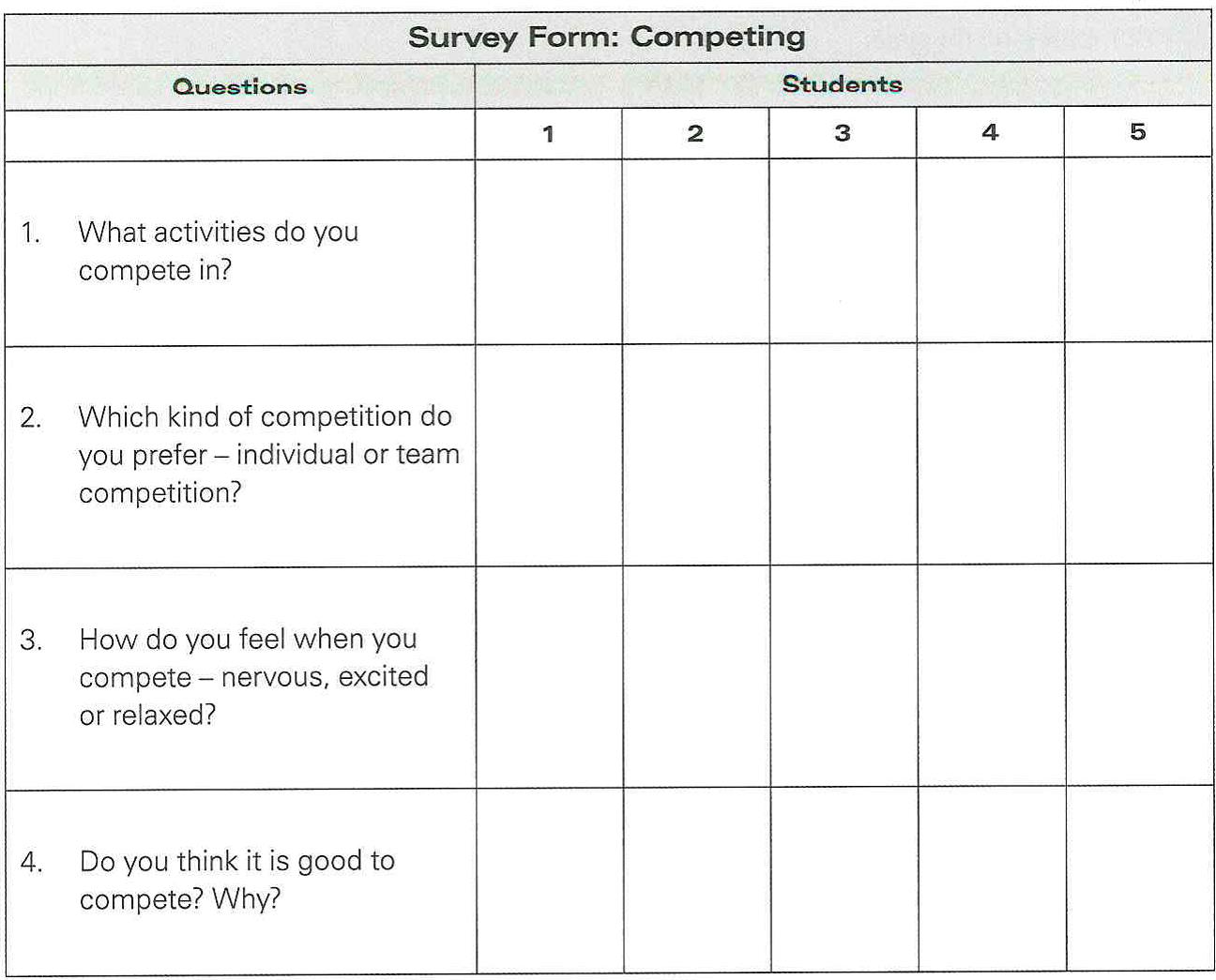
*165*
Checklists for writing tasks
Unit 1, page 25, exercise d.
Write 3-4 sentences expressing your opinion about two posts.
1. כתבתי 3-4 משפטים בהם הבעתי את דעתי.
2. השתמשתי בביטויים של הבעת דעה.
3. התחלתי כל משפט באות גדולה.
4. סיימתי כל משפט בסימן הפיסוק המתאים.
5. השוויתי את המשפטים שלי למשפטים של חבר/ה לכיתה.
Unit 2, page 56, exercise e.
Write sentences giving advice about how not to waste food at a school party.
1. כתבתי משפטים בהם אני נותן עצה כיצד לא לבזבז אוכל במסיבת בית ספר.
2. כתבתי לפחות חמישה משפטים בהם אני נותן עצה על איך לא לבזבז אוכל.
3. השתמשתי בדרכים שונות לתת עצה במשפטים שלי.
4. כתבתי משפט נושא.
5. כתבתי משפטים באנגלית נכונה.
Unit 3, page 75, exercise C ן
Write a narrative about going camping with your friends.
1. כתבתי סיפור על יציאה למחנה עם החברים שלי.
2. כתבתי לפחות חמישה משפטים.
3. כתבתי משפט פתיחה שמסביר מתי יצאתי ועם מי יצאתי.
4. כתבתי מספר משפטים שמתארים מה שקרה.
5. כתבתי משפט סיום שמתאר מה שהרגשתי.
6. כתבתי כל אחד מהמשפטים במבנה הנכון (נושא אחרי פועל ובסוף שאר המשפט).
*166*
Unit 4, page 105, exercise e.
Write a review about something you bought online.
1. כתבתי חוות דעת על משהו שקניתי באינטרנט.
2. השתמשתי בשמות תואר(adjectives) ו- relative clauses כדי להביע את דעתי.
3. הבעתי את דעתי על המוצר ועל השירות.
4. כתבתי לפחות שלושה משפטים על המוצר.
5. כתבתי לפחות שלושה משפטים על השירות.
Unit 5, page 138, exercise e.
Write an email to someone who is coming to visit about what you plan to do together.
1. כתבתי אימייל למישהו שבא לבקר אותי על מה שאני מתכנן שנעשה ביחד.
2. כתבתי אימייל על מה שאני מתכנן לעשות ביחד עם האורח שלי.
3. כתבתי משפט פתיחה בו תיארתי מה אני מתכנן לעשות.
4. כתבתי מספר משפטים בהם אני מפרט מה נעשה.
5. כתבתי משפט סיום בו הבעתי את הרגשתי לגבי הביקור.
6. השתמשתי בעתיד עם will ובמילות קישור לתיאור השתלשלות האירועים.
*167*
Guidelines and Checklists for Tasks
Task, Unit 1, page 35
Do a survey about competing and present your results to the class.
1. השתמשו בשאלון הסקר שבעמוד 164 בחוברת העבודה.
2. שאלו לפחות חמישה תלמידים את שאלות הסקר וכתבו את התשובות.
3. הסבירו מדוע בחרתם באותם תלמידים. השתמשו במבנה:
I chose -- because…
4. כיתבו דו"ח על התשובות שהתלמידים נתנו.
5. כיתבו לפחות ארבעה משפטים על התוצאות. השתמשו במילים חדשות (new words). השתמשו במבנים הבאים:
-- students compete in -- (type of sport)
-- students prefer individual competition.
-- students prefer team competition.
-- students feel -- (nervous, excited or relaxed).
-- students think competing is a good idea.
-- students think competing is a bad idea.
6. הסיקו מסקנות המבוססות על תוצאות המחקר. השתמשו ב- present simple.
7. הציגו את התוצאות אליהן הגעתם בשאלה שבסקר ואת המסקנות שלכם בפני הכיתה.
Checklist
1. השתמשתי בשאלון הסקר.
2. שאלתי לפחות חמישה תלמידים את שאלות הסקר וכתבתי את התשובות.
3. הסברתי מדוע בחרתי כל אחד מהתלמידים.
4. דיווחתי על התשובות שהתלמידים נתנו.
5. כתבתי לפחות ארבעה משפטים על התוצאות.
6. השתמשתי במילים החדשות (new words).
7. כתבתי משפטים שלמים והשתמשתי במבנה שניתן.
8. הגעתי למסקנות המבוססות על התוצאות. השתמשתי ב- present simple.
9. הצגתי את תוצאות הסקר ואת המסקנות שלי בפני הכיתה.
*168*
Task - Unit 2, page 63
Create an ad for an organization that distributes food in Israel and share it with the class.
Guidelines
1. עם חבר/ה, חפשו באינטרנט ומיצאו ארגון שמחלק אוכל בישראל.
מילות מפתח:
food-sharing organization
מיצאו:
- למי עוזר הארגון
- כיצד הם עוזרים לאנשים
- היכן הם פועלים
- כיצד אנשים יכולים להתנדב לארגון
2. שתפו את המידע שבידכם באמצעות ויקי(wiki).
3. כיתבו משפטים על המידע שמצאתם.
4. השתמשו במילים החדשות (new words).
5. השתמשו בשמות תואר (adjectives) ו- modals.
6. הכינו מודעה עבור הארגון. אתם יכולים להכין מודעה באינטרנט. הוסיפו איורים.
7. הציגו את המודעה שלכם בפני הכיתה.
Checklist
1 . עבדתי עם חבר/ה ובחרתי ארגון שמחלק אוכל בישראל.
2. שיתפתי את המידע שמצאתי בויקי.
3. כתבתי משפט על מי שהארגון עוזר להם.
4. כתבתי משפט על הדרך בה עוזר הארגון לאנשים.
5. כתבתי משפט על המקום בו פועל הארגון.
6. כתבתי כיצד אנשים יכולים להתנדב לארגון הזה.
7. השתמשתי במילים החדשות, בשמות תואר וב- modals.
8. כתבתי משפטים שלמים והשתמשתי באותיות גדולות ובנקודות בסוף משפט.
9. הכנתי מודעה לארגון והוספתי איורים.
10 .הצגתי את המודעה בפני הכיתה.
*169*
Task - Unit 3, page 95
Imagine you and your friend got lost on a hike in the Negev and had to spend a night outdoors. With a partner, discuss how you can get help, where you can find shelter and how to share your food. Then create a role-play and present it to the class.
Guidelines
1 . עם חבר/ה, הסתכלו במפת הנגב ובחרו אזור בו הייתם רוצים לבקר.
2. תארו לעצמכם שאתם והחבר/ה שלכם תעיתם בדרך באזור.
3. חישבו על דרך להשיג עזרה.
4. תארו איך אתם מרגישים כשאתם מבינים שעליכם לבלות שם את הלילה.
5. דונו עם חברכם / חברתכם כיצד למצוא מקום טוב לישון.
6. דונו כיצד להתחלק באוכל ובמים שיש לכם.
7. התאמנו על משחק התפקידים שלכם עם חבר/ה.
8. הציגו את משחק התפקידים שלכם בפני הכיתה.
Checklist
1. עבדתי עם חבר/ה ובחרתי אזור שהייתי רוצה לבקר בו בנגב.
2. הסתכלתי במפה של הנגב בשביל לראות היכן נמצא המקום.
3. חשבתי על דרכים להשיג עזרה.
4. תיארתי איך הרגשתי כאשר הבנתי שעלי לשהות שם בלילה.
5. דנתי עם חברי/חברתי כיצד למצוא מקום טוב לישון.
6. דנתי עם חברי/חברתי כיצד אפשר לחלק את האוכל והמים בצורה הטובה ביותר.
7. תרגלתי את משחק התפקידים עם החבר/ה.
8. הצגתי את משחק התפקידים בפני הכיתה.
*170*
Task - Unit 4, page 125
With a partner, choose two ads that try to sell the same product. Compare and contrast them. What ad is the most effective? Why? What does the consumer have to be aware of?
Guidelines
1 . עם חבר/ה, מיצאו שתי מודעות בעיתונים או באינטרנט שמוכרים את אותו המוצר.
2. השוו בין המודעות כדי לראות את הדמיון ביניהן ומה יש להן במשותף.
3. השוו בין המודעות כדי לראות במה הן שונות.
4. כיתבו שני משפטים שמראים את הדמיון בין שתי המודעות ושני משפטים שמראים את השוני ביניהן.
5. כיתבו שני משפטים שמסבירים איזו מודעה הייתה יעילה יותר ושני משפטים שמסבירים למה הלקוחות צריכים להיות מודעים כאשר הם רואים את שתי המודעות.
6. השתמשו במילים החדשות(new words).
7. השתמשו בתארי פועל (adverbs) ובמשפטי זיקה (relative clauses).
8. הציגו את המודעות שלכם ואת ההשוואה שעשיתם בפני הכיתה.
Checklist
1 . בחרתי שתי מודעות שמוכרות את אותו המוצר.
2. השוויתי בין המודעות כדי לראות את הדמיון ביניהן ומה יש להן במשותף.
3. השוויתי בין המודעות כדי לראות במה הן שונות.
4. כתבתי שני משפטים שמראים את הדמיון בין המודעות.
5. כתבתי שני משפטים שמראים את השוני בין המודעות.
6. כתבתי שני משפטים שמסבירים איזו מודעה הייתה יעילה יותר.
7. כתבתי שני משפטים שמסבירים למה הלקוחות צריכים להיות מודעים כאשר הם רואים את המודעות.
8. השתמשתי במילים החדשות (new words) ובתארי פועל (adverbs).
9. הצגתי את ההשוואה שלי בין המודעות בפני הכיתה.
*171*
Task - Unit 5 - page 159
Imagine you are planning to sail around the world. You have time to visit three places. Which places will you choose to see? Explain why. Make a plan and present it to the class.
Guidelines
1. עם חבר/ה, הסתכלו במפת העולם ובחרו שלושה מקומות שהייתם רוצים להפליג אליהם.
2. היכנסו לאינטרנט ומיצאו לפחות שני דברים מעניינים שאפשר לראות או לעשות באותם מקומות.
3. כיתבו לפחות שלושה משפטים על כל מקום והסבירו מדוע הייתם רוצים לבקר שם.
4. החליטו את מי הייתם רוצים לקחת אתכם לטיול שלכם וכיתבו שני משפטים על הסיבה לכך.
5. כיתבו רשימה של מצרכים שהייתם רוצים לקחת אתכם ומדוע.
6. הכינו את התוכנית שלכם. אתם יכולים לעשות זאת באינטרנט. הוסיפו תמונות.
7. השתמשו במילים החדשות (new words). השתמשו בצורות השונות של זמן עתיד (future).
8. הציגו את התוכנית בפני הכיתה.
Checklist
1. בחרתי שלושה מקומות שהייתי רוצה להפליג אליהם.
2. נכנסתי לאינטרנט ומצאתי לפחות שני דברים מעניינים לראות או לעשות במקומות האלה.
3. כתבתי שלושה משפטים על כל מקום והסברתי מדוע הייתי רוצה לבקר שם.
4. כתבתי שני משפטים בהם הסברתי את מי הייתי רוצה לקחת אתי לטיול ומדוע.
5. השתמשתי במילים החדשות (new words) ובצורות השונות של זמן עתיד (future).
6. הכנתי את התוכנית שלי והוספתי תמונות.
7. הצגתי את התוכנית בפני הכיתה.
*172*
blank page
*173*
Guidelines and Checklists for ICT tasks

Prepare a slideshow that shows the importance of working as a team. Include at least four photos and write a caption for each. Present the slideshow to the class.
Guidelines
בצעו את הצעדים הבאים:
1. היכנסו לאינטרנט וחפשו לפחות ארבע תמונות שמדגימות את חשיבות העבודה בצוות. מילות מפתח:
cooperation, competition, teamwork
הורידו את התמונות.
2. כיתבו כותרת לכל תמונה.
3. הכינו מצגת שקופיות.
4. הציגו את מצגת השקופיות בפני הכיתה.
Checklist
1. נכנסתי לאינטרנט ובחרתי תמונות שמדגימות את חשיבות העבודה בצוות.
2. כתבתי כותרת לכל תמונה.
3. הכנתי מצגת שקופיות.
4. הצגתי את המצגת בפני הכיתה.
*174*

Choose a country and find out which foods are the most popular there. Go online and find photos of these foods. Write a sentence for each photo explaining why you chose it. Prepare a slideshow and present it to the class.
Guidelines
בצעו את הצעדים הבאים:
1. היכנסו לאינטרנט וחפשו לפחות ארבע תמונות שמדגימות את המאכלים שפופולריים שם.
מילות מפתח:
name of the country, popular food
2. כיתבו משפט לכל תמונה שמסביר מדוע בחרת בה.
3. הכינו מצגת שקופיות.
4. הציגו את מצגת השקופיות שלכם בפני הכיתה.
Checklist
1 .נכנסתי לאינטרנט ומצאתי תמונות של מאכלים פופולריים במדינה שבחרתי.
2. כתבתי משפט על כל תמונה והסברתי מדוע בחרתי בה.
3. הכנתי מצגת שקופיות.
4. הצגתי את מצגת השקופיות שלי בפני הכיתה.
*175*

Design and create your own online poster to try and stop people from wasting food. Go online and find two or three photos that show people wasting food. Write sentences for each photo using modals. Present your poster to the class.
Guidelines
בצעו את הצעדים הבאים:
1. היכנסו לאינטרנט וחפשו לפחות שתיים או שלוש תמונות שמראות אנשים שמבזבזים אוכל.
מילות מפתח:
הורידו את התמונות.
2. כיתבו משפטים על כל תמונה שבחרתם. השתמשו ב- modals.
3. הכינו פוסטר. הוסיפו את התמונות שבחרתם וכל איור אחר.
4. הציגו את הפוסטר שלכם בפני הכיתה.
Checklist
1. נכנסתי לאינטרנט ומצאתי תמונות שמראות אנשים מבזבזים אוכל.
2. כתבתי משפטים על כל תמונה. השתמשתי ב- modals.
3. הכנתי פוסטר באינטרנט עם משפטים שכתבתי והתמונות שמצאתי.
4. הצגתי את הפוסטר שלי בפני הכיתה.
*176*

Find photos that show how different communication (תקשורת) technologies can help save people's lives. Prepare a slideshow and present it to the class.
Guidelines
בצעו את הצעדים הבאים:
1. היכנסו לאינטרנט וחפשו תמונות שמדגימות איך טכנולוגיית תקשורת יכולה להציל חיי אדם.
מילות מפתח:
communication technology with health / medicine / saving life
תמונות אפשריות יכולות לכלול רופאים מנתחים בשטח, אדם מחפש מישהו ומשתמש בחיישן, אדם משתמש בקרינה אינפרה אדומה כדי לחפש מישהו בשריפה, המשטרה עוקבת אחרי מישהו ממסך, הודעות ברדיו מזהירות אנשים וכדומה. הורידו את התמונות.
2. כיתבו כותרת לכל תמונה.
3. הכינו מצגת שקופיות.
4. הציגו את מצגת השקופיות שלכם בפני הכיתה.
Checklist
1. נכנסתי לאינטרנט ומצאתי תמונות שמראות כיצד טכנולוגיית תקשורת מצילה חיי אדם.
2. כתבתי כותרת לכל תמונה.
3. הכנתי מצגת שקופיות.
4. הצגתי את מצגת השקופיות בפני הכיתה.
*177*

Many ads appear in "small print” (אותיות קטנות). With a partner, look through magazines or go online and find at least two ads that have small print. Present your ads to the class, explaining what the small print means.
Guidelines
בצעו את הצעדים הבאים:
1. היכנסו לאינטרנט או חפשו בעיתונים לפחות שתי מודעות שיש בהן"אותיות קטנות".
2. שתפו את המודעות שמצאתם באמצעות ויקי עם חבר שלכם לכיתה.
3. כתבו שני משפטים על כל מודעה. הסבירו מה הייתה ההצעה בכל מודעה ומה התנאים בה.
4. הכינו מצגת שקופיות.
5. הציגו את מצגת השקופיות שלכם בפני הכיתה.
Checklist
1. מצאתי לפחות שתי מודעות שונות עם דוגמאות של "אותיות קטנות".
2. שיתפתי את המודעות שמצאתי באמצעות ויקי עם חבר שלי לכיתה.
3. כתבתי לפחות שני משפטים על כל מודעה והסברתי מה הייתה ההצעה בכל מודעה.
4. כתבתי משפט על כל מודעה והסברתי מה התנאים בה.
5. הכנתי מצגת שקופיות.
6. הצגתי את מצגת השקופיות בפני הכיתה.
*178*

Create a slideshow about the Antarctic (its nature, animals or the people who work there). Present your slideshow to the class.
Guidelines
בצעו את הצעדים הבאים:
1. היכנסו לאינטרנט ומיצאו לפחות חמש תמונות המראות את הטבע, בעלי החיים או אנשים שעובדים באנטארקטיקה.
מילות מפתח:
Antartctic / nature/ people animals
2. כיתבו משפט או כותרת לכל תמונה שמסביר מדוע בחרתם בה.
3. הכינו מצגת שקופיות עם התמונות והמשפטים או הכותרות שכתבתם.
4. הציגו את מצגת השקופיות שלכם בפני הכיתה.
Checklist
1. מצאתי לפחות חמש תמונות על הטבע, בעלי החיים או האנשים שעובדים באנטארקטיקה.
2. כתבתי משפט או כותרת על כל תמונה והסברתי מדוע בחרתי בתמונה זו.
3. הכנתי מצגת שקופיות.
4. הצגתי את מצגת השקופיות שלי.
*179*
*235*
A
a bit - קצת
a piece of cake - קלי קלות
a real bargain - ממש מציאה
a sweet tooth - תשוקה לממתקים
accept - לקבל
accident - תאונה
according to - לפי, על פי
account(n) - חשבון
add להוסיף
ads - פרסומות
adult - מבוגר
adventure - הרפתקה
advertiser - מפרסם
advice - עצה
afford - להרשות לעצמו
afford to - להרשות לעצמו
afraid - פוחד
after - אחרי
agriculture - חקלאות
aim - מטרה
air - אוויר
alive - חי
all the time - כל הזמן
allow - להרשות
alone - לבד
aloud - בקול רם
amazing - מדהים
among - מתוך, בין
angrily - בכעס
angry - כועס
another - אחר
appear - להופיע
area - איזור
army - צבא
around - סביב, בסביבה
at a time - בכל פעם
at last - לבסוף
at the end of the day - בסוף היום
at the same time - בו זמנית
attacking (n) - תקיפה
attention - תשומת לב
avoid - להימנע, להתחמק מ...
aware of - מודע ל...
awful - נורא
B
back and forth - הלוך חזור
bank account - חשבון בנק
base - בסיס
basic - בסיסי
be back - לחזור
be bullied - לסבול התעללות
be finished - נגזר גורלו
beach - חוף
beans - שעועית
beat (v) - לנצח, לגבור על
bed and breakfast - לינה וארוחת בוקר
behavior - התנהגות
behind - מאחורי
belong to - שייך ל...
bench (n) - ספסל
besides - חוץ מ...
bill (n) - חשבון (לתשלום)
birthday - יום הולדת
blame (v) - להאשים
boarding school - פנימייה
bored - משועמם
bother (v) - להפריע
bottom - תחתית, קרקעית
bowl - קערה
brand name - שם מותג
brave - אמיץ
breakfast - ארוחת בוקר
breathe (v) - לנשום
bright - בהיר, מבהיק
bully (n,v) - בריון, להתעלל
bullying - בריונות
by the time - עד ש...
C
call up - להתקשר, לגייס לצבא
calm - רגוע
Can I have your name and address, please? - האם אני יכול לקבל את שמך וכתובתך בבקשה?
*237*
Can I help you? - האם אני יכול לעזור לך?
Can you believe - אתה מאמין לזה?
careful - זהיר
carelessly - בחוסר זהירות, באופן רשלני
catch (an illness) - "לחטוף" מחלה
catch someone's attention - לתפוס את תשומת הלב של מישהו
cause (n,v) - גורם, לגרום
century - מאה (שנים)
certainly - בהחלט
champion - אלוף
chance (n) - סיכוי, הזדמנות, מקרה
change your mind - לשנות את דעתך
character - אישיות, דמות
charming - מקסים
check (v) - לבדוק
check on - לבדוק
choice - בחירה
choose - לבחור
circle - עיגול
city - עיר
clean up the mess - לסדר את הבלגן
cliff - צוק,
climate - אקלים
climb (v) - לטפס
close (adj) - קרוב
close by - קרוב
clothes - בגדים הלבשה
coach (n) - מאמן
coach (v) - לאמן
coast - חוף
cold (adj) - קר
collect - לאסוף
collection -אוסף
color (n,v) - צבע, לצבוע
combine - לצרף, לשלב
comfortable - נוח
comment (n, v) - הערה, להעיר
community - קהילה
company - חברה
compass - מצפן
compete - להתחרות
competition - תחרות
competitive - תחרותי
complaint - תלונה
compliment - מחמאה
condition (n) - מצב
confused - מבולבל
connect - לחבר, להתחבר
connection - קשר
contact (v) - ליצור קשר
continue - להמשיך
control (v) - לשלוט,
conversation - שיחה
convince - לשכנע
cooperation - שיתוף
copy and paste - להעתיק ולהדביק
corner - פינה
correctly - באופן נכון
cover (v) - לכסות
crash - להתנגש, להתרסק
crawl - לזחול
create - ליצור
creature - יצור
credit card - כרטיס אשראי
culture - תרבות
customer - לקוח
D
damage - נזק
dangerous - מסוכן
daring - נועז
dark - כהה
darkness - חושך
deal - עיסקה
deal with - להתמודד עם, לטפל ב..
deep - עמוק
defend (v) - להגן
definitely - באופן ברור, בוודאות
delicate - עדין
delicious - טעים מאד
depressed - מדוכא
design (v) - לעצב, לתכנן
*181*
destroy - להרוס
detail - פרט
develop - להתפתח/לפתח
die - למות
directly - ישר
dirt - לכלוך
disagree - לחלוק על, לא להסכים
disappear - להיעלם
discover - לגלות
do better - להשתפר, לעשות טוב יותר
do my best - אעשה את המקסימום, את מירב המאמצים
downhill - מדרון
drop off - להוריד
dry (adj.) - יבש
E
earthquake - רעידת אדמה
eating habits - הרגלי אכילה
electricity - חשמל
electronic gadget - גאדג'ט אלקטרוני
embarrassed - נבוך
empty - ריק
encourage - לעודד
energy - אנרגיה, כוח
engine - מנוע
enjoyable - מהנה
entertainment - בידור
equipment - ציוד
escape (n,v) - בריחה, לברוח
especially - במיוחד
even - אפילו
even if - אפילו אם
event - ארוע
exactly - בדיוק
examine - לבדוק, לבחון
excellent - מצוין, מעולה
except - מלבד
exist - קיים
expensive - יקר
experience (n) - חוויה
expert - מומחה
explain - להסביר
exploration - חקר
explore - לסייר ולחקור
expression - הבעה
extra - נוסף
F
fabric - בד, אריג
faint - להתעלף
familiar - מוכר
fantastic - מופלא, נפלא
farewell - פרידה
farm - חווה
fascinating - מרתק
fast food - אוכל מהיר
fattening - משמין
fault - אשמה
fear (n) - פחד
feel sorry for - לרחם על
feeling - רגש, תחושה
fence - גדר
playing field - מגרש משחקים
fight (n,v) - קרב, לריב, להיאבק
fill - למלא, להתמלא
final - סופי
final sale - מכירת סוף העונה
finally - לבסוף, סוף-סוף
find a solution - למצוא פתרון
find out - לגלות
first - ראשון
fix - לתקן
flashlight - פנס
floor - רצפה
follow - לנהוג לפי, לעקוב אחרי
follow in the footsteps of - ללכת בעקבות
foods - מאכלים
fooled - מולך שולל, מרומה
for example - לדוגמא
for once - פעם אחת, לשם שינוי
fortunately - למרבית המזל
free - חופשי, חינם, פנוי
*182*
fresh - טרי
friendship - ידידות
frightened - מבוהל, מפוחד
frozen - קפוא
fruit - פרי
future - עתיד
G
gentle - עדין
gently - בעדינות
get along (with) - להסתדר עם
get angry - להתרגז
get back - לקבל בחזרה
get hurt - להיפצע
get off - לרדת
get rid of - לגרש, לסלק
get through - לעבור
give up - להיכנע, לוותר, להפסיק
gloves - כפפות
go backpacking - לעשות טיול תרמילאים
go bananas - להשתגע
goal - מטרה
good sport - בכושר טוב
goose (geese) - אווז (אווזים)
government - ממשלה
ground - אדמה, קרקע
guess - לנחש
guide - מדריך
H
habit - הרגל
half price - חצי מחיר
haircut - תספורת
handsome - יפה תואר
hardly - בקושי
have in common - יש במשותף
have nothing to do with it - לא היה לו שום קשר ל..
head to - לפנות, לעשות את הדרך ל...
heal - לרפא
health - בריאות
healthy - בריא
heavy - כבד
hero / heroine - גיבור, גיבורה
hesitate - להסס
hold (v) - להחזיק
hopeless - חסר תקווה
hot - חם
hotel - מלון
how long will my order take? - כמה זמן ייקח להזמנה שלי להגיע
hunger (n) - רעב
hungry (adj.) - רעב
hunting (n) - ציד
I
I can’t wait to see it - אני כבר לא יכול לחכות לראות את זה
I don’t - אני לא...
I don’t like - אני לא אוהב
I don’t like to lose - אני לא אוהב להפסיד
I don’t mind - לא אכפת לי
I like - אני אוהב
I suppose - אני מניח
I try to do my best - משתדל, מנסה לעשות כמיטב יכולתי
I’ll have - אני אצטרך...
I’m glad - אני שמח
ice - קרח
imagine - לדמיין
immediately - מיד
improve - לשפר
in danger - בסכנה
in fact - למעשה
in focus - בפוקוס, בצורה ברורה
in front of - מול, בנוכחות, בפני
in order to - כדי, על מנת
in the direction - בכיוון
(be) in trouble - בצרות, (להיות בצרה)
including - כולל
independent - עצמאי
*183*
individual (n) - פרט, יחיד
inexpensive - לא יקר, זול
influence - השפעה
information - מידע
injured - פצוע
injury - פצע
innocently - בתום לב
instead - במקום
instinct - אינסטינקט, דחף
intercity - בינעירוני
interested - מעוניין
international - בינלאומי
interrupt - לקטוע, להפסיק
I suppose - אני מניח
is nuts about - משתגע על..
is packed - דחוס
item - פריט
J
join - להצטרף
just in case - רק למקרה ש.., בכל מקרה
K
kindness - טוב לב
kinds - סוגים
knowledge - ידע
L
lake - אגם
landlady - בעלת בית
lately - לאחרונה
law - חוק
lead (v) - להוביל
leader - מנהיג
leadership - מנהיגות
lend - להשאיל, להלוות
let - לתת ל..., לאפשר ל-
lift (v) - להרים
light - בהיר
line - שורה
lips - שפתיים
load (v) - להעמיס
local - מקומי
long gone - הלך, חלף מזמן
look after - להשגיח על, לטפל, להשגיח
look back - להסתכל אחורה
look for - לחפש
look up - לחפש (במילון)
look for - לחפש
look forward to - לצפות ל-
look like - דומה ל..
lose (a game) - להפסיד (במשחק)
lost - אבוד, תועה
lower - תחתון
loyal - נאמן
lucky - בר מזל
M
mail (n) - דואר
main - עיקרי, ראשי
mainly - בעיקר
make a decision - לקבל החלטה
make a team - להתקבל לקבוצה
make changes - לעשות שינויים
make fun of - ללעוג, לצחוק על
make up one’s mind - להחליט
manage - להצליח
marine - ימי
market (n) - שוק
market (v) - לשווק
marketing - שיווק
materials - חומרים
Me, neither - גם אני לא
Me, too - גם אני
mean (v) - להתכוון
mean a lot to me - חשוב לי
meat - בשר
media - מדיה
member - חבר(בארגון)
mess up - לפשל
middle East - המזרח התיכון
mixed - מעורבב
modern - מודרני
moreover - בנוסף לכך
motivated - מונע, פועל ממניעים
mountain - הר
move a muscle - להזיז שריר, לנוע
move away - להתרחק
mud - בוץ
*184*
N
natural - טבעי
navy - חיל הים
nearby - ליד, קרוב לכאן
neither… nor - לא ולא
nervous - עצבני
netball - נטבול
next - הבא
no problem - אין בעיה
not enough room - אין מספיק מקום
not only - לא רק
notice - להבחין, לשים לב
number of - כמה, מספר (של)
O
object - חפץ
of course - בוודאי
offer (v) - להציע
on board - על הסיפון
on sale - במבצע
on the way - בדרך
on time - בזמן
one at a time - אחד בכל פעם, אחד אחרי השני
one of a kind - אחד במינו
order (n) - סדר
order (v) - לצוות
organization - ארגון
outlet store - חנות מפעל
overhead - מעל
owe - להיות חייב ל...
own - של עצמו, שלו
owner - בעלים
P
packaged - ארוז
park - לחנות
pass - לעבור
path - נתיב
pay a debt - להחזיר חוב
payment - תשלום
peaceful - שללו, שקט
percent / percentage - אחוז
pick - לבחור
pick on - להיטפל ל...
pick up - לאסוף (ברכב), להרים
plate - צלחת
play around - לשחק, להשתעשע
playground - מגרש משחקים
playing field - מגרש משחקים
pleasant - נעים, מהנה
point at / point to - לציין, להצביע על
poor - עני
popcorn - פופקורן
popular - פופולרי
population - אוכלוסיה
portion - מנה
possible - אפשרי
post (n, v) - פוסט, להעלות פוסט
post online - להעלות פוסט
poverty - עוני
power - כוח
practice (v) - לתרגל, להתאמן
praise - לשבח, להלל
prefer - מעדיף
prepare - להכין
pressure - לחץ
pressure - ללחוץ על
pretty bad - גרוע למדי
price - מחיר
prize - פרס
problem - בעיה
product - מוצר
professional - מקצועי
programme - תכנית
project - פרויקט
promise (n, v) - הבטחה, להבטיח
protect - להגן
proud of - גאה ב..
pull yourself together - קח את עצמך בידיים
put up - להקים, להציב
*185*
Q
quit - להתפטר
R
race - מירוץ
rather than - יותר מאשר, במקום
reach - להגיע ל..
realize - להבין, להכיר ב..
reason - סיבה
rebuild - לבנות מחדש
receive - לקבל
recognize - לזהות
relax - להירגע
remain - להישאר
reply - לענות
research - מחקר
rice - אורז
rich - עשיר
right - נכון
rip off - לגנוב
rock - סלע
roll down - לגלגל, להתגלגל
roof - גג
root - שורש
rope - חבל
routine - שגרה
rule - כלל, חוק
run into - להיתקל ב.., לפגוש ב...
S
safe - בטוח
safety - בטיחות
sail (v) - לשוט
salt - מלח
salty - מלוח
satellite - לווין
save - לחסוך,להציל, לשמור
scare - להפחיד
score (n) - תוצאה, נקודות
scream (n, v) - לצעוק, צעקה
season - עונה
second - שניה, שני
seem (v) - לעשות רושם של, להיראות
sense of direction - חוש כיוון
serious - רציני, חמור
service - שירות
set a record - לקבוע שיא
set out - לצאת לדרך
set up - להקים
set your mind (to) - תחליט ש..
several - אחדים, כמה
shake - לרעוד
share - לשתף, לחלוק
shelter - מחסה, מקלט
shoot - לירות
shy - ביישן
sidewalk - מדרכה
sight - מראה
sign (v, n) - לחתום, שלט
silence (n) - דממה
silent - שקט, דומם
situation - מצב
size - מידה, גודל
skin - עור
sky - שמיים
slam - לטרוק
slide - להחליק, לגלוש
small print - האותיות הקטנות
smart - חכם
smelly - מסריח
snowstorm - סופת שלגים
so do I! - גם אני
social media - מדיה חברתית, אתרי אינטרנט חברתיים
soft drink - משקה קל
soldier - חייל
solution - פיתרון
solve a problem - לפתור בעיה
sound (v) - להישמע
sounded - נשמע
special effect - אפקט מיוחד
spend money - לבזבז כסף
spend time - לבלות, להקדיש זמן
spending power - כח קניה
spicy - מתובל, חריף
*186*
spoil - לקלקל
sports gear - ציוד ספורט
staff - צוות
stare at - לנעוץ מבט ב
star player - שחקן כוכב
starve - להיות רעב
stay - להישאר
stick to - להיצמד ל(כללים, לשמור על החוק)
stomach - קיבה, בטן
store (v) - לאחסן
storm - סופה
straight ahead - ישר קדימה
strange - מוזר
strength - כוח
stress - לחץ, מתח, להדגיש
stuff (n) - חומר, דברים
style - סגנון
subject - נושא
submarine - תת ימי, צוללת
subscription - מנוי
succeed - להצליח
success - הצלחה
successful - מצליח, מוצלח
suddenly - פתאום
suffer - לסבול
suitable - מתאים
supplies - ציוד, אספקה
sure - בטוח, בוודאי
surf the web - לגלוש באינטרנט
survive - לשרוד
suspicious - חשוד, חושד, חשדני
swallow - לבלוע
sweet - מתוק
swim - לשחות
T
take a look - להעיף מבט
take care of - לטפל
take it badly - לקחת את זה קשה
take someone’s place - לתפוס את מקומו של מישהו
target - מטרה
taste - לטעום
tasty - טעים
teacup - ספל תה
team - קבוצה, צוות
technology - טכנולוגיה
temperature - חום
terrible - איום, נורא
thanks for calling - תודה שהתקשרת
the apple of their eye - בבת עיניהם, הדבר היקר להם ביותר
the rest - השאר
then - אחר כך, לאחר מכן, אז
thin - רזה
thought (n) - מחשבה
thousand - אלף
three easy payments - שלושה תשלומים נוחים
through - דרך, במשך כל
throw away - לזרוק
to be back - לשוב
to do my best - לעשות כמיטב יכולתי, אשתדל
together - יחד
too good to be true - טוב מכדי להיות אמיתי
tool - כלי
toward / towards - לקראת, לעבר
tradition - מסורת, מנהג
traditional - מסורתי
tragedy - טרגדיה
tragically - באופן טראגי
train - להתאמן, לאמן
translate - לתרגם
trap - מלכודת
travel - לנסוע, לטייל
trend - מגמה
tribe - שבט
true - נכון, אמיתי
trust (n, v) - לסמוך על, אמון
*187*
try it out - נסה את זה
turn - לפנות
turn around - להסתובב, לסובב
turn off - לכבות, לסגור
turn out - להתברר
turn to - לפנות ל-
two for the price of one - שנים במחיר אחד
U
ugly - מכוער
underline - קו תחתון
underwater - מתחת למים
upset - כועס, נסער
up to 50 percent - עד 50 אחוז
upstairs - למעלה
V
value - ערך
vegetable - ירק
victim - קורבן
visitor - אורח, מבקר
voice - קול
voice message - הודעה קולית
volunteer - מתנדב
W
wait till you see it - חכה עד שתראה
wander - לנדוד
war - מלחמה
warn (v) - להזהיר
waste - לבזבז
we both - שנינו יחד
welcoming smile - חיוך מקדם בברכה
west - מערב
what kind of … would you like? - איזה סוג היית רוצה?
what went wrong - מה השתבש?
what’s the matter - מה הקרה?
what’s worse - מה שיותר גרוע, גרוע מכך
whole - שלם, כל
wide - רחב
wide awake - ערני לגמרי
wild - פרא
wildlife - חיות בר
win - לנצח
wipe - לנגב
within - בתוך, תוך
wire - חוט תיל, חוט חשמל, טלפון דק
wonder (v) - לתהות, להתפלא
wooden boards - לוחות עץ
woods - יערות
wool - צמר
worldwide - בכל העולם, בינלאומי
worried - דואג, מודאג
worth - שווה, כדאי
worth it - שווה
Would you like anything else? - האם אתה רוצה משהו נוסף?
Would you like to hear about today’s specials? -
היית רוצה לשמוע על המיוחדים המבצעים שלנו היום?
wrap - לעטוף
Y
Yes, I’d like to order.. - כן, אני רוצה להזמין
You bet I did! - ועוד איך (עשיתי זאת)
סוף הספר